To Allah we belong and to Him shall we return: Reflections on the reality of life and death
Unity amid distinction: Ahmadis and the Muslim University Movement
www.alhakam.org A
AL HAKAM | Friday 19 April 2024 | Issue CCCXVIII
Ahmadiyya Archive & Research Centre (ARC), 22 Deer Park Road, London, SW19 3TL, UK info@alhakam.org | ISSN 2754-7388
A religion without prayer is not a
Amila members of MKA Canada meet Huzoor
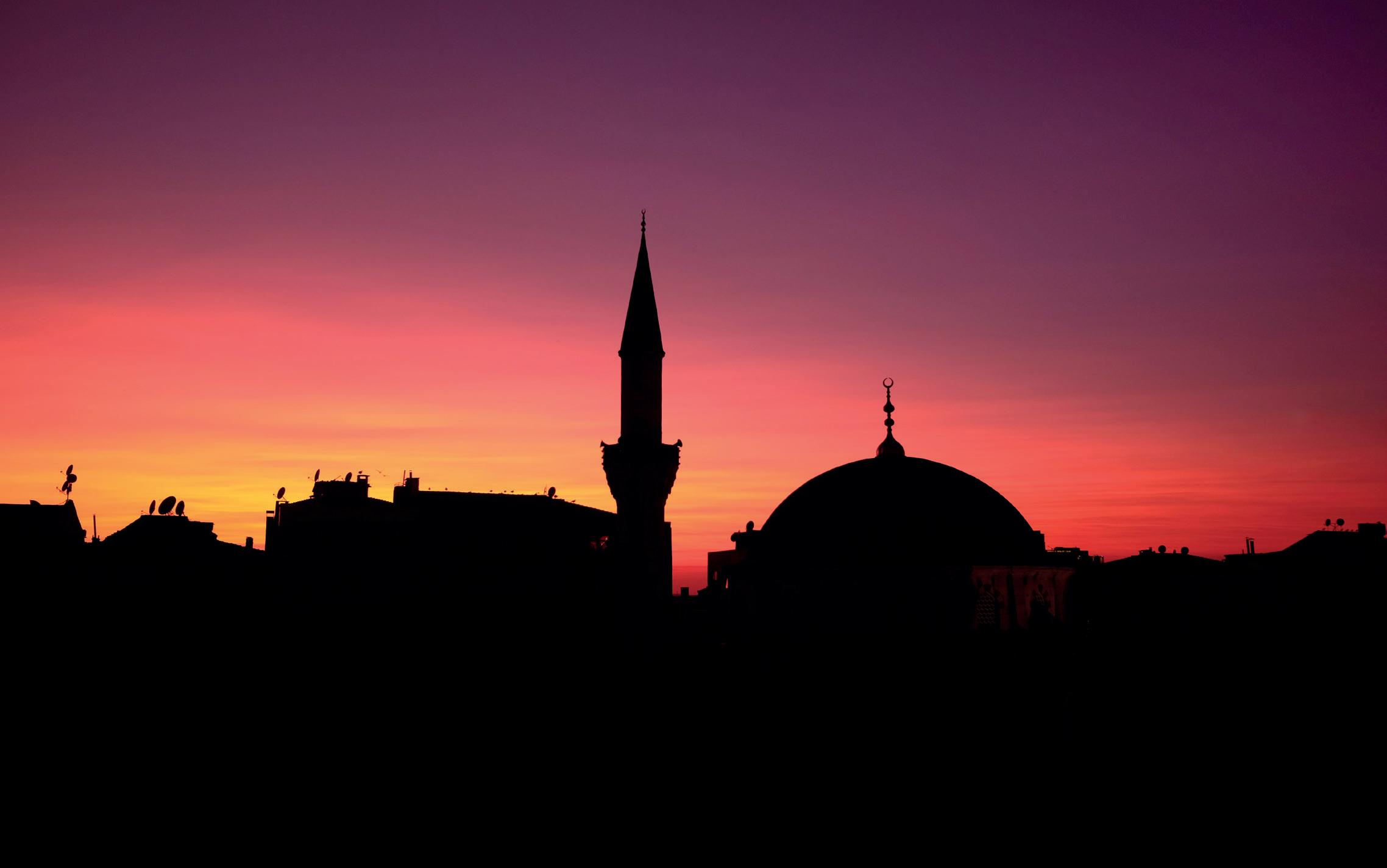
On Sunday, 14 April 2024, the national amila of Majlis Khuddam-ul-Ahmadiyya Canada had the blessed opportunity to meet Hazrat Mirza Masroor Ahmad, Khalifatul Masih Vaa in a mulaqat, held at Islamabad, UK.
At the outset of the mulaqat, Huzooraa conveyed his salaam, and led everyone in silent prayer.
Huzooraa then asked who among them does not understand Urdu. A khadim
of Mauritian origin said he is serving as Muavin Sadr and added that he helps his father in the family business as a profession. Huzooraa then asked if he speaks French, Creole, and English, to which he replied in the affirmative. He expressed that he only understands Urdu slightly and added that the more he serves in the Jamaat, the more he is picking up the language.
Huzooraa then asked, “Do you only understand ‘tumhara kia haal hai?’” To
nurhan | Unsplash
which he replied, “Main theek hun.” This elicited amusement from all those present. Huzooraa then jokingly remarked, “That is the height of your Urdu language.”
Huzooraa then turned to Furqan Bajwa Sahib, Naib Sadr, who said he was from Rabwah, but his family can be traced back to Sialkot. Salman Mangla Sahib, Naib Sadr, reported that he was assigned to the departments related to Tabligh, Tajnid, and Atfal. Ahmad Sahi Sahib, Naib Sadr,
Hadith-e-Rasul – Sayings of the Holy Prophet Muhammadsa
THE WEEKLY
Page
Faraz Tahir: Muslim hero of Sydney attack
6
Page 16 Page 7
Hazrat Ahmad’s claim to be the Promised Messiah and opposition from the religious clergy and press
Page 12
Continued on next page >>
religion
��ﻋ نُذﺄﺘﺳاٰ لَاۤقَ صاۤقَوۡ ��أ ﻦﺑ ﺪعُﺳ ،ﻢﻠﺳوۡ ہِیۡﻠ� ہُلّٰلاٰ ﻰﻠﺻ ہُلّٰلاٰ لَوۡﺳرً ﻰﻠ� ہِﻨﻤﻠ�ﻳ ﺶ�رۡقَ ﻦمَ ءاۤﺴ� هﺪﻨﻋوۡ اۤﻤﻠفِ ،ﻦہۡﺗاٰوۡﺻأ ﺔیۡلۡاۤ� ،ہِنۡ��ﻜﺘﺴ�وۡ ،باۤجُ��اٰ نُرًﺪﺘﺒﻳ ﻦ�� ،��ﻋ نُذﺄﺘﺳاٰ
نُأ ﻖﺣأ ﺖﻨﻛ ہُلّٰلاٰ لَوۡﺳرً اۤﻳ ﺖنۡﺄفِ ،ﻦہۡﺴﻔنۡأ تاٰوۡﺪﻋ ىأ :لَاۤقَ ﻢﺛ ��ہۡﻳ ﻰﻠﺻ ہُلّٰلاٰ لَوۡﺳرً ��ہۡﺗ الَّوۡ ��ﻨﺒہۡﺗأ ﺖنۡأ ،ﻢعُنۡ :ﻦﻠقَ ﻢﻠﺳوۡ ہِیۡﻠ� ہُلّٰلاٰ ہُلّٰلاٰ ﻰﻠﺻ ہُلّٰلاٰ لَوۡﺳرً ﻦمَ ﻆﻠ�أوۡ ﻆفِأ ﻰﻠﺻ ہُلّٰلاٰ لَوۡﺳرً لَاۤقَ ﻢﻠﺳوۡ ہِیۡﻠ� هﺪیۡﺑ ��ﻔنۡ يذَلۡاٰوۡ :ﻢﻠﺳوۡ ہِیۡﻠ� ہُلّٰلاٰ الَّإ اۤ�� اۤ��اۤﺳ ﻂقَ نُاۤﻄیۡﺸلۡاٰ ﻚیۡقُلۡ اۤمَ ﻚ�� ��ﻏ اۤ�� ﻚﻠﺳ
ہِیۡﻠ� ہُلّٰلاٰ ﻰﻠﺻ ہُلّٰلاٰ لَوۡﺳرً ہَلٰ نُذﺄفِ ہِیۡﻠ� ہُلّٰلاٰ ﻰﻠﺻ ہُلّٰلاٰ لَوۡﺳرًوۡ ،ﻢﻠﺳوۡ ہُلّٰلاٰ ﻚ��أ ��ﻋ لَاۤقُفِ ،ﻚﺤﻀﻳ ﻢﻠﺳوۡ ﻦمَ ﺖﺒ�� :لَاۤقَ ہُلّٰلاٰ لَوۡﺳرً اۤﻳ ﻚﻨﺳ ﻦعُ�� اۤﻤﻠفِ ،يﺪﻨﻋ ﻦﻛ ��ا�لۡاٰ ءالَّﺆہٰ :��ﻋ لَاۤقَ باۤجُ��اٰ نُرًﺪﺘﺑاٰ ﻚﺗوۡﺻ
Virtues of Hazrat Umarra
<< Continued from previous page
It is narrated by Hazrat Sa‘d bin Abi Waqqasra that, “Once Umarra asked for leave to see Allah’s Messengersa in whose company there were some Quraishi women who were talking to him and asking him for more financial support, raising their voices. When Umarra asked permission to enter, the women got up quickly, hurrying to screen themselves [out of their awe of his personality]. Upon granting Umarra entry, Allah’s Messengersa was seen smiling. Umarra asked, ‘O Allah’s Messengersa! May Allah always keep you in happiness.’ Allah’s Messengersa responded, ‘I am astonished at these women who were with me. As soon as they heard your voice, they hastened to screen themselves.’ Umarra said, ‘O Allah’s Messengersa! You have more right to be feared by them.’ Then he addressed [those women], saying, ‘O enemies of your own souls! Do you fear me and not Allah’s Messengersa?’ They replied. ‘Yes, for you are a stern and fierce man as compared to Allah’s Messengersa.’ On that Allah’s Messengersa said [to Umarra], ‘By Him in Whose hand my soul rests, Satan never encounters you on a path without taking another route.’”
(Sahih al-Bukhari, Kitab bada’i l-khalq, Bab sifati iblisa wa junudihi, Hadith 3294)
Hazrat Mirza Ghulam Ahmadas, In His Own Words
Fidya for having never fasted before
A person approached the Promised Messiahas and enquired, “I have never observed a fast before; what should I pay as fidya?” The Promised Messiahas responded, “Allah does not impose a burden on any soul beyond its capacity. Pay the fidya for the missed fasts according to your ability, and resolve to observe all future fasts.” (Al Badr, 16 January 1903)
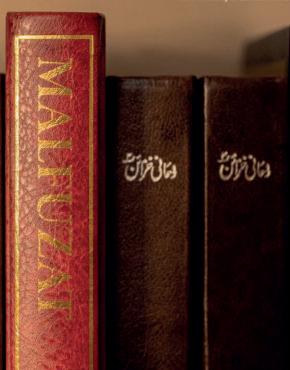
<< Continued from previous page
reported that he was assigned to the departments of Tarbiyat and Tarbiyat Nau-Mubai‘een, Muavin Sadr Translations, Muavin Sadr Wasiyyat, and Muavin Sadr Special Needs.
Aneeq Ahmad Sahib, who had earned his Shahid degree in Pakistan, reported that he is serving as the National Motamid. He reported that there are 87 majalis and further provided a breakdown of the majalis in Canada. In light of the number of majalis sending their reports, Aneeq Ahmad Sahib stated that the average percentage over the last four months was 80%, with some months reaching 100%.
Touseef Ahmad Sahib, Mohtamim Atfal, reported that there are 2576 atfal. Regarding their level of participation, he mentioned that around 1,000 attend classes regularly. Amir Mahmood Rana Sahib, Mohtamim Tarbiyat, reported that there are 7,600 khuddam. Huzooraa asked how many are regular in Jamaat activities. Amir Mahmood Rana Sahib replied that the attendance in the ijtemas is over 50%. He reported further details about the ijtemas and their locations.
It was noted that the practice of the five daily prayers could see increased participation among the members, who were significantly lacking in this regard.
Hearing this, Huzooraa said that the Promised Messiahas said, “A religion in which there is no worship, is no religion.” During the time of the Holy Prophetsa, some asked to be excused from Salat. The Holy Prophetsa replied that a religion without worship is not truly a religion.
“The training of a khuddam involves ensuring that 100% of them are accustomed to prayer.” If they cannot pray in congregation at the mosque, they should do so at home, at the very least. It is for this reason that certain khuddam become associated with other negative behaviours. Herein lies the challenge of tarbiyat Huzooraa explained that if this aspect is not tended to, then all of them will be wasted.
Huzooraa then told them to make a tarbiyat plan. Huzooraa said that this task cannot be accomplished alone. “A team should be formed in all areas.” He added that they should utilise good khuddam to also help in the tarbiyat of the other khuddam
Nabil Mirza Sahib, Mohtamim
Additional Tarbiyat Baraye Rishta Nata, reported that sessions were conducted with parents in all regions to discuss the challenges faced by khuddam
Huzooraa addressed, emphasising the need for a coordinated plan involving both Lajna and Ansar regarding tarbiyat He stressed the importance of everyone working together.
After this, Huzooraa discussed various budgetary matters with Mubashar Ahmad Sahib, Mohtamim Maal, and Muhammad Ansar Bajwa Sahib, Additional Mohtamim Maal.
Upon hearing that 73% of khuddam give chanda, Huzooraa drew a comparison between the chanda and the significantly lower percentage of those who offer salat, as per the collected data. He emphasised the need to prioritise salat, stating that if khuddam focused on offering salat, the chanda would naturally follow. Huzooraa said they should devise a plan to establish a team dedicated to encouraging khuddam to offer salat with the same fervour as they are encouraged to give chanda
Adnan Mangla Sahib, Mohtamim Ishaat, reported that this year’s goal is to publish 12 editions of An-Nida. And he added that they have published five so far. Speaking with Muhammad Salman Majid Sahib, Mohtamim Sehat-e-Jismani, Huzooraa asked him what games he plays. He replied that he plays basketball and volleyball. Upon hearing this, Huzooraa asked him to stand to see his height. Huzooraa then asked if he plays regularly, to which he replied affirmatively, adding that he does not play during Ramadan but usually plays twice a week. Huzooraa then jokingly remarked, “I see. So all this weight you gained during Ramadan?” Huzooraa then asked how many khuddam exercise regularly. Muhammad Salman Majid Sahib replied that 1,503 were regular.
Zuhaib Ahmad Sahib, Mohtamim Khidmat-e-Khalq, reported that they funded charities, conducted 25 charity runs, and collected $400,000. He mentioned that they also organise charity walks and added that last year they held a charity dinner, to which many contributed.
Muhammad Ansar Sahib, Mohtamim Muqami, reported that there are 1533 khuddam in the Muqami area. Regarding khuddam who are in need of tarbiyat,
Huzooraa asked if they are implementing any tarbiyat plans to safeguard them and others around them. Huzooraa said that to safeguard the youth from the ills of society, “a comprehensive plan should be made.”
Farukh Tahir Sahib, Muavin Sadr Waqfe-Nau, reported that there are a total of 2456 boys, out of which around 800-900 are khuddam. Alluding to the Waqf-e-Nau atfal, Huzooraa emphasised the importance of safeguarding them. Huzooraa further mentioned that he gave a sermon in Canada in which he highlighted the essence of being a Waqf-e-Nau. Referring to that, Huzooraa suggested extracting points and circulating reminders from it. “Instil within their hearts why they are waqifeen-e-nau and what its essence is.”
Shuaib Sadi Sahib, Muavin Sadr MKA Studios, reported that they have their own studios equipped with a control room, and an editing room. He added that all recorded content is then uploaded to their YouTube channel. Hearing this, Huzooraa said: “You have quite a number of khuddam members who have the potential to make some good programmes. So, you should try to make your own programmes of MTA standard.”
Next, Abrar Ahmad Kahlon Sahib, Muavin Sadr Ziafat, had the chance to speak with Huzooraa. Then, Waqas Naveed Sahib, Muavin Sadr Properties and Inventory, reported that Majlis Khuddam-ulAhmadiyya Canada has four properties, all located in Toronto. Basharat Ahmad Sahib, Chairman of Mahmood Institute, reported that Majlis Khuddam-ul-Ahmadiyya launched an online platform named Mahmood Institute, where they record religious knowledge courses. Huzooraa asked how many khuddam are benefiting from this, to which Basharat Ahmad Sahib replied that this is their first year. He said that in the past four months, they recorded 12 Tarteel-ul-Quran courses, 11 Tarjamatul Quran courses, and three basic Arabic lessons. Following this, Tahir Mahmood Sahib, Chairman of Husn-e-Biyan, had the chance to speak with Huzooraa. Next, Hassan Sahid Sahib, Chairman Press & Media, had the chance to report to Huzooraa
Speaking with Farhan Iqbal Sahib, Chairman of Majlis Ansar Sultan-ul-Qalam, Huzooraa asked if he is a Nasir or a khadim, to which he replied that he still had one year left as a khadim. He reported that they have
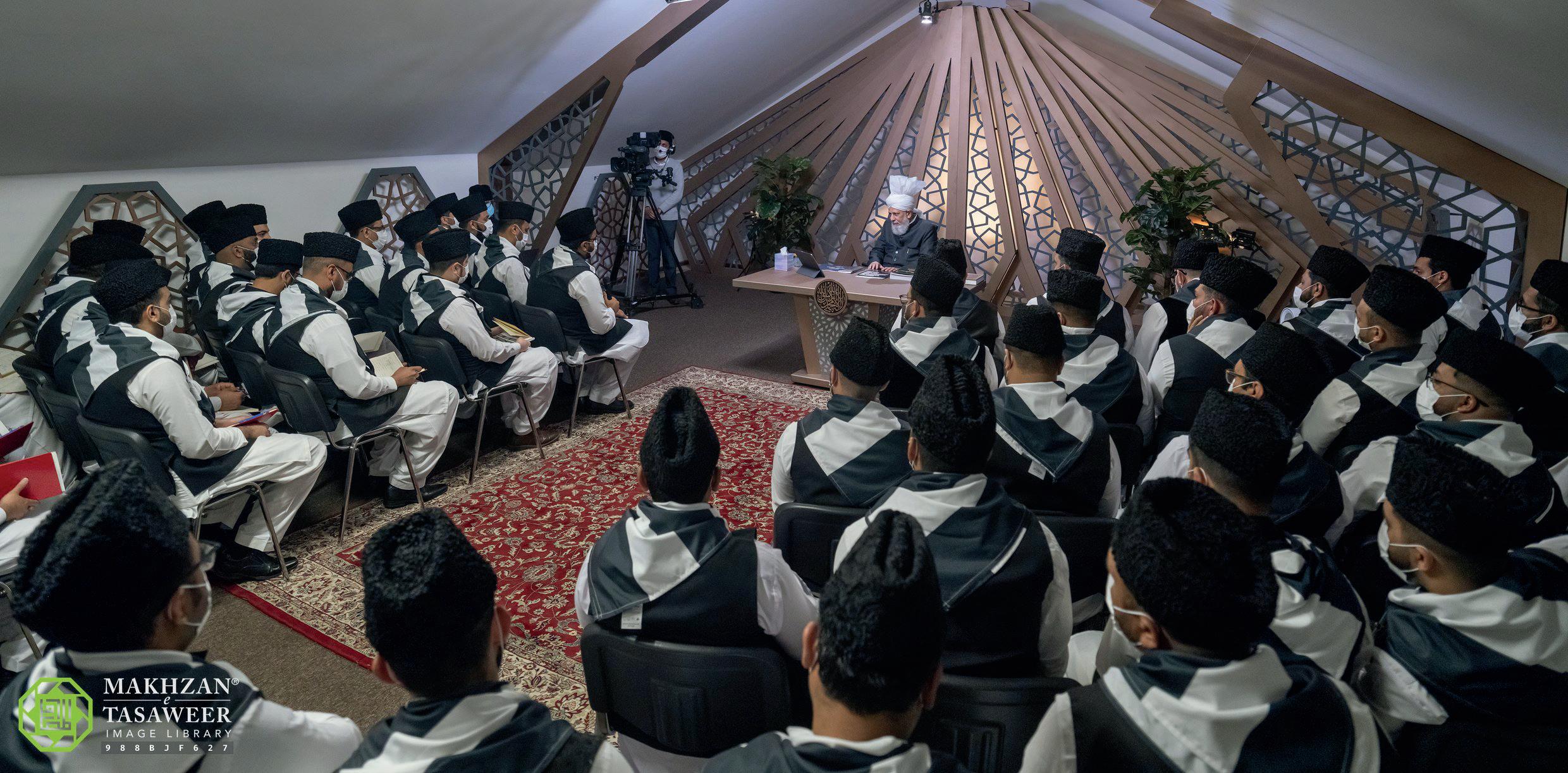
Friday 19 April 2024 | AL HAKAM 2
Photo courtesy of Suhaib Ahmad
a total of 500 khuddam on their mailing list and added that around 25-30 actively wrote articles. Huzooraa said, “Encourage those who are not active to become active.”
Mansoor Azim Sahib, Muavin Sadr Wasiyyat, reported that 1645 khuddam are musis. Huzooraa remarked that there are more musis than those who offer salat, questioning the purpose of being a musi in such a scenario. Concerning musis, Huzooraa emphasised encouraging them to be regular in prayer and regular in reading the Holy Quran. “This is also the duty of the Wasiyyat Department.”
Huzooraa emphasised that one cannot simply expect forgiveness in the afterlife by only giving one-tenth of their income. Alluding to the total number of musis, Huzooraa said that there should be at least 1600 individuals who are regular in offering their salat. Huzooraa also addressed the qaideen, urging them to take note of this and make efforts accordingly.
Next, Zaki Ahmad Sahib, Regional Qaid for Western Calgary, had the opportunity to speak with Huzooraa. He reported that his duty consists of drawing people’s attention towards offering prayers in congregation. Huzooraa said, “Salat is the basic thing. At least 100% should be regular in offering their five daily prayers.” While addressing the regional qaideen, Huzooraa emphasised the importance of instilling the significance of salat and making them active in Jamaatrelated activities. Huzooraa also inquired about the total number of khuddam in their respective regions.
Addressing Touseef Ahmad Rehan Sahib, Chairman of Social Media, Huzooraa said to spread passages related to tarbiyat also. Next, Salman Rehan Sahib, Muavin Sadr Charity Walks, had the chance to present his report. Huzooraa asked him if he also participated in walks and said, “You should also participate. If you lead by example, others will follow suit.”
Khizr Kareem Sahib, Muavin Sadr Special Needs, reported that there are 59 khuddam and atfal with special needs. He mentioned that some atfal attend special schools and added that khuddam are at university levels and they have their own special needs. Following this, Sarmad Naveed Sahib, Muavin Sadr for Translations, had the opportunity to speak with Huzooraa. Huzooraa also spoke with Ehsan Mahmood Sahib, Muavin Sadr for National Majlis-e-Amila Visits and Ijtema, and Haseeb Ahmad Sahib, Muavin Sadr IT.
Speaking with Musawir Ahmad Khan Sahib, Mohtamim Tahrik-e-Jadid, Huzooraa asked him how many khuddam participated in this scheme. He reported that last year, 5,400 khuddam participated. Upon hearing this, Huzooraa remarked, “That’s 75%.” He added that at least this many should also be offering salat
Zargham Nasir Sahib, Mohtamim Sanat-o-Tijarat, reported that this year they are focusing on courses to improve the skills of the khuddam. While speaking with the Mohtamim Tarbiyat Nau-Mubai‘een, Huzooraa asked how many there are, to which he replied that there are 116 naumubai‘een. Huzooraa explained that they should involve them in their activities and integrate them into the mainstream. Huzooraa added that after three years, their training should have reached a level where they can join the mainstream. Huzooraa also
Prayers for the world, Palestine and Yemeni Ahmadis
During his Friday sermon, delivered on 12 April 2024, Hazrat Mirza Masroor Ahmad, Khalifatul Masih Vaa said:
“Continue to pray for the situation in Palestine and around the world. Circumstances are deteriorating progressively. There is a fear that Iran might also be attacked, leading to a further escalation of the conflict. May Allah Almighty have mercy.
“There has also been news that some Ahmadi prisoners of faith in Yemen have been released; in fact, the majority were freed just yesterday. Pray for the release of the few who remain. May Allah Almighty clear the hearts of those in authority regarding them, particularly for a lady who is also the Lajna president and is currently detained. May Allah Almighty facilitate her prompt release.
[Amin]”
emphasised the importance of salat Ijaz Chattha Sahib, Mohtamim Tajnid, reported that there are 7403 khuddam and added that this data was collected by them door-to-door. Mansoor Ahmad Sahib, Muhasib, was next to present his report and discussed budgetary matters.
Mir Nasir Syed Sahib, Mohtamim Talim, reported that this year’s reading for khuddam consists of excerpts from The Essence of Islam, as per Huzoor’saa guidance. Jariullah Adnan Sahib, Mohtamim Tabligh, reported that this year, 25 individuals joined Islam Ahmadiyyat. He reported that out of the 25, 21 had converted after reading literature and through the Jamaat.
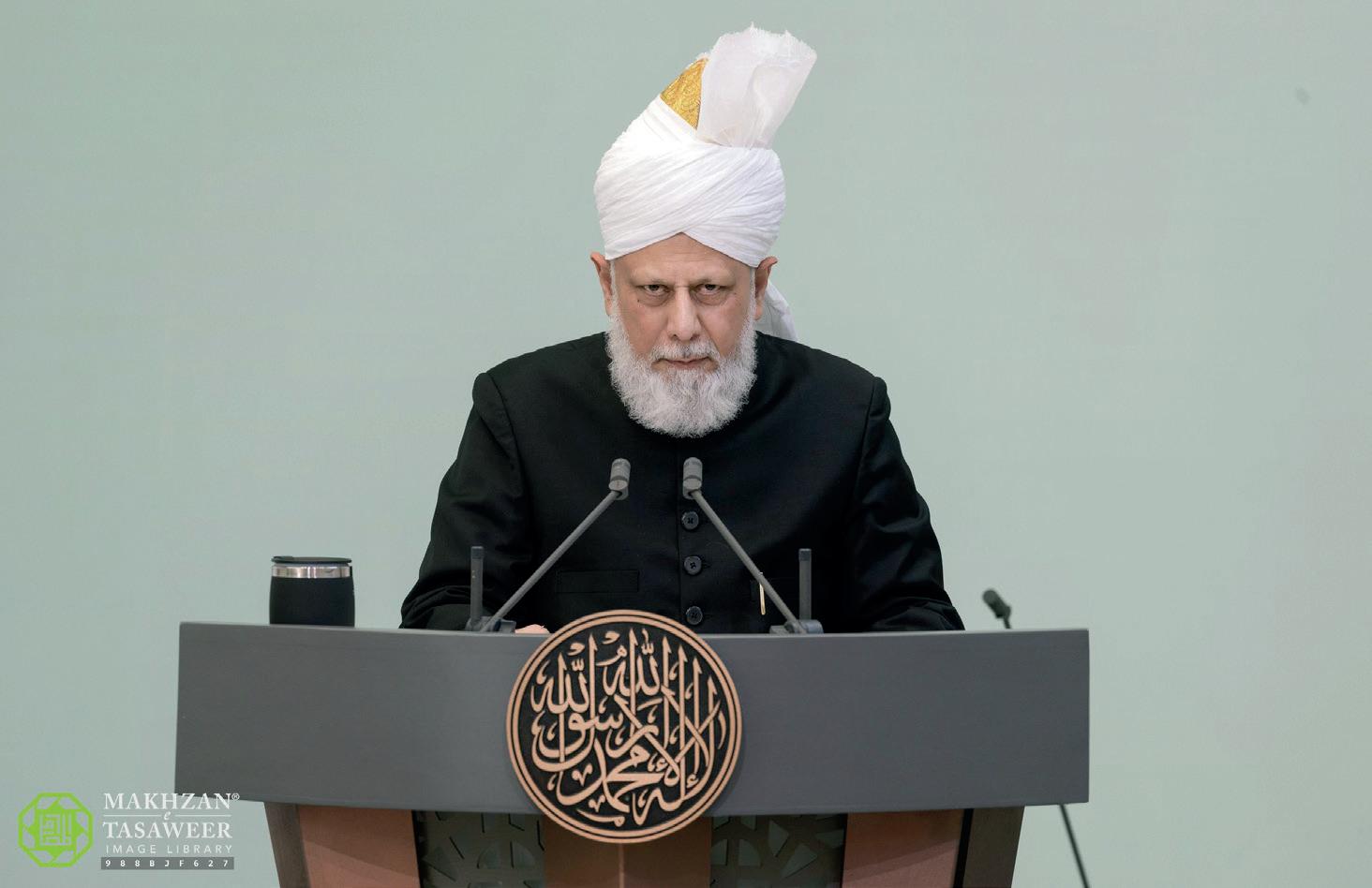
Zishan Iqbal Sahib, Mohtamim Umure-Tulaba, reported that there are 374 university-going students out of 2,014 students. Additionally, he mentioned that there are also some who are pursuing master’s degrees.
Speaking with Sultan Mubashar Sahib, Mohtamim Umumi, Huzooraa emphasised that khuddam should be performing duties to safeguard mosques. Khalid Hassan Sahib, Mohtamim Waqar-e-Amal, reported that Waqar-e-Amal sessions were held in mosques and prayer centres. Then, Hamid Basil Ahmad Sahib, Abdul Noor Abid Sahib, Ayaz Warraich Sahib, Sabahul Zafar Sahib, and Iftekhar Ahmad Sahib all reported that
they are serving as Naib Sadran. Huzooraa then turned towards Sadr Sahib and expressed that he had gained the relevant information he needed and had guided them in various matters. Huzooraa mentioned that the guidance he had provided throughout the meeting, if implemented, would suffice. Huzooraa once again reiterated the importance of encouraging the khuddam to offer salat
Thereafter, Hazrat Amirul Momineenaa extended salaam to everyone and the meeting came to an end.
(Report prepared by Al Hakam)
Jalsa Yaum-e-Musleh-e-Maud held in Vaughan and Brampton, Canada
Syed
Mukarram Nazeer Canada Correspondent
To mark the Yaum-e-Musleh-e-Maud, jalsas were held by Jamaat-e-Ahmadiyya Canada across the country.
The Vaughan Imarat held its Jalsa on 20 February 2024, at the Baitul Islam Mosque. The session was presided over by the Naib Amir of Canada..
The proceedings commenced with the recitation from the Holy Quran, with its translations in English and Urdu, followed by a poem with an English translation. Then, the wording of the prophecy of Musleh-eMaud was read out in Urdu and its English translation.
The missionary of the Vaughan Imarat delivered the first speech on Tahrik-e-Jadid and highlighted many achievements of this scheme.
A Kahoot quiz was conducted, in which
close to 225 attendees participated.
The second speech was delivered by Hadi Ali Chaudhry Sahib on “Family Life and Tarbiyat-e-Aulad”, and he narrated incidents from the life of Hazrat Musleh-eMaudra highlighting how he did tarbiyat of his children.
In his concluding address, the Naib Amir quoted from a sermon of Hazrat Amirul Momineenaa the reason for celebrating Jalsa Yaum-e-Musleh-e-Maud. He then led everyone in silent prayer, followed by dinner. The total attendance was around 1,100.
The Brampton Imarat also held a jalsa to mark this occasion, at the Mubarak Mosque. The jalsa commenced with the recitation from the Holy Quran with its English and Urdu translations, followed by an Urdu poem, and a speech by a missionary of Brampton East Imarat, Asfund Suleman Sahib, about the significance of Jalsa Yaum-
e-Musleh-e-Maud. The wording of the prophecy of Musleh-e-Maud was presented in both Urdu and English.
The missionary of Brampton East Imarat, Asif Ahmed Arif Sahib, highlighted Tahrik-e-Jadid and its achievements. A video presentation by MTA International provided a visual narrative of the life and contributions of Hazrat Musleh-e-Maudra
The event culminated with the concluding address by Amir Jamaat-eAhmadiyya Canada, Lal Khan Malik Sahib, who emphasised the fulfilment of the prophecy as the grand spiritual revolution and highlighted the never-ending efforts for the revival of Islam by Hazrat Muslehe-Maudra
A question-and-answer session followed, enabling participants to seek clarification and deepen their understanding further.
A silent prayer brought the session to an end. The total attendance was 513, with all being served dinner.
3 AL HAKAM | Friday 19 April 2024
This Week in History
A glimpse into the rich history of the Ahmadiyya Muslim Jamaat
19 April 1931: On this day, Hazrat Musleh-e-Maudra departed from Qadian for a visit to Mussoorie, Dehradun and Delhi, where he stayed for around four weeks. During this visit, Huzoorra delivered various lectures, granted audience to dignitaries and visited the tomb of Hazrat Nizamuddin Auliyarh.
For more details, see “A call for interfaith harmony and tabligh: Hazrat Musleh-e-Maud’s visit to Mussoorie, Dehradun and Delhi, 1931”, at alhakam.org (2 June 2023, p. 8)
19 April 1964: On this day, the Waqf-e-Jadid headquarters were inaugurated in Rabwah. The foundation was laid on 29 December 1962.
For more details, see “A chronology of Waqf-e-Jadid’s early years (1957-1965)”, at alhakam.org (25 December 2020, p. 12)
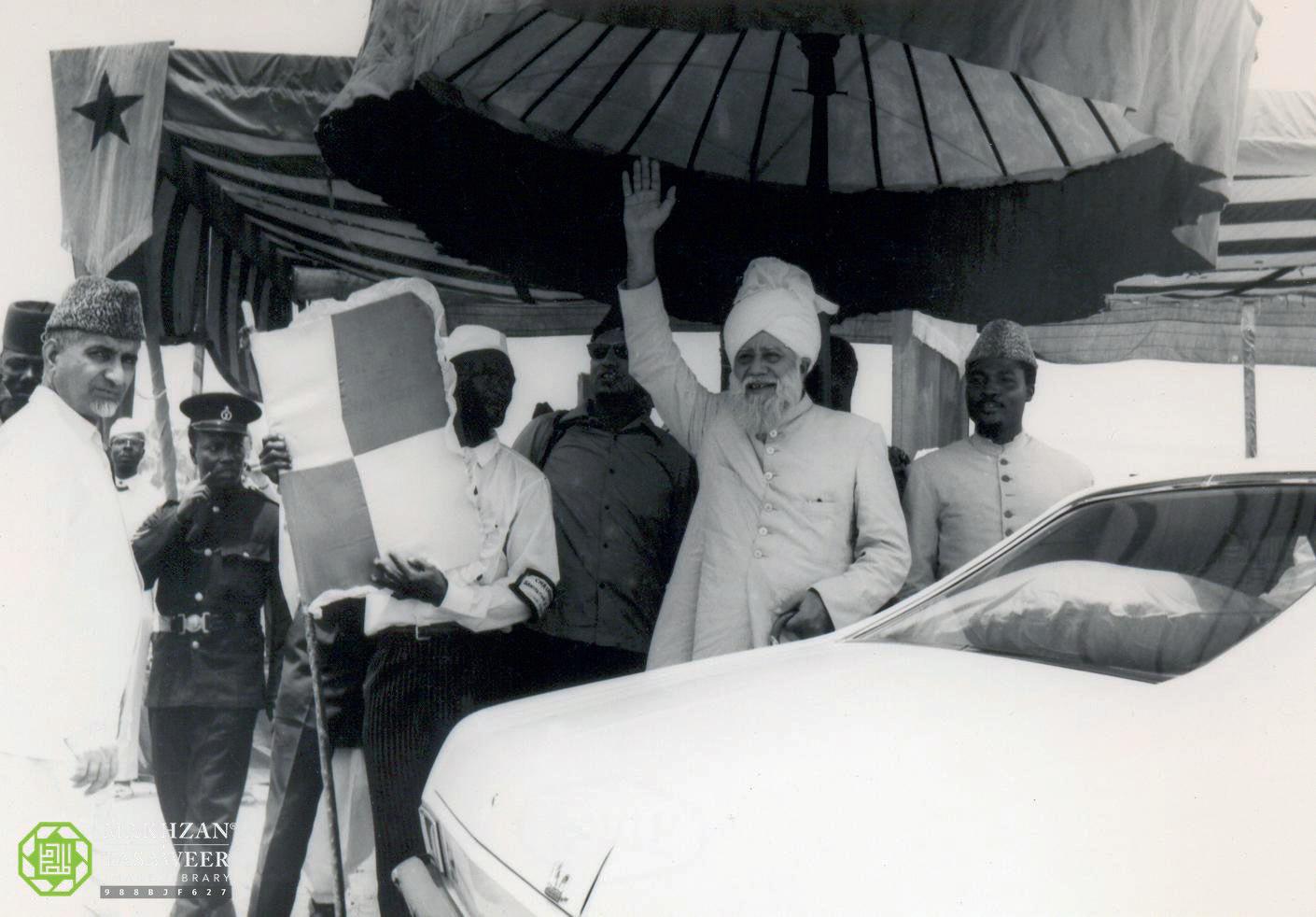
21 April 1923: On this day, Hazrat Musleh-e-Maudra issued detailed guidelines for the missionaries who were serving in the Malkana area, in which Huzoorra instructed them to pay special attention towards prayers (du‘a), and the recitation of

20 April 1983: On this day, Hazrat Khalifatul Masih IVrh encouraged the Jamaat Canada to collect six million dollars to build new mission houses and mosques in different cities of Canada. (Silsila Ahmadiyya, Vol. 4, p. 822)
20 April 1984: On this day, Hazrat Khalifatul Masih IVrh delivered his Friday Sermon in the Ahmadiyya mosque in Islamabad, Pakistan. It was his last sermon in Pakistan before migrating to London. (Khutbat-eTahir, Vol. 3, p. 215)
22 April 1952: On this day, the funeral prayer of Hazrat Amma 19
22 April 1921: On this day, Chaudhry Fateh Muhammad Sayal, the missionary in England, was invited for a lecture by a Londonbased society aiming to unite East and West. There, he had the opportunity to present the spiritual benefits of Islam to the people.
For more details, see “100 Years Ago… – A new convert, lectures in the UK and meeting with Dr Rabindranath Tagore”, at alhakam. org (4 June 2021, p. 16 )
Surah al-Fatihah and durood sharif. Moreover, he advised them to learn the local language of that area for effective preaching, and to learn the answers to the allegations raised against Islam by the Arya Samaj.
For more details, see “Hazrat Musleh-e-Maud’s response to the Shuddhi movement and the Jamaat’s relentless services for Islam” at alhakam.org (17 December 2021, p. 18).
21 April 2008: On this day, during his tour of Ghana, Hazrat Khalifatul Masih Vaa attended a reception, held in his honour at the Central Mission. The event was also attended by His Excellency, Alhaj Aliu Mahama the Vice President of the Republic of Ghana.
The evening concluded with a brief address by Huzooraa in which he thanked His Excellency for having been a long and loyal friend of the Jamaat.
He said, “I remember almost five years ago, His Excellency visited the United Kingdom and was anxious to meet with me and so we met at the Fazl Mosque in London. Normally, non-Ahmadi Muslims never like to offer prayers behind Ahmadis, but the Vice President did offer prayers in our mosque. I hope that, as he has done in the past, he continues to show such kindness that we cherish a great deal.” (The Khilafat Centenary Tour of West Africa, pp. 29-30)
Janra was led by Hazrat Musleh-eMaudra in Rabwah, Pakistan. She sadly passed away in Rabwah on the night of 20 April 1952 at the age of 86.
For more details, see: “Hazrat Amma Jan: Syeda Nusrat Jahan Begum” at alhakam.org (16 June 2023, pp. 16-17)
22 April 2003: On this day, following the Maghrib and Isha prayers, Majlis Intikhab-e-Khilafat convened at the Fazl Mosque, London, where Hazrat Sahibzada Mirza Masroor Ahmad was elected as Khalifatul Masih V. On the
occasion, 11,000 attendees at the venue and Ahmadis worldwide had the honour of pledging allegiance through MTA. The following day, Hazrat Khalifatul Masih V, may Allah be his Helper, delivered an address in Islamabad around 2:30 pm.
After the address, he led the funeral prayer of Hazrat Khalifatul Masih IVrh, followed by the burial at Islamabad. He led the silent prayer at the grave around 4:30 pm. The entire proceedings were broadcast live on MTA. (Silsila Ahmadiyya, Vol. 4, p. 913)
Friday 19 April 2024 | AL HAKAM 4
Hazrat Khalifatul Masih III’srh arrival in Techiman, Ghana, 22 April 1970
- 20
22
April
April 21 April
25 April 1966: The Foreign Minister of India, Sardar Soran Singh, visited Qadian on this day. He was given a grand welcome in the Ahmadiyya Mohalla, a reception was held in his honour and a gift of the Holy Quran was presented. India’s leading newspapers like The Tribune, The Times of India and The Indian Express, published detailed news about this visit. (Tarikh-eAhmadiyyat, Vol. 23, p. 620)
25 April 1971: On this day, the official inauguration ceremony of the Nasir Mosque was held in Suriname. For more details see: “50 years of Nasir Mosque, Suriname and its relationship with Khilafat” at alhakam.org (11 June 2021, pp. 15-16)
25 April 2006: On this day, Hazrat Mirza Masroor Ahmad, Khalifatul Masih Vaa arrived at Nadi Airport during his tour of Fiji. He was also interviewed by a correspondent from the national television. (Al Fazl International, 9 June 2006, pp. 1-2)

23 April 1951: On this day, the Punjab’s Rehabilitation Minister, Sheikh Fazal Ilahi Pracha, visited Rabwah and had a meeting with Hazrat Musleh-e-Maudra. On 25 April, The Civil and Military Gazette wrote:
“The Punjab Rehabilitation Minister, Sheikh Fazal Ilahi, who is touring Jhang, Sargodha and Gujrat districts to gather first-hand impressions about the rehabilitation and land settlement work in the province, arrived in Sargodha on Monday. […] On his way to Sargodha, the Minister paid a visit to the Ahmadiya colony of Rabwa where he met Mirza Bashiruddin
Mahmud[ra], head of the Ahmadiya community, foreign students at the colony and leaders of the community.”
For more details, see “75 years of Rabwah: A glimpse into its early years”, at alhakam.org (22 September 2023, p. 9)
24 April 1942: Syed Sulaiman Nadwi, a distinguished Islamic scholar and historian, proposed to the government during his time that a Sheikh-ulIslam be appointed with a salaried position to address the deteriorating conditions facing Muslims. However, his proposal faced substantial resistance, as reflected in a critical editorial in the Al Fazl newspaper.
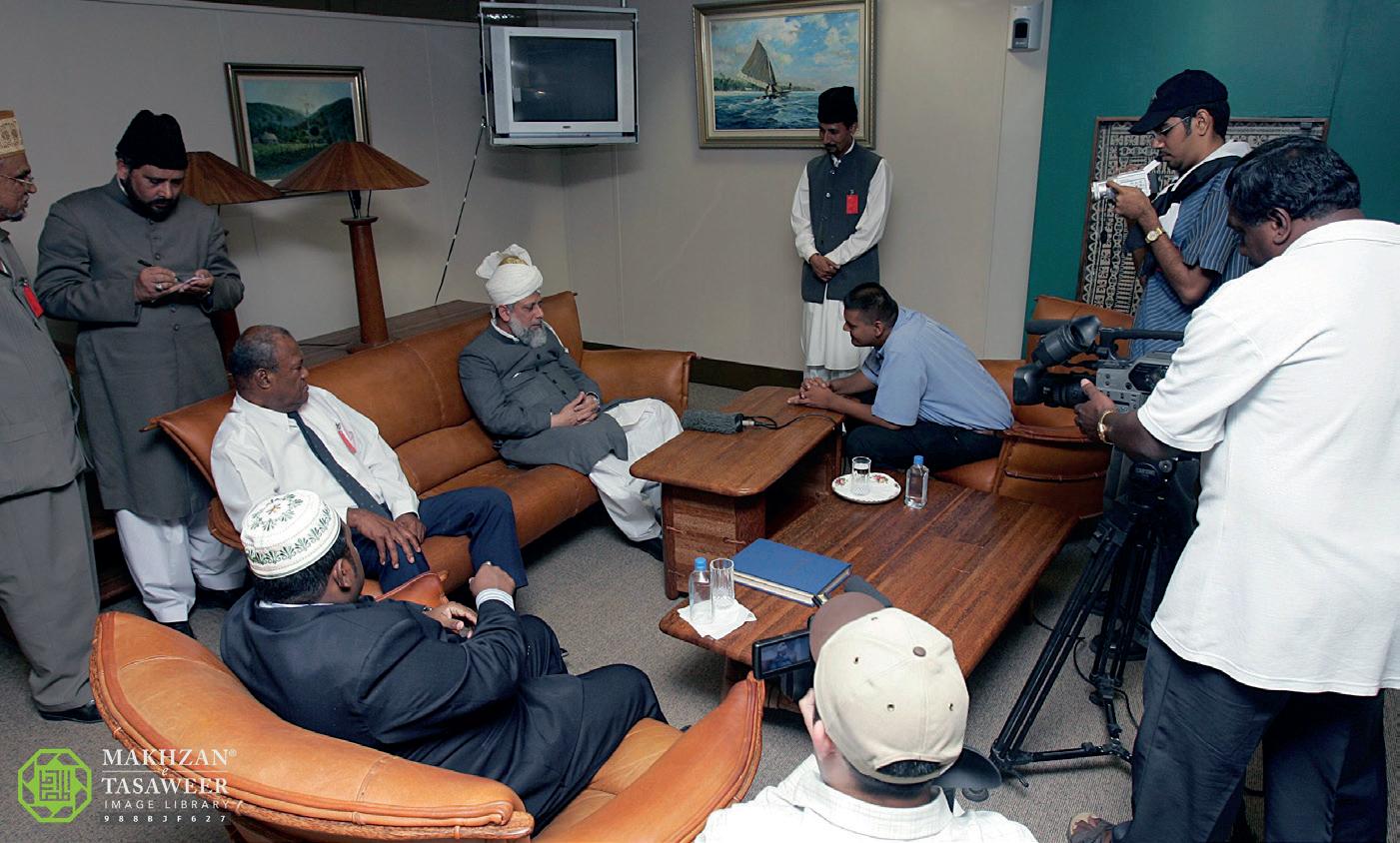
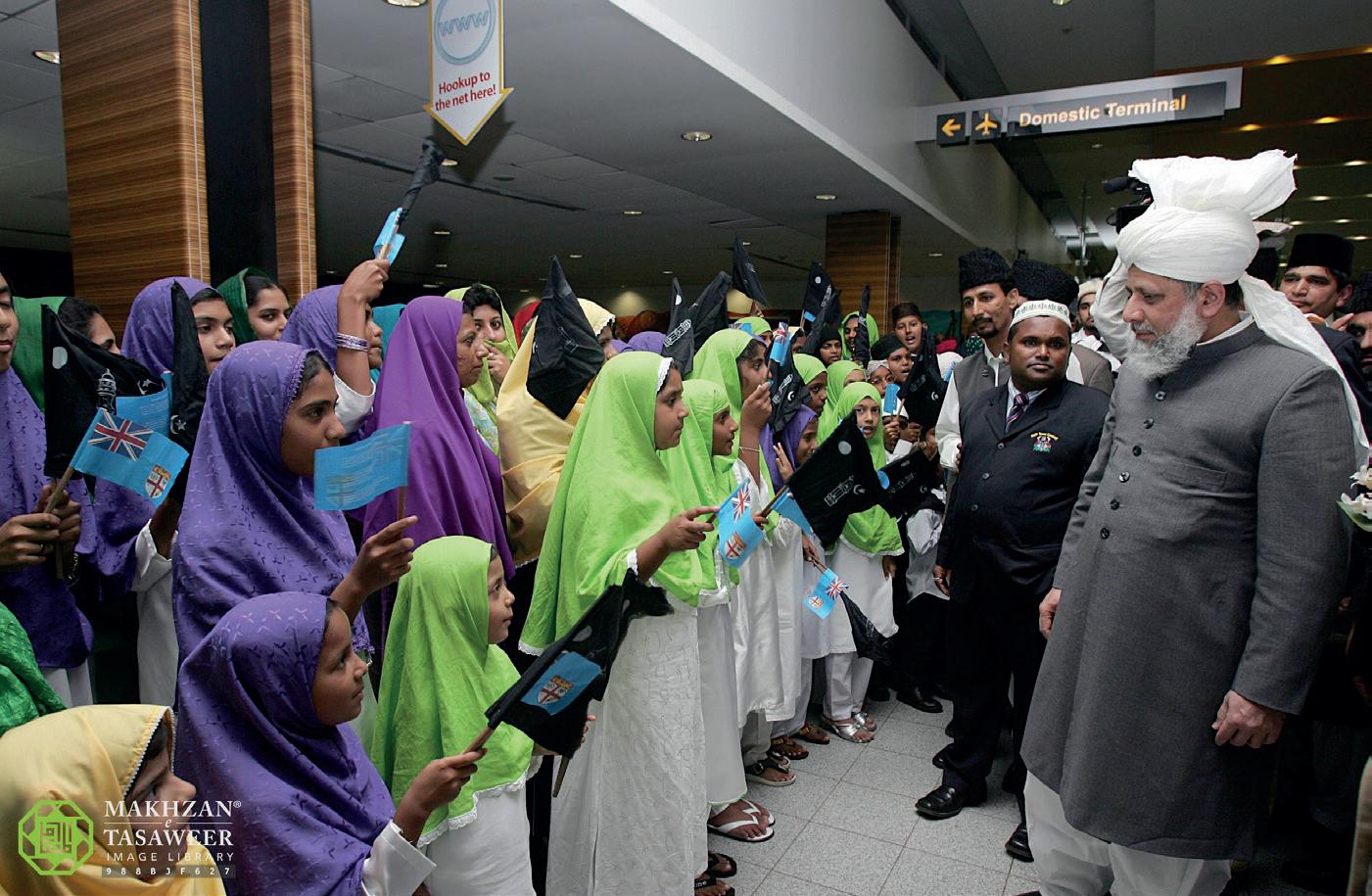
The editor deemed the proposal unreasonable and impractical and wrote, “If only Muslims would implore Allah the Almighty, with sincere hearts, instead of seeking to have a ‘Sheikh-ul-Islam’ appointed by the British government, to grace them with the ability to cling to the mantle of such a Reformer [Musleh] whom He has ordained for them and that He may open their hearts towards his obedience so that they may attain His nearness and Your pleasure.” (Al Fazl, 24 April 1942, p. 1)
24 April 1970: On this day, Hazrat Khalifatul Masih IIIrh addressed a press conference in Accra, Ghana, and then went to Saltpond, where he
visited the mosque and mission house. Around 12,000 Ahmadis were present there to see their beloved Imam. The attendees also included various dignitaries, such as the paramount chiefs. Huzoorrh led the Jumuah prayer and, after that, delivered another address to the members who had gathered there. (Tarikh-e-Ahmadiyyat, Vol. 26, p. 51)
24 April 1994: On this day, Hazrat Khalifatul Masih IVrh had a meeting with Bosnian Ahmadis. For more details, see: “Khilafat-e-Ahmadiyya: Standing by oppressed Bosnian Muslims” at alhakam.org (6 June 2023, p. 15)
5 AL HAKAM | Friday 19 April 2024 19 - 25 April 25
23 - 24
April
April
Fiji TV interviewing Hazrat Khalifatul Masih V Hazrat Khalifatul Masih V upon arrival in Fiji, 2006
Faraz Tahir: Muslim hero of Sydney attack
Asif M Basit London
Terrorist attack! A hot cake for news channels these days. The terrorist turns out to be a Muslim, and the cake sells more and quicker. And when one happens to be living in an age where anyone and everyone with a smartphone is a broadcaster, such incidents rock social media, and the buzz (or borderline excitement, if you like) can be felt across the globe.
Oh, the irony! This terrorist often turns out to be a Muslim; or an “Islamist”, as the media likes to label them.
Muslims feel very lucky if, in an incident, the terrorist turns out to be a nonMuslim. In that case, no one really bothers about the terrorist’s religion; they could be a Christian, a Hindu or a Jew or whatever, but who cares? Their faith is only a matter of concern if they happen to be Muslims. Why waste any chance to defame Islam?
The recent act of terrorism in Sydney was carried out by an individual, shot dead by police after he killed six innocent persons in the Westfield shopping centre at Bondi Junction.
The first query that arose was whether the terrorist was a Muslim. It so happened that he was not. The questions that followed, common sense would suggest, should have been about guessing what other faith he followed. But as long as he was not a Muslim, no one really cared about his faith or religious affiliation.
Not that we are suggesting that this should have been the case; we only mean that this should not be the case at all. Let people’s faith remain their personal affair. An act of terror cannot be carried out in the name of any religion, as no religion approves of terrorism.
Our hearts go out for all those who were killed in this brutal attack, and for their families. Also for those who witnessed such insanity before their eyes; no one should have to even see an act of bloodshed.
So, these lines are to express our heartfelt condolences for the innocent six people killed and sympathy for those who got injured and remain in hospitals.
Of the six who died, I only knew one: Faraz Tahir. When I say “knew”, I mean only got to know him when he was identified by the Australian authorities. But I insist on saying that I “knew” him because I can relate personally to this gentleman.
Like myself, he was an Ahmadi Muslim. Like myself, he had fled persecution in his homeland, Pakistan, and sought political asylum in a foreign land. I had faced threats of all kinds from my employer in Pakistan and had fled to save my life and the lives of my wife and two-year-old son. Faraz must have also fled similar circumstances in
Pakistan and fled to Australia to save his life.
Then, like myself, Faraz must have settled and been able to profess, proclaim and practise his faith without the fear of being killed for doing so.
The word “faraz” means height, and Faraz touched a height that gives demonstrative evidence of what the Ahmadiyya diaspora, in the face of intense persecution in Pakistan, is all about.
It is not only about saving your life out of the self-preservation instinct, but also not out of the will to live longer and cherish worldly joys. This migration is in line with the sunnah of the Holy Prophetsa of Islam: to be able to live in a land where freedom of faith allows one to practice their faith without fear.
Faraz was settled in Australia and doing well. Life must have become as normal as it can be when one is uprooted from their homeland and has to create their world anew in a foreign land.
He was working as a security official in the shopping centre and happened to be on duty on the ill-fated day.
The vicious attack happened. Faraz Tahir, who had fled to save his life for his faith, leaped forward to save people from the insanity of the terrorist. In doing so, he
must have known that he could well lose his own life – the life that he had aimed to save when it was in danger at the hands of religious extremists. He had saved it for his faith; to be able to proclaim that he was a Muslim; to declare that his faith is Islam and he cannot renounce it under any pressure.
In throwing himself into the danger of losing his life, he acted as a true Muslim. One of Islam’s flagship teachings is that saving one human is as if you saved the whole of humanity. (Holy Quran, Surah alMa’idah, Ch.5: V.33) It was Faraz’s moment to prove that a Muslim not only believes so, but practically does so even at the cost of his own life.
So, as a refugee myself, and on behalf of hundreds of thousands of Pakistani Ahmadis who have left their homeland with heavy hearts, I salute Faraz Tahir.
Dear Faraz, you proved that it is not only our lives that we care for when we flee persecution. We do so to uphold our affiliation with Islam and to be able to practise every teaching of Islam.
But where the majority of us are only verbally able to say so, you proved through your practice that we save our lives only to be able to lay it for faith and humanity, at the drop of a hat.

In the path towards the embrace of death, What matters not is mortal breath; What matters more is dignity and pride, and head held high in this brave stride. (Faiz Ahmad Faiz, Nuskha Hai Wafa [1986], p. 259)
‘Discover True Islam Week’ held in Thorpe Village, Middlesex, UK
Mujeeb Ahmed Mirza Project Secretary
In a heartening display of community and faith, the Ahmadiyya Muslim Community UK orchestrated the “Discover True Islam Week” in Thorpe Village from 26 February to 3 March 2024. This initiative, part of a nationwide effort to educate and engage with predominantly non-Muslim communities, saw a flurry of activities aimed at fostering understanding and peace.
Over the week, residents of Thorpe were invited to partake in various events meticulously organised by the Middlesex Region under the guidance of the Regional Amir. The campaign kicked off with widespread leaflet distribution, with thousands of leaflets disseminated to introduce the locals to the week’s events and the fundamental teachings of Islam.
The focal point of the week was the exhibition held at Thorpe Community Hall, themed “Pathway to Peace.” Managed by the Hounslow South Jamaat, the exhibition served as a hub for dialogue and learning,
complemented by daily setups by various local jamaats
Coffee mornings and a significant interfaith conference provided opportunities for in-depth conversations and strengthened community ties. The conference, held on the final Sunday, was a gathering that highlighted the communal harmony promoted by Jamaat-e-Ahmadiyya through various activities.
Parallel to these, the Majlis Khuddam-ulAhmadiyya took charge of charitable efforts, raising over £400 for the Runnymede Foodbank.
Efforts to reach a wider audience included engagements with local schools and media outlets, ensuring the message of peace and understanding echoed beyond the immediate vicinity of the village.
The success of the
week was evident not only in the activities themselves but also in the participation and feedback from the community. One of the neighbours gave the following feedback:
“It was really nice to be welcomed here [...] the message about peace is very apt at this moment in time. One thing which has stuck with us is the point made by the keynote speaker about every drop making a difference. [...]”
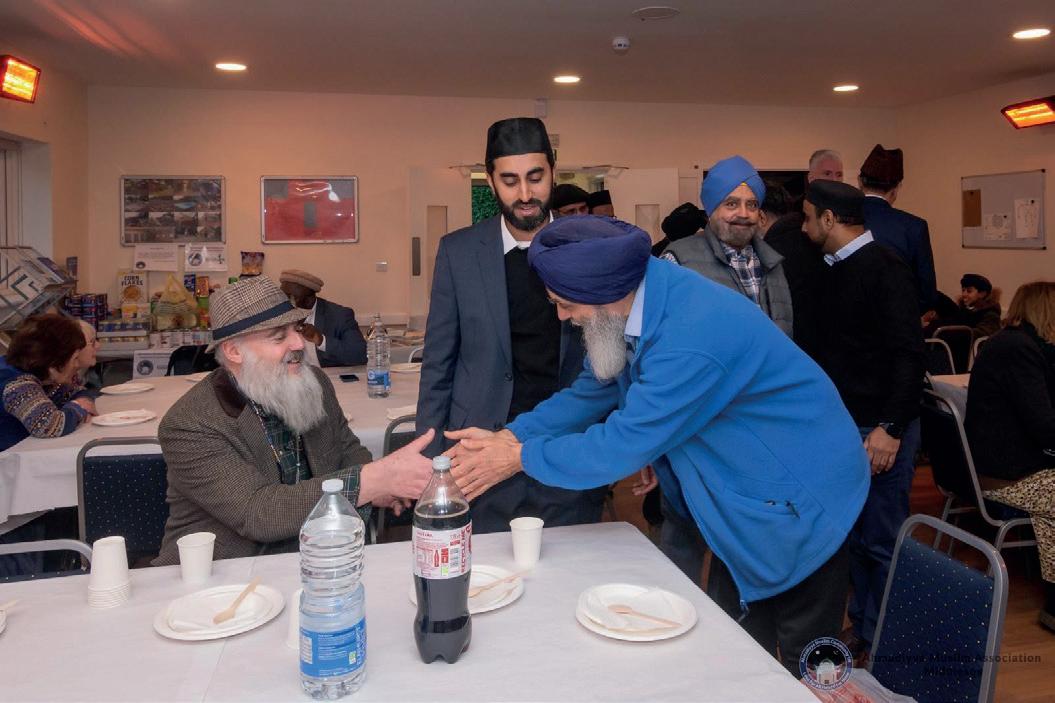
Friday 19 April 2024 | AL HAKAM 6
ہےہتیرمتسلاناشاہو،گیامیںمقتلئیکوسےھجدجس نہیںتابائیکوتوکیںجاسا،ہےنیجانیآتونجایہ
Image courtesy of AMJ UK
Faraz Tahir
To Allah we belong and to Him shall we return Reflections on the reality of life and death
Jalees Ahmad Al Hakam
From the moment of our birth, as we begin to crawl, stand, walk and navigate through life, we are already on a journey towards our next life of the hereafter. As Muslims, we are welcomed into this world with the call to prayer (adhan), and are bidden farewell with the funeral prayer (janazah). There is one incontrovertible certainty in life: death. Amidst the ebb and flow of time, death remains the immutable, unchangeable truth, as emphasised in the Holy Quran as yaqin (Surah al-Hijr, Ch.15: V.100). And so, with death as a reminder, we enter this world and pray until we are prayed upon.
There are those who spend their lives fully submitted to God’s will, and then there are those who busy themselves with the attractions of this limited abode, ensnared by the allure of earthly pursuits. No matter what road we may choose to undertake in this life, we all shall one day return to our Creator, for we all belong to Him alone. As outlined in the Holy Quran:
Inna Lillahi wa inna ilayhi raji’un “Surely, to Allah we belong and to Him shall we return.”
(Surah al-Baqarah, Ch.2: V.157)
These words, revealed in the Holy Quran, are uttered by believers who, upon facing any form of affliction, find solace in their recitation; however, this phrase is frequently said when receiving news of someone’s passing. It encapsulates a fundamental belief regarding the nature of human existence and the ultimate return to God.
With the passage of time, it is nearly impossible for one to recall how often these words have been said. Yet, it is certain that hearing them is vastly distinct from truly feeling their depth in every fibre of one’s heart and soul; for this phrase, revealed by God and recorded in the Holy Quran, is not something said or written by Man. No, in fact, they have been directly revealed by Allah – Himself. Thus, to truly understand its essence, it is not merely enough to say it; we must also ponder over its meaning until we feel it, as the Holy Quran is a book not only to be read, but felt deeply.
To God we belong and to Him we return: Meaning and significance
Surely, to Allah we belong and to Him shall we return – these words, if truly grasped, are intended to serve as a (i) reminder, (ii) comfort, and (iii) glad tiding. They remind us that we all belong solely to Allah and we are comforted by the words that we will all return to Him. However, some may wonder
where the glad tidings are. The glad tidings come to light when these words are not just heard or spoken, but profoundly felt. It’s the realisation that we will all eventually reunite with Allah, and that the separation from our loved ones – whom we have lost on the journey of life – is only temporary, a pause in communication, and that a joyful reunion awaits us in His presence.
When the Companionsra of the Holy Prophetsa learned that in the afterlife a person will be with those whom they love, it was said that after the advent of Islam, nothing brought greater joy to the Muslims than this profound truth. (Jami‘ at-Tirmidhi, Kitab az-zuhd, Hadith 2385)
As Muslims, we deeply believe that “Allah is the Creator of all things, and He is Guardian over all things.” (Surah az-Zumar, Ch.39: V.63) And so, when a misfortune overtakes a Muslim, the words a believer utters – Surely, to Allah we belong – embody the profound concept that an owner does not seek to annihilate his possessions with his own hands but rather desires to preserve them. And so, if a believer really and truly acknowledges that everything belongs to Allah Almighty and regards Him as the ultimate Owner, then it cannot be conceived by the believer that whatever Allah Almighty reclaims from him or whatever hardships befall him are intended for the believer’s ruin. And this is something Hazrat Musleh-e-Maudra has alluded to in his exegesis (tafsir). (Cf. Tafsire-Kabir [2023], Vol. 3, pp. 60f)
Huzoorra further states that a believer who firmly believes that they belong to Allah and that God has cradled them in His arms, akin to how a mother holds her child, cannot fathom that he will be ruined or that his hardships will not be alleviated. Allah, the greatest Protector of all protectors, does not intend to destroy a believer when He reclaims something from His servant. Rather, we are reminded that Allah places the loved one who has passed on to a better place than before with utmost love and care. (Ibid.)
Allah the Almighty, in His mercy towards His servants, added the words inna ilayhi raji‘un, i.e., to Him shall we return, thus completing this statement. This holds deep significance for those who have lost a loved one. It’s a reminder that the loved one’s departure from this world doesn’t mean they’re separated forever, as Allah promises, inna ilayhi raji‘un. It’s a comforting thought that one day we will be reunited with them in the presence of our Creator. The only difference is that they have just finished their journey before us and we shall follow suit when our time comes. Though they’ve reached their destination before us and we’re still on our way, we find solace in knowing that ultimately we’ll all arrive at the same place. In moments of grief and loss, this understanding brings a sense

of peace and reassurance to the believer. (Ibid., pp. 64ff)
In his tafsir, while explaining the verse at hand, Hazrat Khalifatul Masih Ira narrated a story:
“A man’s beloved had passed away, leaving him distraught. A friend came and told him a story about a person who had left some jewels in another’s safekeeping. When the owner returned some days later to reclaim them, he began wailing and screaming. At this, the man whose dear one had died remarked that he must have been a great fool to cry over the return of what was entrusted to him. Hearing this, his friend said, ‘Look to yourself. Were not your children also merely entrusted to you by God? If He has taken them back, what cause is there for such anguished mourning?’”
Then, Huzoorra further added –explaining the second half of the phrase –that if God takes something back, being its Owner, its Creator, and its Lord, then there is no real sorrow because we too have to return to Him and receive our reward there. (Haqaiq-ul-Furqan, Vol. 1, pp. 270f)
Thus, we understand that death is merely a pause in communication with our loved ones, as ultimately, we all shall return to God, reuniting in the eternal realm.
Inna Lillahi wa inna ilayhi raji’un: Proper usage and etiquette
As Muslims, with all matters regarding faith, we always turn to the Holy Quran and the practice of the Holy Prophetsa to find our solution. In the Holy Quran, when we look at guidelines on when and how one should recite Inna li-llahi wa-inna ilayhi raji‘un, we find that when a misfortune overtakes a believer, they say, “Surely, to Allah we belong and to Him shall we return.” (Surah al-Baqarah, Ch.2: V.157)
With reference to the Holy Prophetsa, we read that he said, “When a calamity strikes one of you, then let him say, ‘Surely, to Allah we belong and to Him shall we return.’”
(Jami‘ at-Tirmidhi, Kitab ad-da‘wat)
This phrase is not merely uttered at the demise of a person; these words were even said by Hazrat Abu Bakrra when the Meccans expelled Prophet Muhammadsa from Mecca. Hazrat Ibn Abbasra recounted that when the Holy Prophetsa migrated from Mecca, Abu Bakrra said, “They have driven out their Prophetsa. Indeed, to Allah we belong and to Him shall we return. Surely, they are doomed.” (Sunan an-Nasa’i, Kitab al-jihad, Hadith 3085)
Thus, this phrase resurfaces – recalled and evoked in moments of loss, trials, and adversity. It serves as the ultimate reminder of our short existence on this earth, as we all inevitably journey towards reunion with our Creator.
These divine words also help remain steadfast. The Promised Messiahas, in relation to this, explains, “[W]hen one suffers a loss, one should consider it as rendering back to God that which He had bestowed, and should utter no complaint about it. One should affirm that it was a bounty of God which He has recalled and that one is reconciled to God’s pleasure.” (The Philosophy of the Teachings of Islam [Islami Usul ki Falasfi], pp. 76f) This means that true moral virtue lies in recognising losses as returning blessings to God, refraining from complaint, and accepting them as God’s will.
However, it is not to say that one must rid oneself of the feeling of grief, for it is human nature to feel grief. Hazrat Muslehe-Maudra, in his tafsir, under the verse in discussion, has said that expressing grief does not contradict patience. For instance, during weddings, parents cry as their daughters leave for their new homes, but this is a natural emotion and does not imply impatience. Therefore, when calamity strikes, it is the faithless who say, “I have been destroyed,” but the believer, who submits entirely to God’s will, thinks that
7 AL HAKAM | Friday 19 April 2024
نَوعُجِارَ هِيْلَإِ انَّإِوَ هِلَّٰلِِ انَّإِ
Continued on next page >>
William Gullo | Unsplash
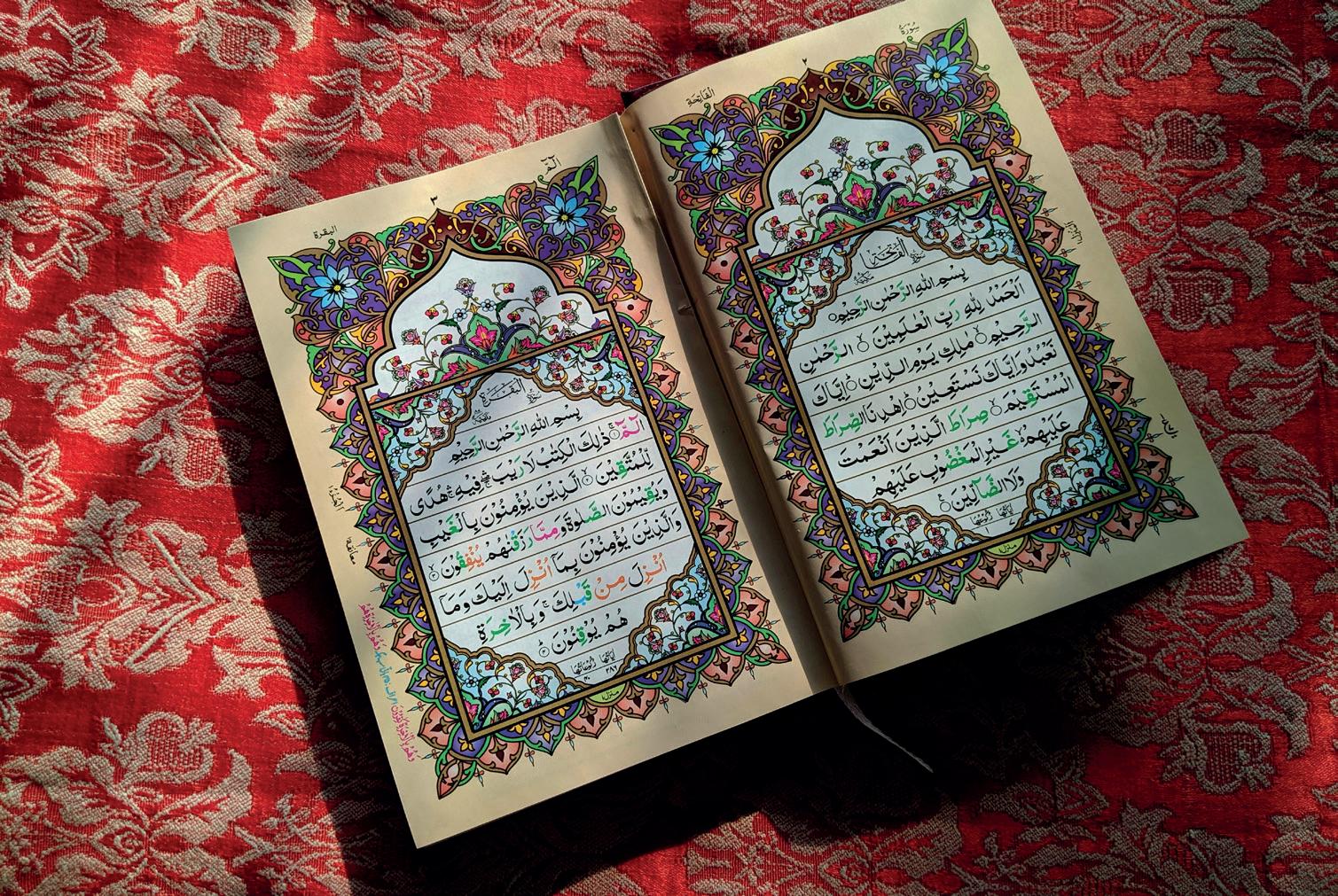
<< Continued from previous page
Allah must have concealed some aspect of good and blessing even within this adversity. (Tafsir-e-Kabir [2023], Vol. 3, pp. 60-61)
The depth of wisdom found within the Holy Quran is truly remarkable. Consider topics like life, death, and predestination, which are often not fully grasped by the average person. Yet, when individuals attempt to explore these deep, philosophical subjects without proper guidance, their interpretations often stray far from the teachings of Islam, leading them to conclusions diametrically opposed to its essence.
In some cultures, where deep contemplation is lacking due to environmental or societal factors, individuals often unintentionally offer words of discomfort in an attempt to console others. For instance, when facing the loss of a loved one, some may assert that, “It was destined to happen,” or, “Their time on earth was limited.” While this may hold true in certain natural circumstances, such explanations falter when applied universally. Consider the case of suicide – forbidden in Islam – where individuals exercise free will. It would be erroneous to attribute such actions to divine decree. In the exchange of condolences, it’s often the seemingly misplaced words that leave a lasting impression.
And so, the words Surely, to Allah we belong and to Him shall we return offer not just solace but also serve as a deep reminder that certain aspects of life are beyond our understanding. In times of uncertainty, we must lean on these divine words to guide us and to encourage others to seek solace in God.
Thus, it becomes increasingly crucial to recall the comforting words prescribed by Allah and His Messengersa in times of sorrow.
“To Allah belongs what He takes and what He gives. Every matter has a limited time. Therefore, be patient and await Allah’s reward.” (Sahih al-Bukhari, Kitab al-qadr, Hadith 6602)
When Ja‘far ibn Abi Talibra was martyred, the Holy Prophetsa came to the family to inform them of this news. It is narrated by Abdullah ibn Ja‘far that when
the news of Ja‘far’sra demise arrived and the Holy Prophetsa sensed their grief, he said:
“Prepare some food for the family of Ja‘far, for indeed something has happened to them that will keep them busy.” (Jami‘ atTirmidhi, Kitab al-jana’iz)
In this hadith, the profound wisdom of the Holy Prophetsa is set forth. It underscores the importance of alleviating the burdens of a family struck by tragedy. In many parts of the world, mourners flock to the home of the deceased to offer condolences, yet amidst this well-intentioned outpouring of support, it’s essential not to overlook the necessity of easing the family’s burden. The overwhelming presence of visitors often deprives the grieving family of moments together, consumed instead by the demands of hospitality. Herein lies another important lesson from the teachings of the Holy Prophetsa
It is evident that all matters of religion are taught for a reason, especially when that religion claims to be the perfect religion: Islam. When we face such hardships, and when we are reminded in the midst of these hardships that our ultimate end is with God, we ignite within us a spiritual transformation, which in turn aids our emotions in coping with loss or calamities.
Hazrat Umm Salamahra remembered the Prophet Muhammadsa saying that when a Muslim faces calamity and recites the prescribed supplication, Allah rewards and compensates them with something better. (Sunan Ibn Majah, Kitab al-jana’iz, Hadith 1598)
Visiting the graveyard and praying for the deceased
In Islam, visiting the graveyard to pay respects to departed loved ones is not only permissible but encouraged. In fact, we even have beautiful prayers to recite as we walk into the graveyard:
al-jana’iz, Hadith 1547)
And:
“Peace be upon you, O inhabitants of the graves. May Allah forgive us and you. You have preceded us, and we are to follow in your footsteps.” (Jami‘ at-Tirmidhi, Kitab al-jana’iz)
As one stands amidst the silent ground of the graveyard, questions may arise: Why do we come here? Is it solely to pray for our departed, or do we seek solace in the memories they left behind? The truth is, we can pray for them and remember our loved ones from anywhere in the world. And so, as we continue to visit the graveyard, a profound truth emerges and unfolds before us: The realisation that we do not simply come to the graveyard to visit our loved ones; in fact, for anyone who keeps the above-mentioned prayer in mind will know that we come to pray and also acknowledge that we will be joining them soon, God willing. And so, we pray for our loved ones until we, ourselves, are prayed upon.
When we examine the practice of the Holy Prophetsa, we find that his teachings, actions, and sayings were not devoid of wisdom. It is narrated that a woman, who would clean the mosque, passed away during the night, and the news reached Allah’s Messengersa the following morning. The Holy Prophetsa asked why he hadn’t been informed. Then, accompanied by his companions, he proceeded to her grave, led the funeral prayer and offered supplications for her. (Sunan Ibn Majah, Kitab al-jana’iz, Hadith 1533)
It is often questioned whether crying aligns with the sunnah or if the Holy Prophetsa forbade it altogether. Contrary to misconception, the Holy Prophetsa did not prohibit crying but rather discouraged the act of excessive wailing, known as niyaha or nawha. (Sahih Muslim, Kitab al-iman, Hadith 67)
Hazrat Abu Hurairara narrated that Allah’s Messengersa visited his mother’s grave, where he wept, moving others to tears as well. He then expressed that he had sought permission from his Lord to seek forgiveness for her, but it was not granted. However, permission was granted to visit her grave. Here, the Holy Prophetsa said, “Visit graves, as it reminds you of the reality of death.” (Sahih Muslim, Kitab al-jana’iz, Hadith 976) This hadith emphasises the importance of visiting graves to remind oneself of the inevitability of death.
Hazrat Aishara recounted that the Holy Prophetsa kissed Hazrat Uthman ibn Maz‘un’sra face upon his demise. She said, “The Holy Prophetsa wept so much that his tears flowed over Uthman’s face.” (Mishkat al-Masabih, Kitab al-jana’iz, Hadith 1623)
It is reported that Hazrat Fatimahra, the daughter of the Holy Prophetsa, shed tears upon the passing of Allah’s Messengersa. She said:
Nasa’i, Kitab al-jana’iz, Hadith 1844)
When it comes to visiting, praying, and shedding tears for the deceased, the guidance of the Holy Prophetsa is before us. Not only is shedding tears allowed, but it is in fact an act of sunnah, for “Allah does not punish for the tears that the eye sheds or the grief the heart feels” (Sahih Muslim, Kitab al-jana’iz, Hadith 924). It is in fact the act of wailing which has been forbidden in Islam. A beautiful method of praying for the deceased
Death and visiting the graveyard serve as reminders that our time on earth is finite. Whether in times of hardship or joy, our existence is temporary, and one day, we will bid farewell or be bidden farewell to. While fully grasping the whats, whys and concepts of the afterlife may challenge our understanding, our faith in the mercy of Allah and life after death remains steadfast.
When we visit the graves of our loved ones, we do so to pray for their forgiveness and to ask for Allah’s mercy upon them. While it is true that prayers for the deceased can be offered from anywhere in the world, questions may arise regarding the manner and content of these supplications beyond what is outlined in the ahadith Hazrat Musleh-e-Maudra once expressed that whenever he would pray at the grave of the Promised Messiahas, he would follow a specific practice. Firstly, he would pray for the Holy Prophetsa, and then offer supplications for the Promised Messiahas Huzoorra stated that his prayer would revolve around the acknowledgement of his inadequacy, recognising that he possesses nothing worthy to offer them from here. However, Huzoorra added, he would beseech Allah, Who possesses everything, to bestow upon them a gift in heaven on his behalf, one that they have not yet received.
Huzoorra further expresses that he would envision them questioning: O Allah! From whom did this gift come? And when God reveals the source, they in turn pray for that individual and thereby elevate their status.
Indeed, prayers benefit the deceased. Therefore, when we supplicate for the Holy Prophetsa or the Promised Messiahas and invoke blessings upon them, God Almighty presents a gift to them on our behalf. Although we may not comprehend the blessings of Heaven, Allah is well aware. Thus, when we pray for a unique gift for the Holy Prophetsa, it is inevitable that Allah informs him of its origin. Their soul would naturally appeal to Allah, pleading for an even greater reward for the benefactor. Thus, the supplication returns to the sender, leading to the elevation of their status.
(Anwar-ul-‘ulum, Vol. 17, pp. 182f)
What can we do for the deceased loved ones now?
Losing a loved one is one of the hardest challenges in life. At times, the only thing that can truly motivate us to keep moving forward is to hope, long, and pray that our departed ones are at peace and that God is pleased with them.
“Peace be upon you, O inhabitants of the graves, from among the believers and Muslims. And, we will join you soon, if Allah Wills. We ask Allah for well-being for us and for you.” (Sunan Ibn Majah, Kitab
“O my father, how close he is now to his Lord! O my father, we announce the news (of his demise) to Jibril! O my father, Jannat al-Firdaws is now his abode!” (Sunan an-
Here on earth, we had the ability to care for our loved ones, to speak with them and to assist them in any way they needed. But when they depart from this world, a profound emptiness fills our hearts and
Friday 19 April 2024 | AL HAKAM 8
بْسِتَحْتَلَوَ رْبِصْتَلْفَ ،لٍجِأَبِ لٍكُ ،ىطَعْأَ امَ هِلَّٰلِوَ ،ذَخَأَ امَ هِلَّٰلِ
مهُلْغَشْيَ امَ مهُءَاجِ دْقَ هِنَّإِفَ امَاعُطَ رٍفَعُجِ لٍهُأَل اوعُنَصْا
نَإِ انَّإِوَ نَيمِلْسِمِلَاوَ نَينَمَؤْمِلَا نَمَ رَايَدْلَا لٍهُأَ مكُيْلْعْ مُاَلسِلَا ةَيْفَاعُلَا مكُلَوَ انَلَ هِلَّٰلِا لُأَسِنَّ نَوقُحِاَل مكُبِ هِلَّٰلِا ءَاشَ
انَفُلْسَ متَنَّأَ مكُلَوَ انَلَ هِلَّٰلِا رٍفَغَيَ رَوبُقُلَا لٍهُأَ ايَ مكُيْلْعْ مُاَلسِلَا رِثَأَلابِ نَحْنَّوَ
هُاتَبِأَ ايَ هُاعُنَنَّ لٍيَرْبِجِ ىلَإِ هُاتَبِأَ ايَ هُانَّدْأَ امَ هِبِرَ نَمَ هُاتَبِأَ ايَ هُاوَأَمَ سِوَدْرٍفَلَا ةَنَجِ
Abdullah Faraz | Unsplash
the longing to continue caring for them remains strong. This often leads to efforts to beautify their resting places, making their graves larger or more beautiful. However, amidst this longing, it’s crucial to remember that true benefit for our departed loved ones lies not in earthly embellishments, but in sincere prayers and deeds done in their honour.
Hazrat Aishara narrated an incident where someone approached Allah’s Messengersa and expressed: “My mother passed away unexpectedly without having made any will.” He said:
Meaning that, “I believe she would have surely given charity if she had the chance to express herself. Would she receive blessings if I donated on her behalf?”
Upon this, the Holy Prophetsa replied affirmatively, saying: “Yes, she would.” (Sunan an-Nasa’i, Kitab al-wasaya, Hadith 3651)
This has been reported on many occasions. In Sahih al-Bukhari, it is stated that the Holy Prophetsa replied:
“Yes, give in charity on her behalf.” (Sahih al-Bukhari, Kitab al-wasaya, Hadith 2760)
Extracting from this hadith, we learn that even after someone’s passing, their potential charitable intentions can still bring blessings for them if fulfilled by those left behind.
In the same vein, we read a hadith narrated by Hazrat Ibn Abbasra that Sa‘d ibn ‘Ubada’s mother passed away while he was away. He asked, “O Allah’s Messengersa! My mother passed away while I was away; will it benefit her if I give charity on her behalf?” The Holy Prophetsa replied, “Yes.” Sad then declared, “I bear witness that I have donated my garden known as al-Makhraf in charity on her behalf.” (Sahih al-Bukhari, Kitab alwasaya, Hadith 2756)
Further, in another hadith, we find that Hazrat Abu Hurairara narrated that Allah’s Messengersa said: “Upon the demise of a person, their good deeds cease, except for three: continuous charity [sadaqah jariyah], beneficial knowledge, and a pious offspring who prays for them.” (Sunan an-Nasa’i, Kitab al-wasaya, Hadith 3651)
Bearing this hadith in mind, as we are discussing what one can do to benefit their loved ones who have passed away, we read of a famous, beautiful and hopeful narration that also highlights the Mercy of Allah. We read that the Holy Prophetsa said, “A man will be raised in status in Paradise and will ask [Allah]:
“‘Where did this come from?’
“And it will be said:
“‘From your son’s praying for forgiveness for you.’” (Sunan Ibn Majah, Kitab al-adab, Hadith 3660)
How grand is the Mercy of Allah! Delving deeper into this matter, our minds
are compelled to believe that there is a reason why the janazah prayer commences with words of seeking forgiveness. For now, with our limited time on earth, our emulation of their good deeds, offering charity on their behalf, and seeking forgiveness for them are ways in which we can care for and look after them and hope that they are engulfed in the Mercy of Allah, Whose Mercy extends all bounds and Who has written it upon Himself to be Merciful. All praise belongs to Allah!
As Muslims, every time we perform a good deed, a share of its reward goes to the Holy Prophetsa, for it was he who ultimately taught us. Similarly, every time we learn about his deeds, a portion of the reward is bestowed upon those who facilitated the transmission of that knowledge to us. Therefore, when losing a loved one, remember their good deeds, internalise them, and strive to become better individuals, ensuring that both you and the deceased from whom you learned those virtues are rewarded.
What does the Holy Quran say about being reunited with our loved ones?
The promise of a joyful reunion with our loved ones in the hereafter is encapsulated in the phrase: wa-inna ilayhi raji‘un – for indeed, we shall all return to Allah one day. Yet, in our limited understanding of the afterlife, numerous questions persist, echoing the uncertainties. And so, we must turn to the Quran and sunnah for answers and meaning.
It was narrated that someone approached the Holy Prophetsa and enquired: “What is your view on someone who loves a people, yet their acts or deeds are not identical to theirs?” To this, The Holy Prophetsa replied: “A person will be with those whom they love.” (Sahih Muslim, Kitab al-birri wa s-silati wa-l-adab, Hadith 2640) This beautiful hadith serves as a reminder and a consolation of the heart in times of difficulty. We are assured that we will be reunited with our loved ones in the hereafter. As mentioned at the beginning, it was said that after the advent of Islam, nothing brought greater joy to the Muslims than this profound truth. (Jami‘ at-Tirmidhi, Kitab z-zuhd, Hadith 2385)
When we turn to the Holy Quran, we inevitably find our answer with certainty. The All-Merciful God states: “Gardens of Eternity. They shall enter them and also those who are righteous from among their fathers, and their wives and their children.” (Surah ar-Ra‘d, Ch.13: V.24)
The involvement of family members in one’s deeds, as outlined in this verse, highlights the shared responsibility and rewards for virtuous actions. Whether it’s the spouse of a missionary aiding in household duties or parents and children contributing to their relative’s good works, their collective support merits a share in the resulting rewards. In the divine scheme, those who excel in virtue will find their righteous families in the afterlife. For example, a tradesman, a farmer, or an industrialist are inherently linked to the collaborative efforts of numerous individuals. The prosperity of a businessperson or a farmer hinges upon the concerted efforts of countless others,

knowingly or unknowingly.
Then, God also states:
“Verily the inmates of Heaven will, on that day, be happy in [their] occupation. They and their wives will be in pleasant shades, reclining on raised couches.” (Surah Ya Sin, Ch.36: V.56-57)
Further, the Gracious God records in the Holy Quran: “‘Enter ye the Garden, you and your wives, honoured and happy.’” (Surah azZukhruf, Ch.43: V.71)
And again, we read:
“And those who believe and whose children follow them in faith — with them shall We join their children. And We will not diminish anything from [the reward of] their works. Every man stands pledged for what he has earned.” (Surah at-Tur, Ch.52: V.22)
All these verses suggest that those who are righteous will enter these eternal gardens, along with their forefathers, spouses, and children, indicating a reunion of families in paradise.
Moving on?
Often, after losing a loved one, as one’s world and life change instantly, a question arises: How will life be now? Will one be able to continue living life in the same manner? Frequently, one’s mind is flooded with such questions and thoughts.
In times of distress, people look for ways to move on; however, that’s in fact not the right approach. When a loved one passes, moving on without them should not be the intention; the idea is to move forward with them. And this was also the practice of the Holy Prophetsa
Moving forward with them means that rather than moving on from them, it allows us to honour their memory, keep their spirit alive, and continue the legacy they left behind. By moving forward with them, we acknowledge the deep impact they had on us and ensure that their influence continues to enrich our lives even after they are gone.
Consider the example of the Holy Prophet Muhammadsa. Throughout his life, even after the passing of Hazrat Khadijara, he cherished her memory, keeping her alive in his heart until the end of his days.
Take the narration of Hazrat Aishara, for example. She stated:
“I never felt so jealous of any woman as I did of Khadija,” even though she had never even met her, she added. (Sahih alBukhari, Kitab al-adab, Hadith 6004; Ibid., Kitab manaqibi l-ansar, Hadith 3818) This shows that the Holy Prophetsa did not move on from Hazrat Khadijahra; rather, he moved forward with her and honoured her. The Prophetsa mentioned Hazrat Khadijahra often, he would slaughter a sheep and distribute its meat among her friends, and give gifts to them. (Ibid.)
This is the example we ought to emulate. It holds the power to aid us in healing the deep wounds within our souls. It’s imperative that we keep this example everpresent in our minds.
The Holy Prophetsa would often speak about Hazrat Khadijahra, and this is how he moved forward with her. It is remarkable that Hazrat Aishara even stated that the Holy Prophetsa remembered her so often that it was as if “there is no woman on earth except Khadija.” (Sahih al-Bukhari, Kitab manaqibi l-ansar, Hadith 3818)
We know the Holy Prophetsa loved Hazrat Khadijara; however, he never let her passing be in vain. He remembered her, kept her memory alive, and was not held back by her passing, but instead continued his mission while keeping her memory alive.
Conclusion
Therefore, in times of losing a loved one, we never ought to lose faith. Upon losing a loved one, it is not expected to remain unaffected. That’s not the essence of sabr, or patience. Patience entails refraining from uttering anything displeasing to Allah. When you experience pain, remember that our Prophetsa experienced pain too. If tears fall, remember that our prophet shed tears as well. If you feel grief, know he also felt grief; however, he exemplified patience: “The eyes are shedding tears and the heart is grieved, and we will not say except what pleases our Lord.” (Sahih al-Bukhari, Kitab al-jana’iz, Hadith 1303)
And so, moving forward with those who have passed away is necessary for healing. Therefore, when we say Inna li-llahi wa-inna ilayhi raji‘un, we are not only remembering the deceased one’s passing, but also acknowledging that we will eventually join them in our return to Allah.
9 AL HAKAM | Friday 19 April 2024
تْقَدْصْتَ تْمِلْكَتَ ولَ
اهُنَعْ قْدْصْتَ ،معُنَ
اذَهُ ىنَّأَ
كَلَ كَدْلَوَ رَافُغَتَسَابِ
Nic Y-C | Unsplash
Is physical health more important than mental health?
Samar Faraz Khawaja Student, Jamia Ahmadiyya Canada
Physical health and mental health are two of the most crucial aspects of an individual’s overall well-being. Physical health refers to how an individual’s internal and external body organs function and how a person physically performs. On the other hand, mental health refers to a person’s psychological, emotional and social wellbeing. While it may seem that one of these two aspects of life is more important than the other in some way, in reality, both physical and mental health are equally important in one’s life, and both of them can impact an individual’s overall well-being.
Physical health is essential for our body as it allows our body to function properly in our daily lives and it helps us with our dayto-day activities such as walking, working, running, exercising and many more. Physical health is also an important component of an individual’s healthy lifestyle and it improves one’s health outcomes across their lifespan. Research has shown that as moderateto-vigorous physical activity (MVPA) increases, all-cause mortality (death from all causes) decreases. (“Physical Activity & Why It’s Important,” 16 February 2023, healthcare.utah.edu)
When we are healthy, we are more capable of being active and achieving our life goals and we are also capable of having a higher quality of life and a longer life. Being physically active can improve one’s brain health, reduce the risk of disease, strengthen bones and muscles, and improve our ability to do everyday activities. (“Benefits of Physical Activity,” www.cdc.gov)
Mental health is an important aspect of an individual’s life, as it plays a huge impact on our day-to-day life as well. It can have a lasting effect on a person’s education, career, relationships, etc. According to the National Institute of Mental Health (NIMH), 1 in 5 adults now lives with a moderate to severe mental health condition. The Centers for Disease Control and Prevention (CDC) further notes that over 50% of Americans will be diagnosed with mental illness in their lifetime. (Mars Girolimon, “Why Is Mental Health Important?” www.snhu. edu, 24 August 2022) In another research it was found out that a person has 3.4 poor mental health days per month. (“The Link between Exercise and Mental Health,” www. uclahealth.org, 17 October 2018). These statistics reveal how serious of a problem mental health is these days.
Although both physical and mental health are important on their own; however,
in reality, none takes precedence over the other. If one of these aspects of life is affected, then the other is most likely to be impacted as well. According to a research, physical health problems significantly increase our risk of developing mental health problems, and vice versa. (“Physical Health and Mental Health,” www.mentalhealth.org.uk, 18 February 2022)
In addition, people with serious mental health conditions are at high risk of experiencing chronic physical conditions and people with chronic physical conditions are at risk of developing poor mental health. (“Connection between Mental and Physical Health”, 2023, https://ontario.cmha.ca) This is proven by research in which it was found that nearly one in three people with a long-term physical health condition also has a mental health problem, most often depression or anxiety. (“Physical Health and Mental Health,” www.mentalhealth. org.uk, 18 February 2022) This is because both physical health and mental health are directly connected to each other and when a person is physically or mentally affected, the other health aspect automatically starts to get affected as well. Physical health and mental health can have a significant effect on each other indirectly as well. For example, mental health may affect an individual’s decision-making process, impairing their ability to access information on their health and the quality of healthcare providers, and thus impacting their physical health. (Julius Ohrnberger, Eleonora Fichera, and Matt Sutton, “The Relationship between Physical and Mental Health: A Mediation Analysis,” Social Science & Medicine 195, no. 195 (December 2017): 42–49, https:// doi.org/10.1016/j.socscimed.2017.11.008). In addition, worse physical health may imply a loss of wages or productivity, reducing access to healthier foods and environments

and ultimately negatively affecting mental health, which may include a lack of sleep and stress at work (Ibid.). Thus, both affect each other indirectly.
The belief that physical health is more important than mental health is put forth by some. It is believed that exercise can help manage symptoms of depression and anxiety, reduce stress, improve self-esteem, and enhance mood. (Aarti Agarwal, “Does Physical Health Affect Your Mental Health?”
6 January 2024, www.juno.care). One could argue that because of this physical health takes precedence over mental health. In reality, this is not true because, although exercising helps a person stay fit mentally, it doesn’t help physical health take precedence over mental health. This is because there can be a point made that research has shown that mental illnesses can impact the
rest of your body. (“Mental Health Is Just as Important as Your Physical Health,” 28 April 2022, healthcare.utah.edu) Therefore, solely focusing on one benefit doesn’t do justice. When we look at both health aspects overall, then both are connected and none takes precedence over the other.
In conclusion, both physical and mental health have an important effect on an individual’s life. However, it cannot be inferred that the physical health aspect is more important than mental health. This is because mental health plays a similar role in one’s life as physical health. Additionally, mental health has a direct and indirect effect on the physical health of a person. And physical health also has a direct and indirect effect on an individual’s mental health. Therefore, one health aspect cannot be more important than the other.
‘Big Iftar’ event held in Huddersfield, UK
Aamir Shahzad President Huddersfield South
Jamaat-e-Ahmadiyya Huddersfield North and South organised a Big Iftar event at the Bait us Samad Mosque on 16 March 2024.
The programme started with the recitation from the Holy Quran, followed by a welcome address by the Secretary of External Affairs, Huddersfield South. A number of speakers
shared their views and teachings such as “Fasting Concept in Christianity” by Rev. Amanda Ogilvie Berry from Huddersfield Parish Church.
Deputy Lord Lieutenant of West Yorkshire, Major Stan Hardy, spoke on current circumstances, highlighting the importance of peace in the world, especially in Palestine and urged the audience and politicians to raise their voices for peace.
This was followed by various speeches in relation to fasting and Ramadan. A vote of thanks was given by Yousaf Aftab Sahib, President of Huddersfield North, and the event concluded with a special prayer. All the external guests observed the opening of the fast and Maghrib prayer, followed by an iftar dinner. The event was attended by over 50 external guests and Huddersfield Jamaat members.
Friday 19 April 2024 | AL HAKAM 10
Marcel Strauß | Unsplash
Seeking truth amid misinformation and deepfakes Opinion
Fazal Masood Malik & Farhan Khokhar Canada
The proliferation of misinformation in recent years has had a corrosive impact at every level of society. From the personal to the national and economic, the spread of falsehoods and deception is eroding the foundations of truth and trust that modern civilisation rests upon.
As Ahmadi Muslims, we have an ethical duty to verify information before sharing it. The Holy Prophetsa has warned us, “It is enough for a man to prove himself a liar when he goes on narrating whatever he hears,” (Riyad as-Salihin, Kitab al-umuri l-manhy ‘anha, Hadith 1547), emphasising how easily one can unknowingly spread falsehoods and damage communal trust.
This dedication to truth is further reinforced by the Quranic injunction, “That Allah may reward the truthful for their truth” (Surah al-Ahzab Ch.33: V.24). This injunction emphasises the high value placed on truthfulness and the expectation that Muslims ensure the accuracy of the information they share. This commitment to truth is not just about avoiding falsehood but an expression of piety and awareness of Allah’s presence.
At the personal level, the rise of deepfake technology has enabled a disturbing new frontier of misinformation. Highly convincing fake videos and images can now be generated to depict people doing or saying things they never actually did. This has led to an increase in the non-consensual use of deepfake technology, causing immense harm and trauma to individuals depicted in unauthorised contexts. (“How Deepfakes are Impacting Culture, Privacy, and Reputation”, statuslabs.com) Even beyond these appalling cases, the ease with which visuals can be manipulated means



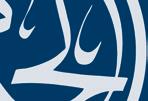


people are becoming desensitised to trusting what they see. If something aligns with their existing beliefs, they’re increasingly likely to accept it at face value without question - a term known as confirmation bias. In the face of such vile, the old adage, “Believe only half of what you see and nothing that you hear”, is a piece of advice that benefits all, when it comes to navigating the complex landscape of modern media.
Social media has become an uncontrolled source of potentially false information. Conspiracy theories, manipulated evidence, and harmful propaganda can now spread rapidly to large numbers of people, bypassing the traditional gatekeepers of legacy media outlets. The danger of how quickly misinformation can go viral was clearly demonstrated when a photo supposedly showing Britain’s future queen consort was quickly disavowed after it was revealed the image had been digitally edited without proper disclosure - an uncharacteristic mistake that damaged the credibility of the iconic brand that released it.
This troubling trend of rampant misinformation extends beyond the personal sphere to the national level as well. We have seen how skilled disinformation campaigns, often state-sponsored, can sow discord, erode social cohesion, and distort political narratives. The 2017 Rohingya genocide in Myanmar, fueled by hate speech and misinformation spread on Facebook, is a chilling example. (“Myanmar: Facebook’s Systems Promoted Violence Against Rohingya; Meta Owes Reparations”, www. amnesty.org) And the 2016 US presidential election was profoundly shaped by the activities of the now-infamous Cambridge Analytica, which used sophisticated psychographic targeting to influence voter behaviour (“Cambridge Analytica and Facebook: The Scandal and the Fallout So Far”, www.nytimes.com). Today, the level of

technological sophistication in these efforts has grown exponentially, making it virtually impossible for the average citizen to discern truth from fiction.
While technology companies in Silicon Valley have created many beneficial innovations for society, they have also unleashed a shadowy world of artificial or synthetic media whose deceptively realistic simulations pose a severe challenge. In Pakistan, malicious groups have even weaponised this technology to misrepresent sacred religious texts as a way to justify persecuting minority sects, especially the Ahmadiyya Muslim Jamaat. Distinguishing what is real from what is fake is becoming increasingly difficult.
The economic ramifications are the most insidious. As trust is the foundation of any functioning market economy, the rampant proliferation of fraud, scams, and deception online threatens to undermine the entire system. Estimates suggest online fraud costs the global economy over $5 trillion annually. (“Fraud costs the global economy over US$5 trillion”, www.crowe.com) When
people can no longer rely on the veracity of information, commerce grinds to a halt. A society corrupted by misinformation can never achieve true economic stability or prosperity.
To counter this existential threat, a multipronged approach is required. Media organisations must redouble their commitment to rigorous fact-checking and impartial reporting using the latest verification tools. Technology companies must be held accountable for the algorithms and business models that incentivise the spread of falsehoods. The public must be empowered with digital literacy skills to critically evaluate the information they encounter online.
The stakes could not be higher. If we fail to stem the tide of misinformation, we risk the unravelling of the social contract, the collapse of democratic institutions, and the erosion of the economic foundations that underpin modern civilisation. The time to act is now before the damage becomes irreparable.
11 AL HAKAM | Friday 19 April 2024
Religion, Faith, History, Society ... WRITE TO US Info@alhakam.org
* For more information, visit www.alhakam.org/write-to-us/
Image: Library
Unity amid distinction: Ahmadis and the Muslim University Movement
Iftekhar Ahmed Ahmadiyya Archive & Research Centre
As the twilight years of the 19th century cast their long shadows, a fervent call for an Islamic renaissance echoed across the Indian subcontinent. Sir Sayyid Ahmad Khan, a visionary in the Muslim intellectual movement, dared to envision an audacious dream – an Islamic university unshackled from governmental oversight, a hallowed space akin to the grandeur of Cambridge and Oxford. Upon his demise, the mantle was taken up by Nawab Mohsin-ulMulk, who enshrined Sir Sayyid’s vision as a memorial within the aims of the Educational Conference movement.
Fundraising campaigns blanketed the vast expanses of India, rallying institutions, associations, aristocrats, and the common citizenry to this noble cause. In the city of Lahore, it was the esteemed Nawab Fateh Ali Khan who took up the charge, petitioning none other than Hazrat Hakeem Maulvi Noor-ud-Din, Khalifatul Masih Ira, the then supreme head of the Ahmadiyya Muslim Jamaat, to seek his involvement and contribution as well as his Jamaat.
A resounding affirmation from Hazrat Khalifatul Masih Ira
In a letter dated 27 February 1911, Hazrat Khalifatul Masih Ira responded to Nawab Fateh Ali Khan with a resounding affirmation:
“Esteemed Sir, “assalamu alaikum wa-rahmatullahi wa-barakatuhu
“As I mentioned before, I am in full sympathy with the proposal for an Islamic university. I shall, insha-Allah, donate 1,000 rupees to this fund myself. Regarding the involvement of my Jamaat,
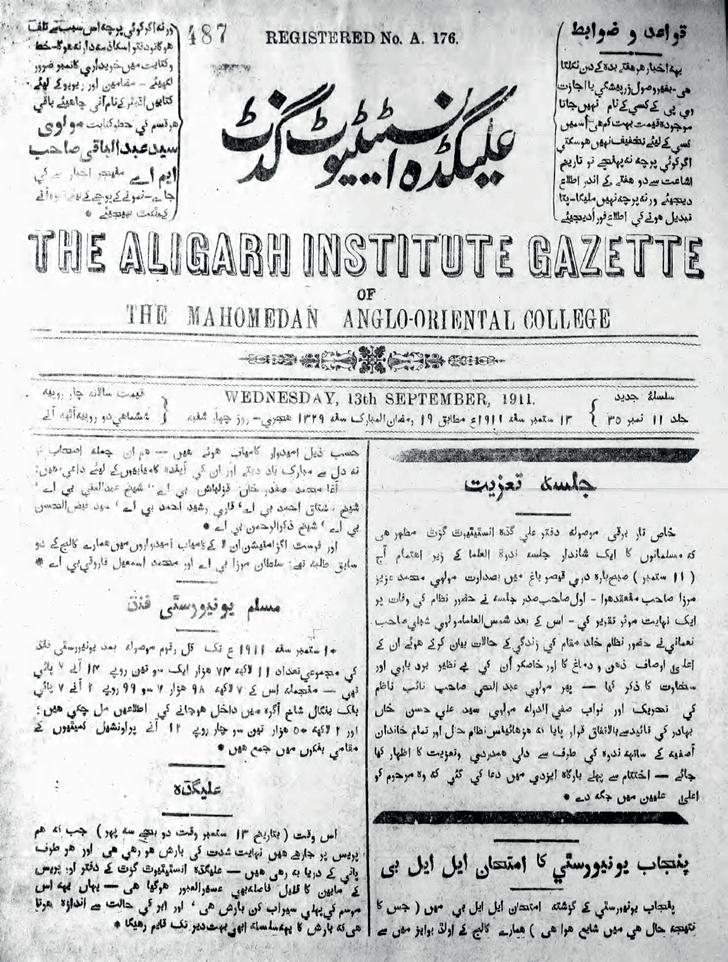
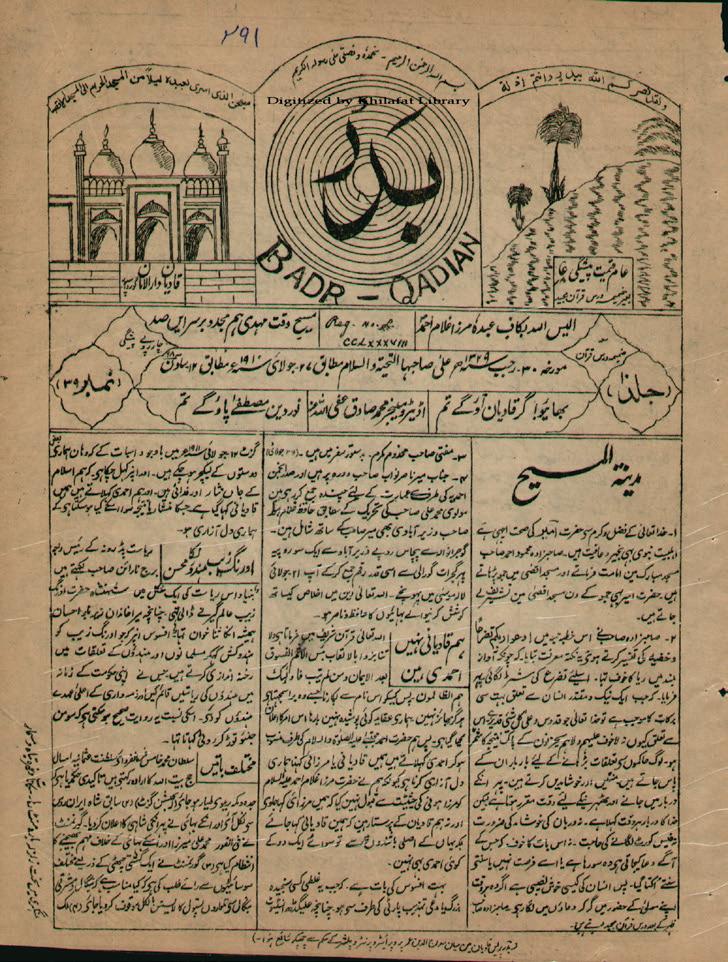
I have published an announcement, a copy of which is enclosed herein.”
The announcement, a clarion call to the Ahmadiyya Muslim Jamaat, echoed the importance of this noble endeavour:
“Since a general movement is currently underway to establish an Islamic university in India, and some friends have enquired whether we too should participate in this donation fund, this announcement is made for all those associates involved in this endeavour:
“Although the specific needs of our own movement are many, and our people bear a heavy burden of such donations, since the university movement is a noble cause, we deem it essential that our friends too participate – by pen, stride, speech and monetary aid.” (Badr, March 9, 1911, p. 6)
Accompanying this rallying cry, a donation of one thousand rupees was sent forth on behalf of the Ahmadiyya Muslim Jamaat, solidifying its commitment.
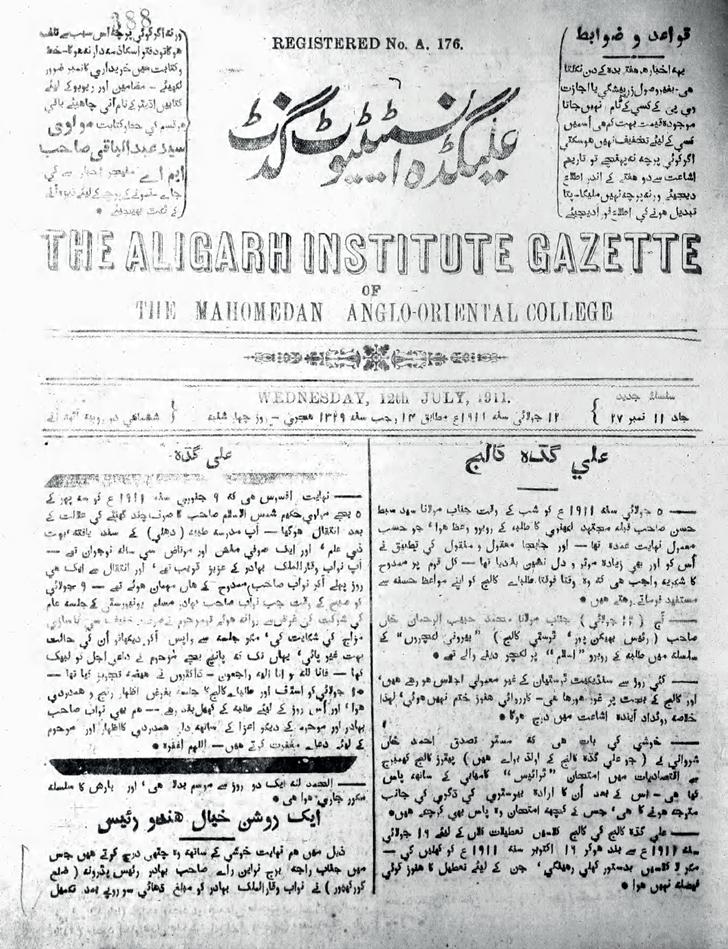
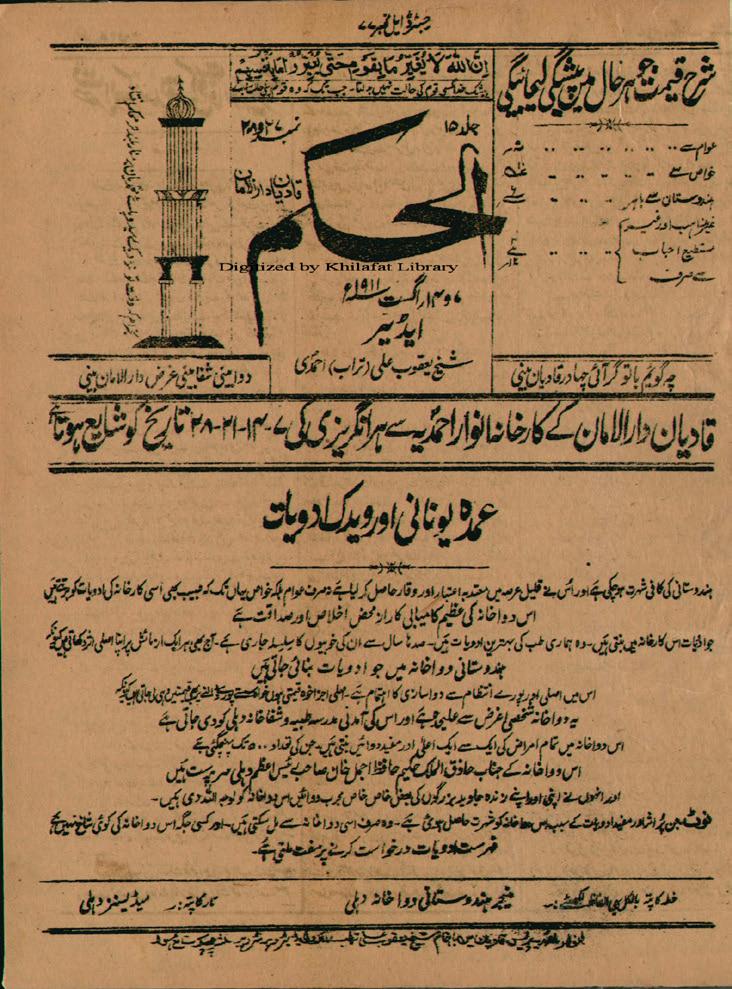
(Annual Report Sadr Anjuman Ahmadiyya, 1911-12, p. 81)
Forging unity – Preserving
distinction
As the Ahmadiyya Muslim Jamaat embraced this rallying cause, a delicate balance emerged – the imperative to foster unity with the broader Muslim community through the university endeavour, while safeguarding their distinct identity. In a profound discourse recorded in the pages of Al Hakam, 7 March 1911, and Badr, 8 March 1911, Hazrat Khalifatul Masih Ira elucidated the nuances of this intricate dynamic:
“We have decided upon participation (the manifestation of this decision will happen soon). It is certainly necessary to work together on common matters, but it is also necessary to maintain distinction.”
He expounded upon the rationale behind the need for distinction, emphasising it as the wellspring of progress, the bulwark of honour, the catalyst for moral rectitude, and the forge for striving and prayer. Hazrat Khalifatul Masih Ira underscored the impossibility of complete reconciliation, for such a notion would undermine the very essence of the Ahmadi identity.
These profound words, recorded in the annals of Al Hakam and Badr, echoed a sentiment that would reverberate through the ages – the Ahmadi quest was not merely one of unity, but of preserving the sacred distinction that defined their path to Islamic revival.
Contention over nomenclature amid the university discourse
As the Ahmadi involvement in the Muslim University movement gained momentum, a contentious issue arose that
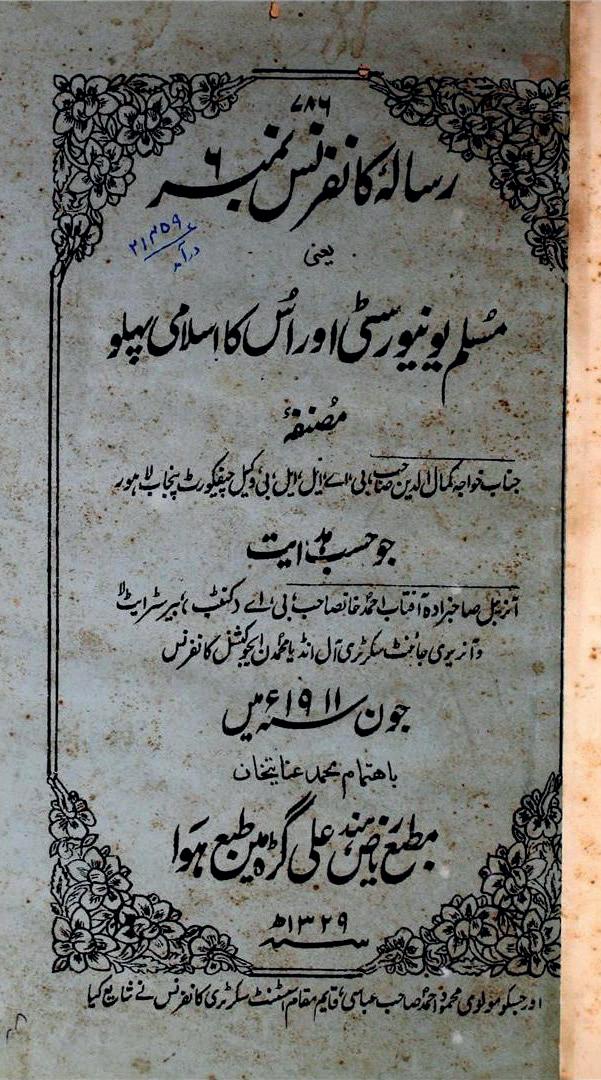
struck at the heart of their identity – the very nomenclature by which they were addressed. The Aligarh Institute Gazette, a publication closely associated with the university efforts, referred to the Ahmadis as “Qadianis” in its 12 July 1911 issue while discussing concerns raised by Muhammad Asghar Dehlavi in an article in The Paisa Akhbar’s issue from 10 July 1911 about how the religious teachings of the 72 sects of Islam could possibly be accommodated in the university’s curriculum.
The Ahmadi Muslim newspaper Badr swiftly responded to this affront in its 27 July 1911 issue, invoking the Quranic injunction: “nor call one another by nicknames” (Surah al-Hujurat, Ch.49: V.12). Hazrat Mufti Muhammad Sadiqra, the then editor of Badr, affirmed the true identity as “Ahmadis,” a title derived from the revered figure of the Holy Prophet Muhammadsa, emphasising the unwavering allegiance to the teachings of Islam as revived by the Promised Messiah, Hazrat Mirza Ghulam Ahmadas
In this profound exposition amidst the escalating discourse surrounding the Muslim University, Hazrat Mufti Muhammad Sadiqra elucidated the significance of this nomenclature: “We are not Qadianis, we are Ahmadis. […] It is a matter of great regret that when this mistake is made by a respected elder or a party claiming to be civilised in the context of the university movement. […] We have repeatedly announced our beliefs, and it has been declared time and again that we
Friday 19 April 2024 | AL HAKAM 12
Continued on next page >>
Badr
Al Hakam
Institute Gazette
Risalah-e-Conference Aligarh
<< Continued from previous page
are devoted to Islam and its adherents.”
This contention over nomenclature was not merely a matter of semantics, but a battle for the preservation of the Ahmadi identity – an identity rooted in the revivalist teachings of the Promised Messiahas. It struck at the very heart of their involvement in the Muslim University endeavour, a movement they had wholeheartedly embraced as a means of fostering unity while safeguarding their distinct identity.
A dilution of Ahmadi identity
Amidst this discourse, a figure emerged whose approach represented a dilution of Ahmadi identity – Khwaja Kamal-ud-Din, later a prominent figure within the Lahori Jamaat. In a lecture delivered at Aligarh on 29 June 1911, titled Muslim yunivarsiti aur us ka Islami pehlu (“The Muslim University and its Islamic Aspect”), Khwaja Kamalud-Din Sahib echoed sentiments of unity, but his rhetoric compromised the distinct teachings of the Promised Messiahas
“If God, the Prophet, the Book, the Kaaba, the kalima [Islamic creed], the Hereafter, and many other matters could not unite us on one matter, then God Almighty has created another opportunity for unity among us. What is it? It is this Muslim University,” he proclaimed, underscoring the university’s potential as a unifying force.
However, Khwaja Kamal-ud-Din Sahib’s approach diluted the essence of the Ahmadiyya Muslim Jamaat’s identity, favouring popularity among non-Ahmadi Muslims over the explicit acknowledgement of the Promised Messiah’sas mission. Hazrat Sheikh Yaqub Ali Irfanira, a prominent voice within the Jamaat, exposed this dilution in the pages of the combined issue of Al Hakam of 7 and 14 August 1911:
“The lecturer [referring to Khwaja Kamal-ud-Din Sahib without explicitly naming him] seems to be so engrossed in his own rhetoric that he fails to seize the opportunity to remind the audience that true unity can only be achieved under the guidance of one Imam,” he deplored. “If only he had said that the scattered segments of Muslims can only be united under the leadership of one Imam, and that the university’s true significance would lie in its submission to that one Imam.”
Hazrat Sheikh Yaqub Ali Irfani’sra critique laid bare the stark reality – that Khwaja Kamal-ud-Din Sahib’s quest for acceptance and acclaim among the broader Muslim community came at the cost of diluting the Ahmadi identity and the pivotal role of the Promised Messiahas in reviving the true spirit of Islam.
Irreconcilable divergences
As the discourse surrounding the Muslim University raged on, Hazrat Sheikh Yaqub Ali Irfanira, who had previously chronicled Hazrat Khalifatul Masih I’sra profound discourse on unity and distinction, levelled a scathing critique against the Aligarh Institute Gazette’s stance in that same
Continued
A new convert dispels misconceptions of Christians about Islam 100 Years Ago...
The Review of Religions [English], April 1924
Brother Shareef, who is an American convert to Islam [Ahmadiyyat], has supplied us with a cutting from the Public Ledger, Philadelphia, dated 18 December 1923, in which the views of Mr W. E. Johnson concerning the comparative strength of Islam and Christianity in Africa and India have been published. Mr Johnson, as will be observed, lays great stress on the fact that Islam prohibits alcoholism, whereas Christianity practically permits it. Mr Johnson is reported to have said:
“Mohammedanism [sic., Islam] is growing faster than Christianity in the lands I have visited. There are three reasons for that: First, the Moslem religion is so simple; second, its ethical standards are not too high for the minds of those to whom the appeal is made, being below that of Christians and above the so-called pagan religions; third, Mohammedanism as a religious principle opposes alcoholism and drink.
“Drinking Christian missionaries have put a club in the hands of Moslem priests and proselyters. This must not be construed as adverse to our American missionaries. I have never met one who drank intoxicants. The Americans, the Free Church of England, many Catholic missionaries and vast proportions of the Church of England workers are free from such a charge. There are enough left of drinking missionaries, however, to, as I said, hurt the cause of Christianity and put a club in the hands of Moslems.
“In South and East Africa, there are cases where whole tribes have gone over bodily to Mohammedanism. Every drinking missionary should be put in a bag and tossed into the sea. It is, I found, these socalled pagans who are most earnest in their efforts to stamp out the drink traffic. This includes Hindus, Sikhs and Buddhists, as well as Moslems.
“I understand that these people regard every white man as a Christian. They have said to me, ‘Isn’t it too bad Christianity is not a temperance religion?’
“Wherever the flag of a Christian nation goes, whisky goes with it. The white Christian encourages those people to drink. Finding the native drinks used in their ceremonials, he organises the traffic, introduces whisky and gin and develops a system of profit and shame.
“The example of the United States in adopting prohibition has had a powerful influence on Moslem states and tribes. In Zanzibar, I talked to thousands. In South Africa, the Confederation Parliament came within nine votes of adopting it. Turkey’s action, declaring for prohibition, was largely influenced by America’s action. Thousands of wealthy, influential Turks drink in spite of the Prophet’s[sa] command to abstain from it. Moslems as a whole are teetotalers.
“In Egypt, I was called to address a specially invited meeting of 1,000 men and women of Cairo. The king sent two of his household members to represent him. A majority of the Cabinet and leading people were present. A prince of the royal family, who is the head of the prohibition movement in Egypt, presided. I predict that Egypt will be dry within the next five years. One of the highest dignitaries told me that the Government had ceased issuing liquor licences since the United States went dry. They will introduce prohibition legislation in the rural districts of the country and then finally put it in force in the cities.”
Brother Shareef has also sent us, along with this cutting, a note from his own pen in which he comments on the views expressed by Mr Johnson and we have pleasure in inserting this note below. – Editor, The Review of Religions (1924)
Mr Johnson gives three reasons why the Islamic religion is forging ahead of the Christian religion in the countries to which he alludes. He states that: “First, the Moslem religion is so simple; second, its ethical standards are not too high for the minds of those to whom the appeal is made, being below that of Christians and above the so-called pagan religions; third, Mohammedanism as a religious principle opposes alcoholism and drink.”
We are privileged to disagree with Mr Johnson in these reasons.
He states that the standard of Islam is below that of the Christian religion. But I must beg to disagree with Mr Johnson. The standard of the Muslim religion is higher than that of the Christian religion. Both Muslims and Christians worship God as the creator and supreme ruler of the earth. The great difference is in the teachings of the respective holy books. The Bible teaches that Jesus Christ is the son of God and that he died on the cross, rose and ascended to heaven. Christians worship the Trinity. The Muslim religion teaches its followers to worship God alone. A Muslim believes that Christ was not the son of God, but a prophet, as was Muhammad[sa], Abraham[as], Isaac[as], Buddha[as], Confucius[as], and all of the holy men of the times.
In the third statement made by Mr Johnson, it is related that the Muslim religion forbids alcoholism. Does not the Christian religion forbid it too? In this respect, the Muslims obey the dictates of their religious principle better than the Christians.
Mr Johnson states that the ethical standards of the Muslim religion are not too high for the minds of those to whom the appeal is made. This may be true. I suppose Mr Johnson thinks that the appeal is made only to people of lower intelligence? In the United States, there are almost a million converts to Islam. This shows that
the Muslim religion is doing what the Christian cannot do. If one were to consult the reports of the Christian missionaries in foreign countries, it would be found that of all Muslims, not over a hundred have been converted to Christianity.
Another great mistake made by the people of the Western hemisphere in the judgement of the Muslim religion is that the Muslims believe in and worship Muhammad[sa], (God forbid). This is a great wrong done to the Muslims themselves. The Muslim people do not worship Muhammad[sa]. He is looked upon as the master prophet. To be more exact; as the Master-Prophet. For this reason, the Western people call the Islamic religion “Mohammedanism.” They can’t even spell the name correctly.
What Mr Johnson said is true. The Christian religion is slowly declining all over the world. At the same time, the Muslim religion is more rapidly and surely growing in all parts of the world. To what is this due? It is due as much as anything to the home conditions. In the United States, the condition is growing worse every year. There is a gradually increasing disregard for the teachings of the Bible. This is true in all countries of the world in every religion, the Christian to the greatest extent.
The teachings of the Bible are being ignored in every way. The religion is being commercialised. Hypocrisy, greed, avarice, ridicule, and a multitude of other vices – too numerous to mention rule the country at all times. The religion is joked about. Countless burlesques on the passages of the Bible are practised every day.
Idolatry is seen everywhere. People worship the almighty dollar. They throw away their honour, respect and everything else just to obtain it. What satisfaction does it give them? Merely the means by which to buy the so-called pleasures of life.
If a man going to church has not fine clothes, he is sneered at and ridiculed.
In getting away from my subject, I only wanted to explain some of the reasons why Christianity must surely fall eventually. Religion is much the same as Government. So long as we adhere to the fundamental principles and teachings of both, our ideals and our notions are sure to remain, in all ways, clear from any defiling touch.
Why cannot the great nations of the world cooperate in helping to make the way clear towards the settlement of religious disputes? Simply because they are so engrossed in their own worldly struggles.
– Shareef (1924)
13 AL HAKAM | Friday 19 April 2024
(Transcribed and edited by Al Hakam from the original, published in The Review of Religions [English], April 1924)
on page 15 >>
Facade of fairness: How the Iran-Israel conflict exposed Western leaders’ hypocrisy
Ayesha Naseem UK
In normal circumstances, any discussion or mention of international law and its obligations to all countries would be taken very seriously. Since October 2023, however, this whole idea of international law has seemed like a farce. A reality from afar that only matters when the mighty ones choose it should.
In these past six months, we have seen one military force bomb hospitals, schools, universities, archives, libraries, refugee camps, residential blocks and every possible civilian infrastructure that one could name here. It has shot and run military tanks over kids and pregnant women. It has stripped men of their dignity in the open and has tortured them while their cameras record it for the world to see. Even in an attempt to list every possible thing the IDF has committed in these past six months, I am bound to still miss some. The absolute horrors of this aggression have had no bounds. Every day, one is left to wonder: At what point will the gravity of these inhumane crimes decrease?
Yet, because the military responsible for these indiscriminate bombings is backed and supported by the West, all of these actions are termed as “self-defence”. These acts are justified and blatantly endorsed as if they were normal. Israel, however, has not stopped here. While raging their extreme oppression against the Palestinians in the Gaza Strip, they have provoked war on several other fronts in the Middle East. They are actively bombing civilian areas in Lebanon and Syria, and most recently, they have bombed the Iranian consulate in Damascus.
The impunity that Israel has enjoyed and continues to enjoy is unprecedented. The world has perhaps never seen it like this before and we may never see another such example either, or at least we hope, we don’t.
By bombing civilians, and civilian infrastructure and then bombing sovereign territories and their civilian areas and getting away with it all consistently meant that Israel was also able to freely bomb a sovereign state’s diplomatic facility in another sovereign state’s territory and not one Western nation said a word of condemnation. And now that Iran has retaliated by launching a missile and drone attack directly on Israeli soil, all we see on the news is condemnation against Iran yet there is still not a single acknowledgement of the context that led to such an escalation. The double standards are comical, but the situation is so bleak that no one knows where this will stop. The catastrophic consequences that the whole of the Middle East and the wider world will have to
endure because of one state’s actions and its wholehearted support by the so-called civilised West is a tale for the history books.
The Vienna Convention 1961
For the Israeli bombing of the Iranian Consulate in Damascus, it must be said that Article 22, Paragraph 1 of the Vienna Convention of 1961 states:
“The premises of the mission shall be inviolable. The agents of the receiving State may not enter them, except with the consent of the head of the mission.” (“Vienna Convention on Diplomatic Relations 1961”, p. 7, https://legal.un.org/)
At its simplest, this means that Israel breached International law. Yet the UN Security Council failed to issue a condemnation. The United States, the United Kingdom, and the wider West did not say a single word to condemn it. Leading up to the anticipation of Iran’s retaliation, all these countries and beyond urged Iran to de-escalate and show restraint. Iran, however, maintained that they had the right to retaliate in self-defence and that they would respond the way they deemed necessary. After the missile attack in the early hours of Sunday morning, Iran emphasised that the matter was now even from their end but should Israel respond further, Iran too, would retaliate again.
Even if the US President and the British Prime Minister consider Iran’s actions to be threatening or escalatory, there is no one to blame for this but the West and its continued and blind support for Israel. Any response from Iran is per the UN Charter because Israel was the provoker in this case and responding to an attack on a state’s diplomatic facility is equivalent to an attack on the concerned state itself.
Article 51 of the Charter of the United Nations states:
“Nothing in the present Charter shall impair the inherent right of individual or collective self-defence if an armed attack occurs against a Member of the United Nations, until the Security Council has taken measures necessary to maintain international peace and security. Measures taken by Members in the exercise of this right of self-defence shall be immediately reported to the Security Council and shall not in any way affect the authority and responsibility of the Security Council under the present Charter to take at any time such action as it deems necessary in order to maintain or restore international peace and security.” (Article 51, Charter of the United Nations, https://legal.un.org)
The clause “measures taken by Members in the exercise of this right of self-defence shall be immediately reported to the Security Council” has already been adhered to by
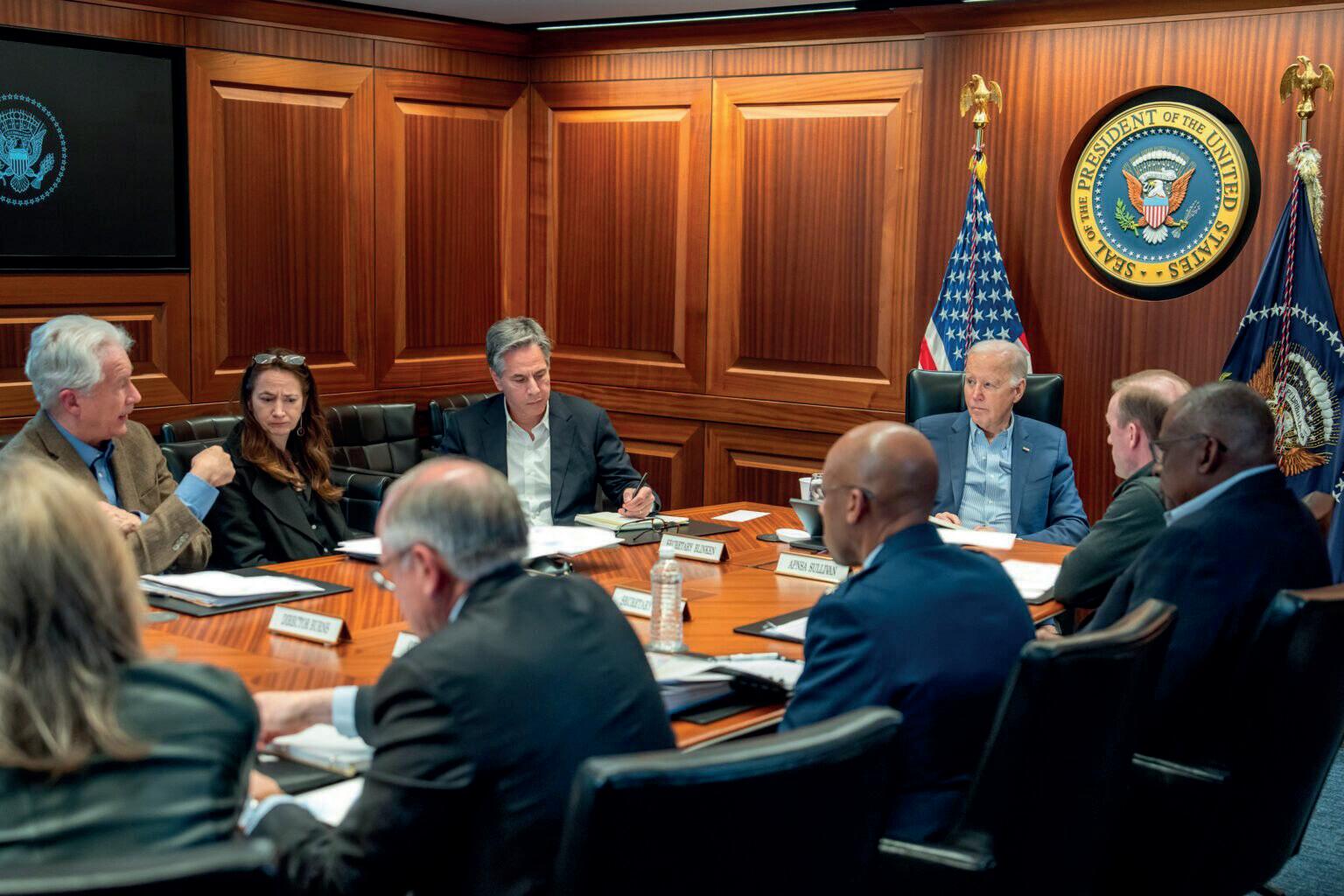
Iran. Not only was the Security Council encouraged to condemn immediately after Israel’s attack was reported but Iran’s mission to the United Nations said on 11 April 2024 that the “imperative for Iran” to retaliate for the attack on its embassy in Damascus may have been avoided had the UN Security Council condemned Israel’s airstrike.
The mission said: “Had the UN Security Council condemned the Zionist regime’s reprehensible act of aggression on our diplomatic premises in Damascus and subsequently brought to justice its perpetrators, the imperative for Iran to punish this rogue regime might have been obviated.” (“UN Security Council should have condemned Iran embassy attack in Syria - Iran’s UN mission”, www.reuters. com)
In an arena of Western double standards, blatant demonstration of imperialism and support for colonial oppression, the failure of the United Nations and the consistent violation of international treaties otherwise considered sacred, it is important to appreciate and highlight the invaluable Islamic principles on conflict resolution. Essentially, the answer to everything wrong in this world with international relations is in the Holy Quran. Only if the world paid heed.
Solidarity and conflict resolution in Islam
The Holy Quran states: “And if two parties of believers fight each other, make peace between them. […]” (Surah al-Hujurat, Ch.49: V.10)
It has been explained in the Five Volume English Commentary of the Holy Quran: “The central theme of the Surah is the solidarity of Islam. Directions and rules of
conduct which are calculated to achieve and maintain this solidarity have been laid down in it in some detail. Some of these rules have been mentioned in the preceding verses, others follow in the verses that come later. A great danger to the security and solidarity of the Muslim State or Community are the disputes and quarrels that haply might arise between different Muslim groups or parties. The verse under comment provides a most effective remedy to compose these quarrels. Primarily, the verse deals with the settlement of disputes between Muslim parties, but it equally embodies a sound basis on which a really effective ‘League of Nations’ or a ‘United Nations Organisation’ can be built. The verse lays down the following principles for the maintenance of international peace.
“As soon as there are indications of disagreement between two nations, the other nations, instead of taking sides with one or the other, should at once serve notice upon them, calling upon them to submit their differences for settlement to a ‘League of Nations’ or ‘United Nations Organisation’, as the case may be. If they agree, the dispute will be amicably settled. But if one of them refuses to submit to the ‘League’ or, having submitted, refuses to accept the award of the ‘League’ and prepares to make war, the other nations should all fight it.
“It is evident that one nation, however strong, cannot withstand the united might of all other nations and is bound to make a speedy submission. In that event, terms of peace should be settled between the two original parties to the dispute. The other nations should act merely as mediators and not as parties to the dispute and should not put forward new claims arising out of the conflict with the refractory nation, for that would lay the foundation of fresh disputes and quarrels. The terms of peace
Friday 19 April 2024 | AL HAKAM 14
President Joe Biden meets with members of the National Security Council regarding the unfolding missile attacks on Israel, Saturday, April 13, 2024, in the White House Situation Room. (Official White House Photo by Adam Schultz)
should be just and equitable with reference to the merits of the dispute; they should be confined to the original dispute between the parties and should not be allowed to travel beyond it.
“It is only such a ‘League’ or ‘Organisation’ which can safely be entrusted with the maintenance of international peace, not a League or Organisation whose very existence is dependent upon the goodwill of others.” (Five Volume Commentary, Vol. V, pp. 2961-2962)
Then, in verse 11 of the same chapter, it is said:
“Surely all believers are brothers. So, make peace between your brothers.” (Surah al-Hujurat, Ch.49: V.11)
“The verse lays special stress on Islamic brotherhood. Islam tolerates no discord or dissensions between brothers. If there happens to arise a quarrel or dispute between two Muslim individuals or groups, other Muslims are bound at once to bring about reconciliation between the quarrelling parties. Islam’s real strength lies in this ideal of brotherhood which transcends all barriers of caste, colour, or clime.” (Five Volume Commentary, Vol. V, p. 2962)
At this year’s National Peace Symposium, Hazrat Mirza Masroor Ahmad, Khalifatul Masih Vaa elaborated on the failures of the United Nations and the vulnerability of the Security Council. Huzooraa said:
“For example, the United Nations has become a weak and almost powerless body where a few dominant nations wield all the power and easily override the views of the majority. Instead of deciding each issue based on its facts and merits, nations have formed alliances and vote according to their self-interests. Ultimately, critical decisions are made by a few privileged nations in whose hands rests the veto power. Instead of faithfully serving the cause of peace and justice, they wield their veto like a trump card wherever their narrow interests are threatened, irrespective of whether their decision shatters the peace and prosperity of other nations and leads to the death and destruction of scores of innocent people. Let it be clear, therefore, that where a veto power exists, the scales of justice can never be balanced.” (“The Critical State of the World – What is the Blue Print for Peace”, 13 March 2024, www.reviewofreligions.org)
Western scramble for deescalation
Before Iran’s retaliation, the United States had asked its allies and, even its non-allies alike, to urge Iran for de-escalation in the hope that an attack on Israel could be stopped. Foreign Ministers of Germany, Britain, Australia, Turkey, France, and beyond, who were nowhere to be seen to urge de-escalation from Israel, were then calling the Iranian Foreign Minister, urging restraint. The United States also asked the leaders of the United Arab Emirates, Qatar, and Saudi Arabia to urge Iran not to retaliate. None of these efforts received any assurance. Iran maintained and indeed fulfilled its intention of retaliation, for it believes that no response at this stage would have settled Israel’s impunity even more. It takes very little to understand that the West is currently in a state of panic. Israel wants to respond to the Iranian missile and
drone attack but faces little to no backing from the West to do so, as any such attempt carries the inevitable risk of the US and allies being drawn into a conflict carrying catastrophic consequences not just for the Middle East but also the whole world. However, there should be no illusion that the US is trying to avoid a regional war for the sake of humanity. If anything is deterring and dissuading the US from finding itself fighting a war, it is the presidential election in November. Ultimately, the American interest is of concern; the American soldier cannot be hurt nor can an American base, and nor can an American voter be made more upset.
A war in the Middle East is in the American interest, though – it means billions of dollars’ worth of weapons are sold to the fighting sides, which brings revenue for the American economy and whether the American troops directly fight or not, the American land, air and sea are safe because they are thousands of miles away from the war zone. But an election year changes everything. Especially when President Biden is losing in polls and his predecessor, Donald Trump, is leading.
Hypocrisy and mischief
It is stated in the Holy Quran: “And when it is said to them: ‘Create not disorder on the earth,’ they say: ‘We are only promoters of peace.’” (Surah alBaqarah, Ch.2: V.12)
In its commentary, it has been explained:
“In the present verse, reference is made to the double-dealing of the hypocrites. Confronted with this, the hypocrites invariably pleaded that they were prompted by nothing but sincerity of purpose and that their intention was not to create ill-will but to establish mutual cordiality and peace. This is the typical defence of all mischiefmakers.
“The presence of hypocrites and malcontents is inevitable in every organised society. In a society, not properly organised, it is easy for disaffected members to leave. But in a well-organised community, the malcontents find it difficult to leave. So, they remain within and carry on their nefarious activities secretly. The presence of hypocrites is not a sign of weakness but rather of strength in a community. But this should not make a community neglectful about them. On the contrary, it is imperative that malcontents and hypocrites should be closely watched and properly dealt with, as and when circumstances require. The Holy Prophetsa was ever watchful of this class.”
(Five Volume Commentary, Vol. I, p. 50)
Justice
is a prerequisite for achieving peace
In the current state of the world, if only justice was encouraged and exercised with no ulterior interest or motive, then the deteriorating chain of events we have seen unfold specifically in the last six months would be different today.
If the caution, de-escalation, restraint and calm that the US and allies are urging now that Iran has retaliated, had they used the same diplomatic means with Israel at the start of its aggression in Gaza, we could only imagine the world we would be living in today. If Israel were stopped from
disproportionately and indiscriminately destroying Gaza and the Palestinian life there with the very means of diplomacy that is being used now with Iran and Israel, Gaza would be liveable, thousands and thousands of lives would be saved, and the precipice of catastrophe that the world stands at could have been averted.
Hazrat Mirza Masroor Ahmad, Khalifatul Masih Vaa has repeatedly emphasised the importance of shunning injustice and instead, directing efforts towards establishing justice for any hope of achieving world peace.
During his address at the National Peace Symposium UK 2024, Hazrat Khalifatul Masih Vaa said:
“As for Islam, it literally means peace, and every aspect of its teachings reflects this name. For instance, in chapter 42, verse 41 of the Holy Quran, Allah the Almighty commands that where a person or nation has been wronged, they must never respond disproportionately or stray into the realm of seeking revenge. Furthermore, Allah says that it is better to forgive if it can lead to reformation. Chapter 49, verse 10 of the Holy Quran, says that if two nations are at war, neutral parties should mediate between them and strive to establish peace based on the principles of justice and equity. If having reconciled, one party violates the terms of the agreement and again resorts to warfare, other nations should forcefully unite against the aggressor until it desists from its aggressive conduct. Once it stops, the other nations must also cease using force.” (“The Critical State of the World –What is the Blue Print for Peace”, 13 March 2024, www.reviewofreligions.org)
Further, Huzooraa stated:
“Contrary to these man-made laws, Islam’s teachings emphasise justice to such a degree that chapter 5, verse 9 of the Holy Quran states that the enmity of any nation or people must never incite one to deviate from the path of justice and fairness. Manifesting such integrity is nearer to righteousness. Even non-religious people will surely recognise the wisdom and benefit of adopting this preeminent standard of justice.” (Ibid.)
Conclusion
Each day comes with a new development. Only time will tell where and how this will end. From where the world stands, things look very concerning and for many of us feeling helpless, the one and only powerful weapon we have is prayer.
In his Friday Sermon on 5 April 2024, Hazrat Khalifatul Masih Vaa warned about the state of the world and reminded us to turn towards intense prayer. Huzooraa said:
“Now, it seems as though war is imminent, and not just imminent; it has already begun; in fact, a world war has commenced. However, the rulers of the world seem unconcerned. […] In such times, Ahmadis need to draw closer to Allah Almighty and intensify the iztirar in their prayers to escape the evil of these people. Pray for the good-natured among them as well, that they too may be saved from evil. […] In any case, we should pray that Allah Almighty saves humanity and grants us the ability to fulfil our duty toward supplications. [Amin]” (Al Hakam, Issue 317, p. 3)
<< Continued from page 12
combined issue of Al Hakam of 7 and 14 August 1911. The Gazette had stated that while Sunni and Shia instruction would be organised by the Muslim University, “groups of small numbers” like Ahmadis would manage their own religious education. He exposed what he perceived as the crux of the matter – the Muslims’ inability and unwillingness to embrace the Ahmadis as equal partners in the pursuit of Islamic revival.
“The [Aligarh Institute] Gazette’s article has given the Ahmadiyya Muslim Jamaat little cause for optimism regarding the university’s ability to foster true unity,” the esteemed editor lamented. “By explicitly stating that religious education will only cater to Sunni and Shia sects, while relegating ‘groups of small numbers’ like the Ahmadis to manage their own religious instruction, the university has effectively sown the seeds of further division.”
His critique, echoing the very words he had recorded from Hazrat Khalifatul Masih Ira, struck at the heart of the Ahmadiyya quest – a pursuit of unity that did not compromise their distinct identity as revivalists of Islam under the guidance of the Promised Messiahra. “If the university truly seeks to unite the scattered segments of the Muslim Ummah, should it not embrace the very group that has arisen to revive the true spirit of Islam?” he questioned rhetorically.
The Aligarh Institute Gazette’s response, published in its 13 September 1911 issue, sought to clarify its stance and acknowledge the inadvertent offense caused by the use of the term “Qadiani.” However, this conciliatory gesture did little to assuage the deeper concerns that had been raised.
A timeless legacy of perseverance
As the sun set on this historic discourse, the echoes of the Ahmadiyya Muslim Jamaat’s pursuit reverberate through the annals of Islamic renaissance. The unwavering dedication to upholding the true spirit of Islam, as embodied in the teachings of the Promised Messiahas, while preserving the distinct identity as Ahmadis, resonates through the ages, serving as a testament to the enduring power of faith, reason, and perseverance.
In the face of resistance and rejection from the broader Muslim community, the Jamaat’s steadfastness stands as a shining example of how even the most daunting challenges can be navigated with wisdom, compassion, and an unwavering commitment to the principles of Islam as revived by the Promised Messiahas
As the world continues to grapple with the complexities of religious pluralism and coexistence, the Ahmadiyya Muslim Jamaat’s legacy stands as a timeless reminder of the delicate balance between preserving one’s distinct identity and fostering unity within the wider community of faith. The pursuit, forged in the crucible of the late 19th and early 20th centuries, remains as relevant today as it was then –a journey towards harmony that honours the revivalist teachings of the Promised Messiahas, a quest for unity that does not compromise the sacred distinction that defines the path.
15 AL HAKAM | Friday 19 April 2024
Hazrat Ahmad’s claim to be the Promised Messiah and opposition from the religious clergy and press
Ata-ul-Haye Nasir
Al Hakam
During the late 19th century, Islam was being attacked from all sides. In British India, the Christian missionaries and the Arya Samajists were maligning the beautiful teachings of the Holy Quran and the blessed character of the Holy Prophet Muhammadsa They were publishing book after book, and their periodicals were also contributing to their anti-Islam efforts.
At that juncture, Hazrat Mirza Ghulam Ahmadas of Qadian came into the field as a defender of Islam. He had debates with the Christian missionaries in Sialkot while he was employed there in the 1860s. He wrote articles for various Indian newspapers, such as Manshur-e-Muhammadi of Bangalore, which have been compiled in the second volume of Ruhani Khazain
The likes of Sir Syed Ahmed Khan were making efforts to find ways of proving that Islam was compatible with Western thought, especially with science and philosophy. Such was the atmosphere of Islam within British India when Hazrat Ahmadas wrote Barahin-e-Ahmadiyya, the first two parts being published in 1880. He published an announcement in May 1879, wherein he told the world about the objectives of this book and gave a challenge with a reward of 10,000 rupees to be given to anyone who could refute the arguments presented in this book in favour of Islam, or even if they succeed in presenting one-fifth of his arguments to prove their respective scripture to be truthful.
Hazrat Ahmadas said that the reason behind this book was that Pandit Dayanand, founder of the Arya Samaj, had disrespected the Holy Prophet Muhammadsa, Mosesas and Jesusas, and declared the Holy Quran and Bible to be untruthful. (Majmu‘ah-eIshtiharat [2019], Vol. 1, pp. 19-20)
Christian attacks on the Holy Quran and Prophet Muhammadsa
In 1881-82, a series of articles was published in Nur-i-Afshan of Ludhiana, by Rev. GL Thakur Das, titled “Adam Zuroorat-eQuran” – The Redundancy of the Quran –and asserted that there was no need for the Quranic teachings as the other scriptures, particularly the Bible, were enough for mankind’s guidance at all times. He implied that the Quranic teachings were not compatible for every era.
Moreover, another series of articles was published by the same newspaper, titled “Wasiyyat-Nama Muhammad Sahib” –The Will of Muhammad Sahib (referring to the Hadith-e-Qirtas) in which the author asserted that the teaching brought by the Holy Prophet Muhammadsa was not perfect and wrote on 9 February 1882 that, God forbid, the Holy Prophetsa was doubtful about the Holy Quran being the Word of God and said that he did not manifest any sign and miracle in reality, and gave the example of the splitting of the moon.
Those who oppose Hazrat Ahmadas, ought to answer one simple question; while there were attacks on Islam, the Holy Quran and particularly the Holy Prophet Muhammadsa, and the Muslims seemed to be helpless in truly refuting those objections, was there not any need for a divinely guided personage who could help the cause of Islam?
The circumstances of that time and the interest of the followers of all religions in the coming of a Messiah or reformer testify to the need for a heavenly-guided personage.
Hazrat Ahmad’sas claim to be appointed
by God
In 1882, Hazrat Ahmadas published the third part of Barahin-e-Ahmadiyya, in which he mentioned various revelations received in March 1882 — the time when he was writing the Sub-Footnote Number One — including:
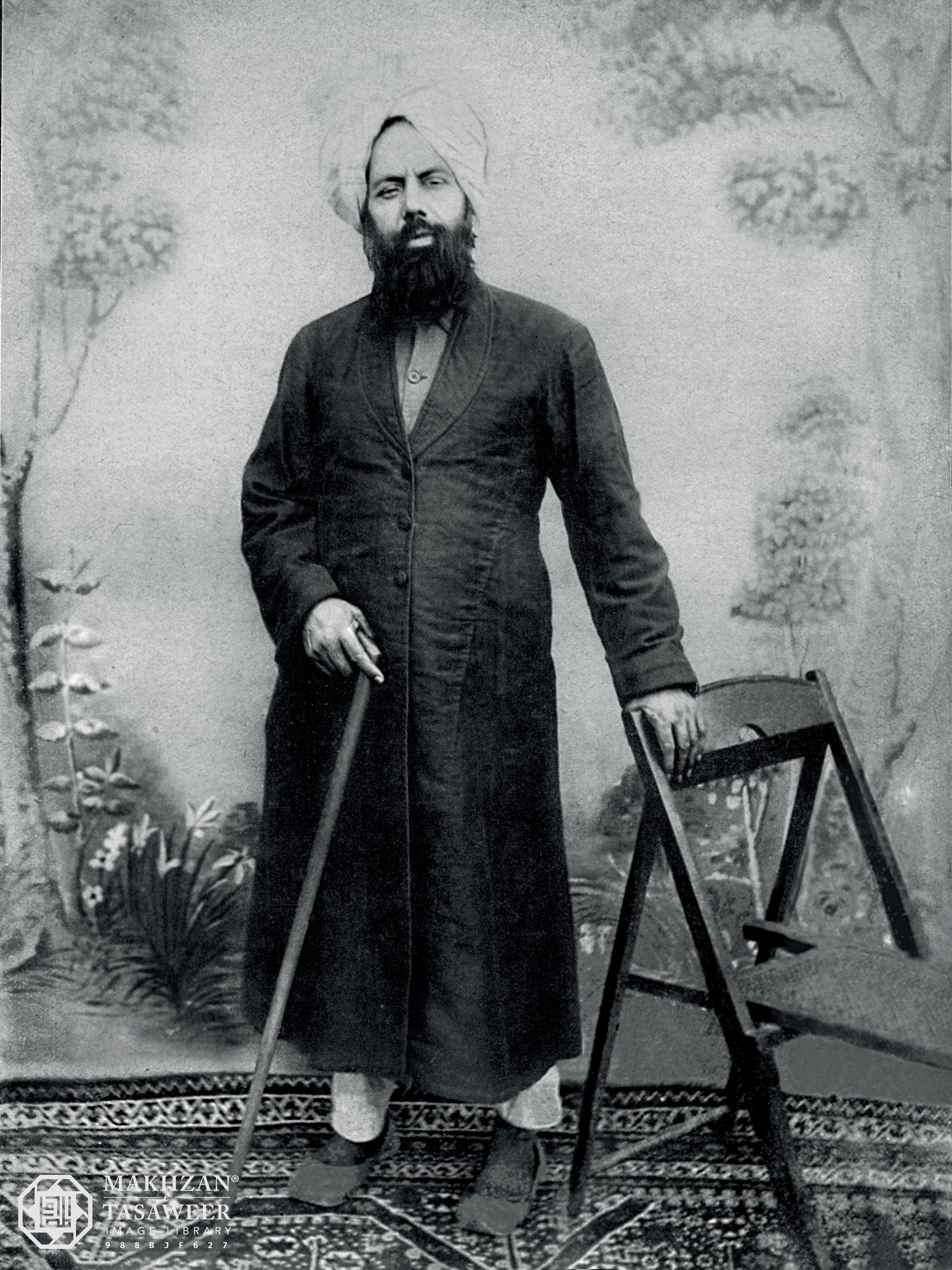
[English], Part III, pp. 207-209)
“Allah has placed blessing in you, O Ahmad. Whatever you did let loose, it was not you but it was Allah who let it loose. Allah has taught you the Quran so that you should warn the people whose ancestors have not been warned, and that the way of the guilty ones might become manifest. Say: ‘I have been commissioned and I am the first of the believers.’ [...] Every blessing is from Muhammad, peace and blessings of Allah be upon him. [...] Allah is the God who has sent His Messenger and His Appointed One with guidance and the True Faith so that he should make this faith prevail over all diverse faiths.” (Barahin-e-Ahmadiyya
Edicts from Muslim clerics of Ludhiana and Amritsar
Maulvi Muhammad Hussain Batalwi, in his review of Barahin-e-Ahmadiyya, mentioned the edicts of kufr which were issued by some Muslim clerics in relation to the revelations mentioned by Hazrat Ahmadas, and wrote:
“Some Muslims of Amritsar declare these revelations to be unauthentic, impossible and unacceptable, and the others from Ludhiana declare it categorical kufr [infidelity]. The reason presented by the first party (Amritsari Muslims) is that the divine revelation (which is equivalent to wahi) cannot be – and has not been till this day
– received by anyone except Prophets. [...] Whereas the reason presented by the second party (Muslims of Ludhiana) behind their edict of kufr is that the author has claimed to be a prophet in these revelations.” (Ishaatus-Sunnah, Vol. 7, No. 6, pp. 171-172)
Second Coming of the Messiah: Physical or Spiritual?
It is interesting to mention here that the Christian newspaper Nur-i-Afshan of Ludhiana published an article and mentioned that there are some who say that the second coming of the Messiah will be spiritual, not physical. The article then goes on to present the opposite perspective.
(Nur-i-Afshan, 12 October 1882, Vol. 10,
Friday 19 April 2024 | AL HAKAM 16
،ىمَرَ هِلَّٰلِا نَكُلَوَ تْيْمَرَ ذْإِ تْيْمَرَ امَ ،كَيْفَ هِلَّٰلِا كَرَابِ دْمِحِأَ ايَ نَيبُتَسِتَلَوَ ،مهُؤُابِآ رَذَنَّأَ امَ امَوقَ رَذَنَتَلَ ،نَآرٍقُلَا ملْعْ نَمِحِرِلَا لٍكُ۔۔۔نَينَمَؤْمِلَا لُوَأَ انَّأَوَ تُرِمَأَ ي إِ لٍقَ نَيمَرِجْمِلَا لٍيْبُسَ لٍسَرَا یۡۤذَلَا وهُ۔۔۔ملْسَوَ هِيْلْعْ هِلَّٰلِا ىلْصْ دْمِحْمَ نَمَ ةَكَرِبِ هِلْكُ نَيَدْلَا يلَعْ هُرِهُظۡيْلَ قِّحْلَا نَيَدْوَ یۡۤدْهُلَابِ هِلَوسَرَ
No. 41, pp. 323-324)
Conclusion of the 13th century after Hijrah
The Evening Standard of London wrote, “We are on the eve of a critical period for the Islamic world. Next November will close the thirteenth century of the Hegira, when, according to the promise of the Prophet, a time of revival and regeneration is to dawn. ‘At the end of every hundred years,’ so runs the Hadith, or sacred word dictated by Mahomet himself, ‘God will send a man to restore to the Mussulman world the splendour of its religion.’” (The Evening Standard, 29 August 1882, p. 5)
“Of no small interest at the present crisis is the succeeding article on ‘The Coming of the Mahdy’—the Mahometan Messiah, to whose advent pious Moslems look forward to inaugurate the ultimate triumph of their creed.” (Taunton Courier and Western Advertiser, 6 September 1882, p. 3)
“As the Jews long for the advent of the Messiah, so have the Mahomedans looked forward to the coming of El Mehdi, the last of their series of prophets.” (The Madras Weekly Mail, 18 October 1882, p. 29)
An Irish newspaper wrote, “Mussulman prophets generally agree that the 1,300 of the Hegira will be marked by events of the utmost importance to Islam. This year begins on the 12th November, and orthodox Mahommedans will be on the lookout for portents of all kinds.” (The People’s Advocate and Monaghan, Fermanagh, and Tyrone News, 18 November 1882, p. 2)
The Nur-i-Afshan published an article, titled “Tehrawin Sadi ka Ikhtitaam aur Maujooda Islam” – Conclusion of the 13th century and contemporary Islam.
The article stated that it was a very important day in Islam; the 13th century had concluded according to the Muslim lunar calendar. The next day would be the first of Muharram and the 14th century would commence.
The article stated that the Muslims were awaiting the conclusion of this era and had many hopes for the upcoming one. It mentioned that the Muslims also believed that after the conclusion of this era, a messenger and Mahdi would appear, purify Islam and defeat Christianity.
The article said that the Muslims, however, turned their attention towards certain temporal hopes and aspirations and it was as if they had forgotten the hopes regarding the 14th century. (Nur-i-Afshan, 20 December 1883, Vol. 11, No. 51, pp. 403404)
Hazrat Ahmad’sas claim to be the Mathil-e-Masih
In Barahin-e-Ahmadiyya, Hazrat Ahmadas mentioned the second coming of the Messiah and said:
“But it has been revealed to my humble self that on account of my meekness, humility, trust in God, sincerity and the Signs and [heavenly] light, I resemble the Masih in his previous life; and that the nature of this humble one and the nature of the Masih greatly resemble each other, as if they are two pieces of the same jewel or two fruits of the same tree. The harmony between us is of such a great extent that there is very little that the spiritual eye can
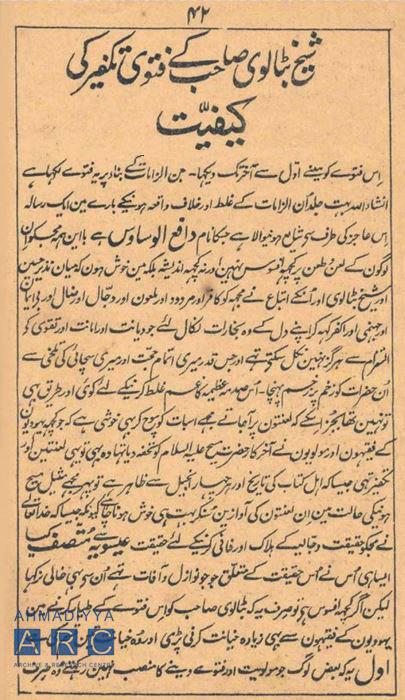
distinguish between us. [...]
“Since my humble self has a complete resemblance with Hadrat Masih, the Benevolent God has from the beginning included this humble one in His prophecy about the Messiah. That is, Hadrat Masih is the overt and physical manifestation of the above-mentioned prophecy, and this humble one is the spiritual and rational application; meaning that, the spiritual supremacy of the religion of Islam which depends upon irrefutable proofs and manifestly valid arguments would be, as is destined by God, brought about by this humble one either in my lifetime or after my death.” (Barahin-e-Ahmadiyya [English], Part IV, pp. 374-375)
In 1891, after being revealed by God Almighty, Huzooras announced that he is the Promised Messiah who was prophesied to come in the Latter Days. Its details will be narrated later in the article.
Hazrat Ahmad’sas challenge in 1885 and response from religious clergy
In March 1885, Hazrat Ahmadas published an ishtihar and sent 8000 copies of registered letters in Urdu and English to the religious leaders, scholars and leaders of Asia, Europe and America, informing them of his claims and inviting them to come and witness the truthfulness of Islam at Qadian. (Majmu‘ah-e-Ishtiharat [2019], Vol. 1, pp. 30-32; Maktubat-e-Ahmad [2019], Vol. 1, pp. 51-53)
Response from Rev. Imaduddin
On 19 March 1885, a Christian newspaper, Nur-i-Afshan of Ludhiana, published an article by a Christian missionary Imaduddin, under the heading “Jawaab Ishtihar Maulvi Ghulam Ahmad Sahib Raees-e-Qadian Gurdaspur” – Response to the announcement of Maulvi Ghulam Ahmad Sahib, Chief of Qadian, Gurdaspur – in which he stated:
“The said Maulvi Sahib has sent that registered ishtihar to me as well. I am publishing its short response in Nur-iAfshan so that all people may be aware of my response. The gist of that ishtihar is that the religion of Islam and Quran is from
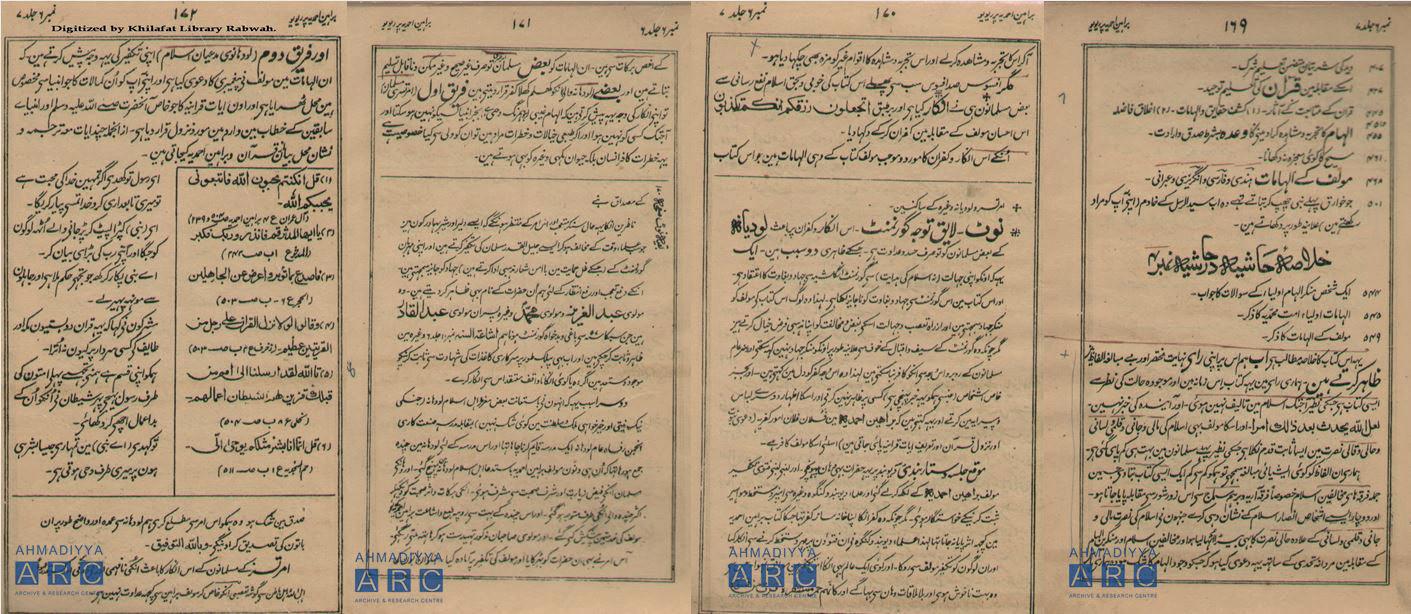
God. If anyone has any doubt about this, they ought to come to the Maulvi Sahib and stay for a year, during which he would manifest some miracles testifying to the truthfulness of Islam. In case of witnessing it, the visitor becomes a Muslim, otherwise, leaves after receiving the settled amount of money. And that God has informed him that the people who would not pay heed to the Truth after receiving the letter would be guilty, dumbfounded and defeated. He published this ishtihar in Urdu and English and sent it to the missionaries in both India and England. My response is that we are not only undoubtful about the truthfulness or untruthfulness of Islam, but also have a firm belief that Islam and the Quran are not from God at all. We are claimants of its untruthfulness, instead of having any doubt about it, as to come to you to alleviate it.”
(Nur-i-Afshan, 19 March 1885, Vol. 13, No. 12, p. 95)
He further mentioned Barahin-eAhmadiyya and said that it had nothing which needed to be pondered over. He then mocked Hazrat Ahmadas and his claims, as is the practice of opponents of all Appointees of Allah the Almighty, and used foul language as well. (Ibid.)
Response from Rev. GL Thakur Das
Then, on 2 April 1885, the same newspaper published an article by another missionary, GL Thakur Das, under the same heading. The author wrote:
“The letter and ishtihar about Barahine-Ahmadiyya, both in Urdu and English, from respected Mirza Sahib has reached my humble self as well. He has sought a nice method to publicise Barahin-e-Ahmadiyya Mirza Sahib has made the following claims in those writings:
“Firstly that he has been appointed as the Reformer of this Age, in likeness to the Messiah, so that he could reform the morals of mankind, and that his spiritual attributes are similar to those of Jesus Christ. Moreover, he has been granted a higher status than other auliya, who came before him, due to his obedience to Muhammad[sa] Sahib, and hence, in his obedience is goodness and harm in opposition.
“Secondly, the objective behind his divine appointment is to inform mankind that there is only one religion in accordance with the Will of God, meaning Islam, and Al-Quran is His Word.
“Thirdly, to prove these two promises, he has authored Barahin-e-Ahmadiyya, after having revelation from God Almighty and being appointed by Him, and there is a reward of 10,000 rupees for refuting it.
“Fourthly, anyone who is doubtful
about the truthfulness of Islam, may come to Qadian and stay there with him for a year and witness miracles, and come with an intention to accept Islam.” (Ibid., No. 14, pp. 107-108)
He then goes on to object to the arguments presented in Barahin-eAhmadiyya and uses foul language against Hazrat Ahmadas. (Ibid.)
Response
from Rev. Abdullah Athim
On 16 April 1885, the same newspaper published a letter from Abdullah Athim, under the heading “Aik Zuroori Khat” – An important letter – in which he wrote:
“Mirza Ghulam Ahmad Sahib, Chief of Qadian, has claimed to manifest his signs under the banner of Islam, provided one ponders over him [i.e., his claims] with the condition of accepting Islam [upon witnessing the truth], and about this he has published announcements in Urdu and English and sent far and wide. And he has also cautioned that anyone who would not accept this challenge of Mirza Sahib, would be defeated. Now, I wish that you also publish whatever has ‘settled’ between me and Mirza Sahib, I will be thankful to you.” (Ibid., No. 16, p. 124)
He then elaborated on the said ‘settlement’ and stated that Mirza Sahib has ‘agreed’ for him to present three objections to the teachings of the Holy Quran, and said that if Mirza Sahib refutes all these objections and manifest a sign, he would accept the Holy Quran to be the Word of God.
He further wrote:
“I firmly believe that the claim of Mirza Sahib about manifesting a sign is in fact based merely on a hidden strategy and is not truthful. Moreover, I cannot acknowledge a faith which is miracle-seeking or based on a certain criterion to be a [true] faith, by compromising my principles. And Mirza Sahib does not agree to manifest a sign unconditionally, thus, I would wait for myself to be defeated if he does not fulfil my conditions, since, at last, I will surely overcome him.” (Ibid., pp. 124-125)
In later years, it was clear as to who stood victorious and who got defeated. There is not much space to narrate all those details here, however, the historical facts speak for themselves.
Another point that must be noted here is that, firstly, he did not agree with the method proposed by Hazrat Ahmadas in seeking the truth, and secondly, the objections raised by Athim against the Holy Quran have been dealt with and refuted by Hazrat Ahmadas in his multiple books written in the later years, and obviously in his early
17 AL HAKAM | Friday 19 April 2024
work Barahin-e-Ahmadiyya as well. He has always highlighted the magnificence and perfection of the Holy Quran.
The editor wrote a note at the end that they have published the responses from the above-mentioned three Christian missionaries and are receiving many more as well. However, he appealed that no more letters be sent, as he asserted, that Mirza Sahib was publicising his book through these announcements. (Ibid., p. 125)
These Christian missionaries did not truly accept the challenge posed by Hazrat Ahmadas and refrained from seeking the truth in accordance with the method suggested by Hazrat Ahmadas. Though a few clergymen, like Indarman Moradabadi and Pandit Lekhram, initially showed a willingness to accept the challenge, the later incidents exposed their real intentions.
For more details on this whole episode, see Tarikh-e-Ahmadiyyat, Vol. 1, pp. 253264, and Chapter 8 of Life of Ahmadas.
Charles Bradlaugh
Mentioning this challenge, The Toronto Daily Mail reported on 5 June 1885, under the heading “To Convert Bradlaugh”: “Mr Charles Bradlaugh, the famous infidel, who is always elected as a member of Parliament for Northampton, and always rejected by the House, has now an opportunity of getting converted, and of making handsome wages during the process. The offer comes from Prince Mirza Gholam Ahmed, C.I.E., an Indian potentate of fabulous wealth, and a Mohammedan of great proselytising zeal. The Prince has read Mr Bradlaugh’s works sympathetically, and believes that with a proper course of teaching by Moslem sages, he would become a bright and shining light of Islamism. The Prince proposes, therefore, that Mr Bradlaugh shall come to the former’s domains in the Punjab, and shall put himself under tuition with a view to his conversion. The Prince agrees to furnish the neophyte with a suitable palace and a retinue of servants, to provide for all his household expenditures, which shall be on a scale of magnificence consistent with the honour due to a Prince’s guest, and to furnish him an allowance of 200 rupees per month during the entire process of conversion. Mr Bradlaugh is said to be seriously considering the invitation, although he says that the task of getting converted would probably be a life-long job.”
In 1886, Hazrat Ahmadas once again invited the religious clergy, including Lekhram, Athim, Imaduddin, Thakur Das, and Jeevan Das, and wrote that instead of one year, they should stay at Qadian for 40 days to witness a sign in favour of Islam, and in case no such sign is manifested, they would be rewarded 500 rupees. (Surma-eChasham-e-Arya, Ruhani Khazain, Vol. 2, pp. 309-310)
Establishment of Ahmadiyyat
In 1889, when Hazrat Ahmadas established the Ahmadiyya Muslim Jamaat and then claimed to be the Promised Messiah, it was as if the whole world had begun to oppose him. The Muslim clerics as well, instead of joining his efforts in the service of Islam, turned into staunch enemies. The foremost among all those opposing clerics were
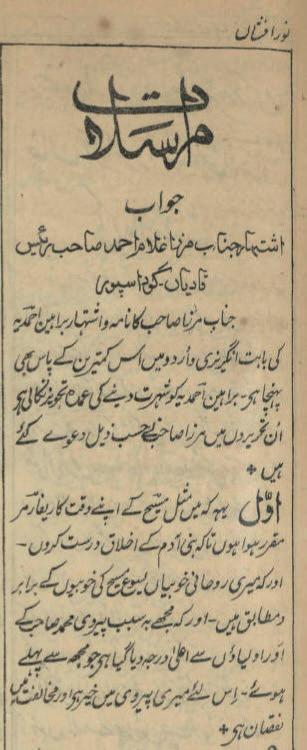
Batala.
An article by Nizam-ul-Mulk of Moradabad, 1891
When the Promised Messiahas published his book Fath-e-Islam (The Victory of Islam), the Nizam-ul-Mulk of Moradabad published an article on 31 December 1890, about which the Indian Newspaper Reports stated under the heading “Mirza Ghulam Ahmad, Kadian, Gurdaspur, Punjab”:
“The Nizamu-l-Mulk (Moradabad), of the 31st December, received on the 10th January, refers to an Urdu pamphlet, called the Fatah-i-Islam, i.e., the victory or triumph of the Muhammadan religion, which has been written by one Mirza Ghulam Ahmad[as], Kadian, Gurdaspur district, Punjab. The Nizamu-l-Mulk republishes from the pamphlet the preface in which the author complains of the alleged spread of heresies and vices among the Musalmans, and of the alleged insults offered and injuries done to the Muhammadan religion by the Christians, particularly referring to the alleged performance of the drama called Mahomet. The Mirza represents himself to be a prophet and declares that he has been sent by God to save the Muhammadan religion from the attacks of Christians, to remove the vices which prevail among the Musalmans, and to again raise Islam to the high position which it once occupied. He will have no occasion to use arms, but will carry out his mission with the aid of the pen and his tongue.” (Selections from the Vernacular Newspapers Published in the North-Western Provinces, Oudh, Central Provinces and Rajputana, 1891, No. 2, pp. 27-28)
This article was then mentioned by
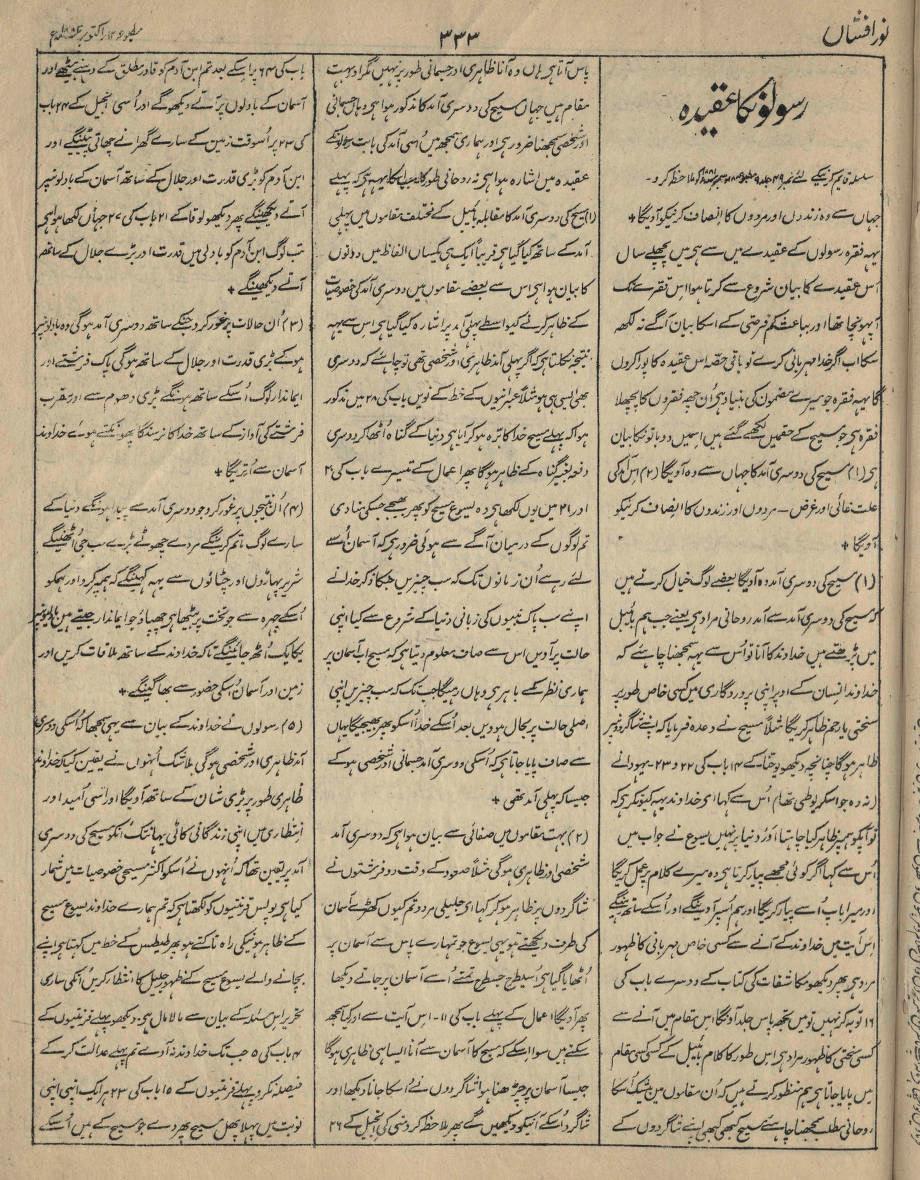
the Akhbar-i-’Am of 19 January 1891 as well. The Nur-i-Afshan of 29 January 1891 mentioned the article of Akhbar-i-’Am and used inappropriate comments:
“
Akhbar-i-’Am of 19 January narrates that ‘Mirza Ghulam Ahmad Qadiani is a strange man. According to a newspaper of Moradabad, he claims to be the Promised Messiah. He also says that its preaching to the whole world is incumbent upon him. He has written this in a book, which he has authored and published, entitled Fathe-Islam. We call the attention of the Nuri-Afshan newspaper to deal with Mirza Sahib.’” (Nur-i-Afshan, 29 January 1891, p. 2)
The Nur-i-Afshan went on to use inappropriate language against the Promised Messiahas and said that according to the Gospels, his claim is false. (Ibid.)
Hazrat Ahmad’sas claim to be the Promised
Messiah
On 26 March 1891, Hazrat Ahmadas published an announcement, titled “Zuroori Ishtihar” — An important announcement, and wrote that God Almighty revealed to him the reality of the coming of the Masih Ibn Maryam about which he had briefly mentioned in earlier works such as Fath-eIslam and Taudih-e-Maram and with much details in Izala-e-Auham as well. Huzooras further said:
“I declare it aloud that God Almighty has revealed the truth upon me through His revelation and inspiration, and the truth which He has opened to me is that, in reality, Masihas Ibn Maryam has passed away and his soul is in the second heaven along with his cousin Yahyaas. I am the spiritual Messiah who was to come in this era whose glad tiding is present in the authentic ahadith.” (Majmu‘ah-e-Ishtiharat [2019], Vol. 1, pp. 221-222)
In Izala-e-Auham, Huzooras mentioned that his claim to be the Mathil-e-Mau‘ud was not a new one, as he had already mentioned it in Barahin-e-Ahmadiyya. Huzooras also mentioned some of his Arabic revelations, which were published in the third part of Barahin-e-Ahmadiyya, and said:
“Yes, in Barahin, it was not stated – on the basis of any revelation – as to what is the reality of the coming of Hazrat Masih Ibn Maryam, which people were awaiting, as to whether the same [Messiah] would really descend from the heaven onto the earth while placing his hands on the shoulders of angels. But rather, whatever I have written
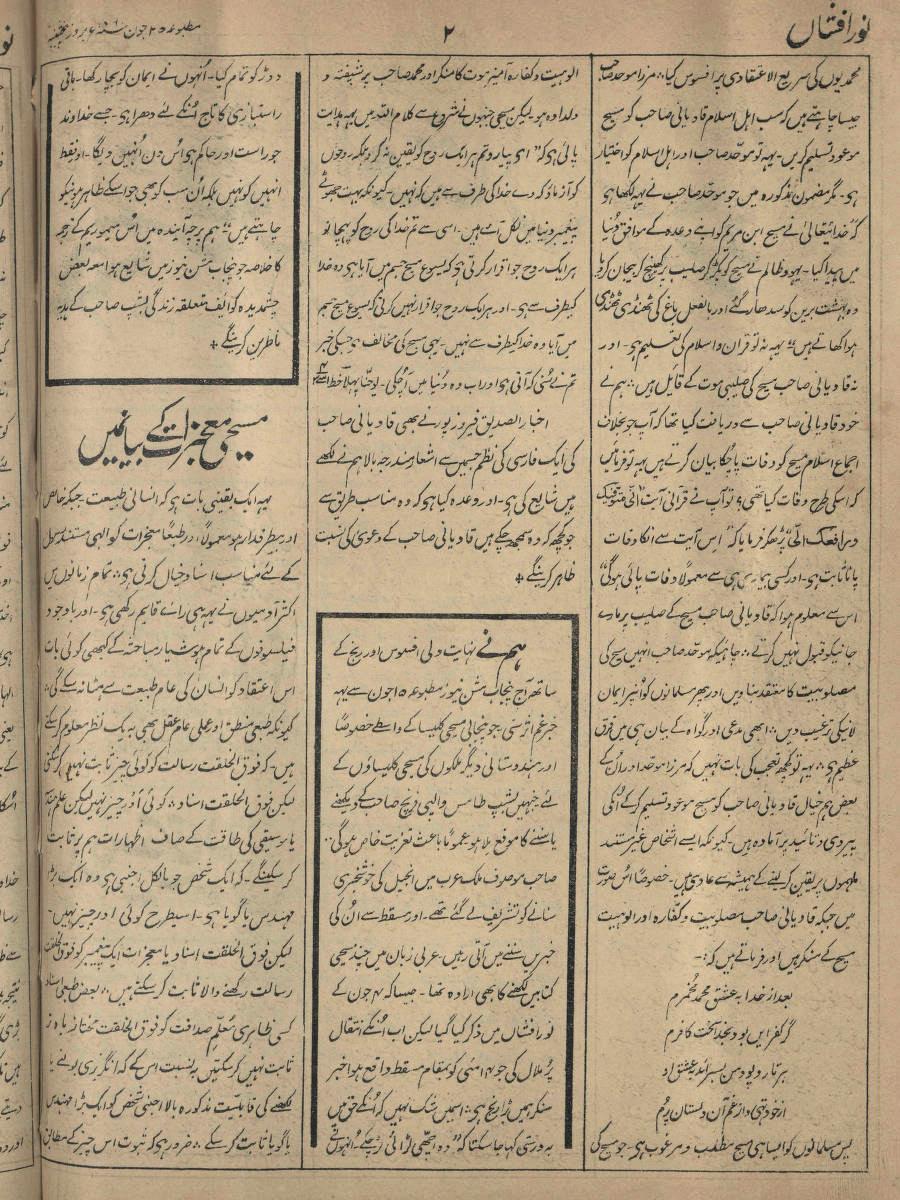
in Barahin in regards to the second coming of Masih Ibn Maryam to this world, is with respect to a well-established belief towards which our Muslim brethren are inclined these days. So, with respect to this apparent belief, I had written in Barahin that I am only the Mathil-e-Maud. [...]
“Those who receive revelations from God Almighty do not speak without being permitted, do not understand until they are granted understanding, do not make any claim without His command, and cannot show any boldness on their own. [...] So in accordance with this, no debate was initiated on my own in Barahin in relation to Masihaas Ibn Maryam. Now that God Almighty has revealed to me the reality of this matter, it is essential for me to publicly announce it. [...]
“Moreover, I have so many certain and absolute proofs in regards to the death of Masih Ibn Maryam that there is not enough space in this short booklet to narrate their details. Firstly, you ought to ponder over the Holy Quran and see with open eyes how clearly and categorically it is telling us about the death of Jesus Son of Mary.” (Izala-eAuham, Ruhani Khazain, Vol. 3, pp. 192224)
An invitation to the Christian clergy and their response
On 20 May 1891, the Promised Messiahas published an ishtihar titled “Ishtihar Ba-Muqaabil Paadri Sahibaan” — An announcement regarding the Christian missionaries, at the beginning of which he mentioned verse 83 of Surah al-Maidah, verse 20 of Surah Muhammad, and verses 21 and 22 of Surah an-Nahl, and wrote:
“In these above-stated verses, God Almighty has declared the death of Hazrat Masih Ibn Maryam and all those people who were falsely and unrightfully believed to be worshipable. In reality, this argument alone is far stronger than millions of arguments in order to nullify those who worship the creation, as in the holy personages and people who they made ‘god’, have passed away, and now they are dead, not alive. If they were God, they would not have died. [...]
“All Christians unanimously agree that if anyone could prove that after death, Masih Ibn Maryam remained dead, they would instantly leave the religion of Christianity, but alas, our clerics of the past did not pay heed to this point against Christians,
Friday 19 April 2024 | AL HAKAM 18
Maulvi Nazeer Hussain of Delhi and Maulvi Muhammad Hussain of
whereas, this one debate alone would have ceased all debates. [...]
“Unfortunately, the Muslims and Christians have made a notion, contrary to the Word of Allah, that the Messiah has been alive in heaven for a long time. Undoubtedly, if this pillar is broken, as a result of the eradication of this false notion, the face of the world would instantly be purified from the worship of creation, and all of Europe, Asia and America would join the same religion of Tawhid and live amicably. However, I have thoroughly tested the Muslim maulvis of the present time, they are furious upon the breakage of this pillar and are in fact supporting the worship of creation. I informed them of the commandment of God Almighty, but they did not accept it. Now I take this invitation, with the aim of presenting this pure gift and addressing the Christians. [...]
“What else is the dispute with these people, except the fact that the Messiah is not alive? If this one-minute point is settled, these people would join us like brothers, and there would be Islam everywhere in Europe and Asia. Hence, I am sending this gift of ishtihar to the Christian missionaries, with great respect and humbleness, that God Almighty has revealed to me that Hazrat Masihas Ibn Maryam has died forever, and I have so many proofs that a just person would have no option other than to accept it.” (Majmu‘ah-e-Ishtiharat [2019], Vol. 1, pp. 240-242)
Response from GL Thakur Das
On 11 June 1891, Nur-i-Afshan of Ludhiana published an article by GL Thakur Das, titled “Jawaab Ishtihar Mirza Ghulam Ahmad Sahib Qadiani” — Response to the announcement of Mirza Ghulam Ahmad Sahib Qadiani, in which he, as his practice, used foul language and mocked the Promised Messiah’sas claims and revelations. (Nur-i-Afshan, 11 June 1891, pp. 6-7)
An article by Safir-e-Deccan quoted in Nur-i-Afshan
On 25 June 1891, the Nur-i-Afshan of Ludhiana published an article and wrote: “Safir-e-Deccan has published the views of Mirza Mohid — owner of the Akhbar Wazir-e-Hind — in regards to the Promised Messiah, which he wrote in his newspaper, with amazement and wonder, titled ‘Khushkhabri-e-Masih-uz-Zaman’ [glad tiding of the Messiah of the Age], and we too, upon reading, regretted upon the Muslims who believe in certain things hurriedly. Mirza Mohid Sahib wishes for all followers of Islam to accept [Hazrat Mirza Ghulam Ahmad Sahibas] Qadiani as the Promised Messiah. This is the right of Mohid Sahib and the followers of Islam, however, the point which Mohid Sahib has mentioned in his said article that ‘God Almighty send Masih Ibn Maryam in the world in accordance with His promise, the oppressor Jews put Messiah on the cross and caused his death and he departed to the heaven, and now enjoying the cool breeze of the garden [heaven].’ This is neither the teaching of the Holy Quran and Islam, nor Qadiani Sahib is a believer of the Messiah’s death on the cross. I inquired from Qadiani Sahib that you profess the death of the
Messiah against the consensus of Islam, please tell us as to what type of death he had. In response, he recited the Quranic verse:
[I shall cause thee to die a natural death, and shall exalt thee to Myself (Surah Aal-e-Imran, Ch. 3: V. 56)] and said that his death is proven from this verse, and he would have passed away naturally due to an illness.’ It clarifies that Qadiani Sahib does not accept the Messiah’s death on the cross. Mohid Sahib should make him believe in the Messiah’s death on the cross and then advise the Muslims to believe in him. Currently, there is a difference between the statement of the claimant and the witness. It is not a matter of any wonder that Mirza Mohid Sahib and some of his like-minded people are ready to obey and support Qadiani Sahib by accepting him as the Promised Messiah, since such people are always in practice believing in unauthentic recipients of revelations. Particularly, in a situation when Qadiani Sahib is against the notion of death on the cross, atonement and divinity of the Messiah, and states:
“[Next to God, I am inebriated with the love of Muhammadsa; if this be disbelief, then by God I am a great disbeliever. (Lecture Sialkot [English], p. 69)]
“Hence, the Muslims require and like this kind of Messiah who is against the notion of the Messiah’s divinity and death as an atonement, and lover and devotee of Muhammad Sahib.”
He then quoted a verse from the Gospel (1 John, 4:1).
He continued:
“The Akhbar As-Siddiq of Ferozepur has also published a Persian poem of Qadiani Sahib, from which we have quoted the couplets above, and promised that they would express their view on the claim of Qadiani Sahib in an appropriate manner, as far as they have understood it.” (Nur-iAfshan, 25 June 1891, pp. 1-2)
Another article by a missionary
In the same issue, another article was published written by a missionary named Jaimal Singh of Khanna, district Ludhiana. He wrote that for a long time, Mirza Ghulam Ahmad Sahib[as] Qadiani has been claiming to be the recipient of revelation and nowadays staying in Ludhiana and publishing announcements from there, addressing Muslims and Christians. His claim is now to be the Messiah and the likeness of Jesus.
The tone of this article was very harsh and abusive. (Ibid., pp. 5-6)
The evergoing practice continues
We learn from the Holy Quran that all Prophets have been mocked and called out with various titles, as it is stated:
or a madman!’” (Surah adh-Dhariyat, Ch. 51: V. 53)
The same was the case when Hazrat Ahmadas announced him as God’s appointee. The people, particularly the Muslim clerics, called him a “fanatic” and mocked his claims. The press also joined their ranks in this opposition.
For instance, on 29 July 1891, The Civil and Military Gazette wrote such words for Hazrat Ahmadas and stated that “he set himself up as Christ, and has been going about preaching a new Gospel. He denies the previous coming of Christ, and has, to the utter astonishment and disgust of the native Christians and Muhammadans alike, been publicly declaring himself to be the only Christ whom God promised the world several centuries ago.”
A debate between Hazrat Ahmadas and Muhammad Hussain Batalvi
The Paisa Akhbar of 17 August 1891 reported under the heading “Mathil-e-Masih aur Ludhiana ka Mubahatha” – Mathil-e-Masih and the debate in Ludhiana – that Abu Saeed Muhammad Hussain Sahib of Lahore had a debate with Mirza Ghulam Ahmad Sahib of Qadian concerning the proof of him being the likeness of the Messiah. Paisa Akhbar reported that the debate ended harshly and without any decision. (Paisa Akhbar, 17 August 1891, p. 5)
This debate took place in July 1891 and the Promised Messiahas has narrated its details in an ishtihar (announcement), published on 1 August 1891.
When Huzooras read out his written paper, Maulvi Muhammad Hussain felt his defeat, and thus, could not control his anger and started using harsh language. Hence, he disregarded the terms and conditions of the debate. (Majmu‘ah-e-Ishtiharat [2019], Vol. 1, pp. 247-251)
A letter in Paisa Akhbar, 1891
On 7 September 1891, the Paisa Akhbar published a letter from someone, under the heading “Janaab Mirza Ghulam Ahmad Sahib” – Respected Mirza Ghulam Ahmad Sahib – which stated:
“It is a cause of huge regret that the Muslims have become the enemies of their fellow Muslims. At least I have not found any maulvi who could match Respected Mirza Sahib’s characteristics, such as dignity, morals, piousness, eminent practices, gracefulness, knowledge, sympathy for Islam, etc. He is not only a firm believer of God, but rather, he is immersed in the [love for] the Oneness of God, a staunch follower of the Word of God — the Holy Quran — from depth of his heart, a firm follower of the Messengersa of Islam – the Seal of the Prophets — and the sympathiser of Islam from the depth of his heart and life.

under debate and indulging in minor and irrelevant issues. It was as if he had saved all of his knowledge and information for that day to oppose that respected and eminent Muslim. Maulvi Sahib turned so much furious that his body in itself depicted the anger, and began to immensely impure words for respected Mirza Sahib, but rather, even for his own self as well. In fact, it was the first instance I heard the abuse and swear of ‘Zann Talaaq’ [an abuse in the Pashto language, meaning the one who gives divorce to his wife] from such a Maulvi Sahib. Moreover, he also publicised through announcements that ‘Mirza Sahib has been defeated.’ SubhanAllah! How great was Mirza Sahib’s patience and tolerance that he did not utter even a single inappropriate word, but rather, he continued to advise his companions to refrain from anger and disorder at all times. It is a regret that on that occasion, the ‘intellectuality’ of Maulvi Sahib seemed to be ignorance. O Muslims and Maulvi Sahiban! For God’s sake leave aside the internal disputes and disorder, wish for the betterment of your Faith and make efforts in this regard. Respected Mirza Sahib is, in fact, a pillar [servant] of the Faith and its great sympathiser. People do not take into consideration his sympathy and obedience to the Islamic Faith. It is unfortunate!.” (Paisa Akhbar, 7 September 1891, p. 5)
Edicts of kufr by the Muslim clerics
The Madras Weekly Mail wrote that “The Mahomedan moulvies at Lahore have publicly proclaimed” Mirza Ghulam Ahmadas of Qadian “to be a ‘Kafir.’ A document signed by all the leading moulvies in India, in which Kadian is condemned as an impostor, has also been read out in public and the people warned against his preaching.” (Madras Weekly Mail, 18 February 1892, p. 2)
“Even so there came no Messenger to those before them, but they said, ‘A sorcerer,
“Despite this, it is devastating to see that some of the Muslim maulvis have made a determination to oppose him, but rather, use immensely impure and inappropriate words for him. They do not thoroughly read his writings and do not try to understand his intentions with patience and calm. Just recently, a Maulvi Sahib from Batala had a debate with respected Mirza Sahib in Ludhiana, in essence, he ‘fought’ with him. His total emphasis was on showing off his intellectuality by leaving aside the real point
Maulvi Muhammad Hussain of Batala had collected edicts of kufr against the Promised Messiahas from around 200 clerics from all over India, including Maulvi Syed Nazeer Hussain of Delhi and Maulvi Muhammad Abdul Jabbar, and published them all in his magazine Ishaat-us-Sunnah. Muhammad Hussain also appealed to the Muslims that they should refrain from keeping any religious ties with the Promised Messiahas, should not say salaam to him, not accept his invitation or invite him to their own gatherings, and not pray behind him.
(Ishaat-us-Sunnah, Vol. 13, pp. 185-210)
19 AL HAKAM | Friday 19 April 2024
ي ا ي ا كَعُفَارَوَ كَيْفَوتَمَ
مر�مّ�ممحمدقِ�ع� خدزابعد مرفرکاسختابخددبویںاکفرگر
واقِ�ع�یَدابسرمندپووراباہر مرپُرنلستادںآغمزاوتہیدخوزا
وَا رٌحِاسَ اولَاقَ اَلا لُوسَرَ نَمَ مهُلْبُقَ نَمَ نَيَذَلَا ي ا امَ كَلَذَکَ نَونَجْمَ
Friday Sermon
Mubarak Mosque, Islamabad, Tilford, UK
22 March 2024
Ramadan and the Holy Quran
After reciting the tashahhud, ta‘awwuz and Surah al-Fatihah, Hazrat Khalifatul Masih Vaa recited verse 186 of Surah al-Baqarah and stated:
The translation of this verse is as follows:
“The month of Ramadan is that in which the Quran was revealed as a guidance for mankind with clear proofs of guidance and discrimination. Therefore, whosoever of you is present at home in this month, let him fast therein. But whoso is temporarily sick or is on a journey, shall fast the same number of other days. Allah desires ease for you and He desires not hardship for you, and He desires that you may complete the number, and that you may exalt Allah for His having guided you and that you may be grateful.” (Surah al-Baqarah, Ch. 2: V. 186)
In this verse, Allah the Almighty has outlined the importance of the month of Ramadan as being “that in which the Quran was revealed as a guidance for mankind.” In this Book, Allah the Almighty has encompassed every aspect of guidance and outlined every path for mankind to advance towards Allah the Almighty. It warns against all of Satan’s paths, gives guidance towards current and future matters, cautions against their dangers and how to be protected from them, and teaches the methods of tackling atheism. It has cautioned us against shirk [associating partners with Allah] and how one can protect themselves from it. In short, Allah the Almighty has mentioned every current, past and future matter in the Holy Quran and He has mentioned all those methods by which one can increase their relationship with God Almighty and the ways of remaining steadfast upon His guidance are all outlined in this final and complete sharia [law]. Thus, fortunate are those who make this magnificent Book their code of conduct, act accordingly and adorn their worldly lives as well as their ultimate fate. If you adopt the truth and remain steadfast upon it, you will witness the loving treatment of Allah the Almighty towards His servants.
Hence, this is the importance of the month of Ramadan, as Allah the Almighty
has revealed to us a perfect sharia during this month and in this Book, we have been taught about the obligation of fasting and various other methods of worship. If we consider its importance to be limited to the fact that fasting was made obligatory therein and that the Holy Quran was revealed during this month, then that is not sufficient until and unless we gain a deep understanding of this complete Guidance and make it our code of conduct. We Ahmadis are fortunate in that the true servant of the Holy Prophetsa, the Promised Messiah and Mahdias, has granted us this profound understanding. Hence, for this, we must read his books and commentaries so that we can understand this magnificent Book and Guidance and act upon it.
Tomorrow is also the Promised Messiah Day wherein we hold jalsas with great regularity, and expound upon the fulfilment of the Promised Messiah’sas advent according to the prophecy of the Holy Prophetsa and the promise of God Almighty; various speeches are delivered on this topic. But, the progress of faith cannot be limited to just this. Rather, it is also of paramount importance to read the literary treasures that the Promised Messiahas has granted us in light of the Holy Quran, act upon them, and make them a part of our lives, without which our faith cannot be complete. The Promised Messiahas taught us that through the divine attribute of Graciousness, God Almighty has bestowed an enormous favour upon us by revealing a scripture as noble as the Holy Quran to the Holy Prophetsa
Now, it is our duty to benefit from this and to make it a part of our daily lives. Hence, we should give special attention to this. By simply fasting, offering our daily prayers and offering some optional prayers alone, we cannot fulfil the rights of Ramadan. Rather, to read the Holy Quran carefully, to search for its commandments
and act upon them is also essential. It is necessary and of great importance to search for its commandments, and it is this very search which will make us go from being recipients of God’s graciousness to witnesses of His Divine mercy as well.
In order to show us the ways of gaining a deeper understanding of the Holy Quran, and how to derive benefit from its blessings, the Promised Messiahas has left for us countless discourses and writings, reading and acting upon which can enable us to partake of the Holy Quran’s blessings in the truest sense.
I will also be presenting a few extracts from these writings. When it comes to the importance of reciting the Holy Quran, I wish to say that it is incredibly vital, especially during the month of Ramadan, when everyone should strive to recite at least one full part [juz’] of the Holy Quran daily so that they can complete an entire reading.
During the month of Ramadan, Hazrat Gabrielas used to go over however much of the Holy Quran had been revealed up until that point, with the Holy Prophetsa. In the last Ramadan during the lifetime of the Holy Prophetsa he went over it with him twice. (Sahih al-Bukhari, Kitab fadha’ili l-qur’an, Bab kana jibrilu ya‘rudu l-qur’ana ‘ala n-nabiyysa, Hadith 4998)
Hence, every person should be mindful of the importance of reciting the Holy Quran.
The Promised Messiahas has stated with regard to the following verse of the Holy Quran:
[“The month of Ramadan is that in which this Quran was revealed.” (Surah alBaqarah, Ch.2: V. 186)]
“This is the very Quranic phrase by which the profound importance of this
month becomes evident.” In other words, this is the blessed month in which such a grand scripture was revealed. The Promised Messiahas states, “The Sufis have stated that this is the perfect month for the illumination of the heart, (meaning this is the ideal month to illumine the heart and earn God Almighty’s nearness). One experiences many spiritual visions in this month. The daily prayers purify the self and fasting ready the heart for Divine manifestations. The purification of the self means that one grows distant from the inner passions of the carnal self.” This means that one becomes far-removed from the evil and sinful thoughts that arise in their heart. And, readying the heart for divine manifestation refers to the door of visions being opened so that one may behold God. It is in this way that a person is granted nearness to God.”
The Promised Messiahas goes on to say, “this is exactly what is meant by the words:
[wherein the Quran was revealed] – and there is no doubt regarding this.” (Malfuzat [2022] Vol. 3, p. 424)
Through the blessings of acting upon the commands of the Holy Quran and through acts of worship, one can indeed achieve this station [of nearness to God].
Then, on one occasion while drawing our attention to the importance of reading and understanding the Holy Quran, the Promised Messiahas states:
“I reflected over the word ‘Quran’ and it became evident to me that this blessed word in itself contains a magnificent prophecy. The prophecy is that this book alone is the Quran, i.e., a book that is worthy of being recited, and there will be a time when this will be the case even more so than before. In the era when other books will also be recited alongside the Quran, the Quran alone shall be worthy of being recited so
Friday 19 April 2024 | AL HAKAM 20
نَارٍقُلَا هِيْفَ لُزِنَّا یۡۤذَلَا نَاضَمَرَ رِهُشَ
نُاٰرۡقُلۡاٰ ہِیۡفِ لَزِنۡاٰ
that the honour of Islam may be saved and falsehood may be uprooted; other books will deserve to be forsaken completely. This is also the meaning of Furqan [distinction]. In other words, this book alone shall stand to distinguish between truth and falsehood, and no other compilation of Hadith, or any other book for that matter, shall be equal in value or stature.”
Then, the Promised Messiahas stated:
“Now forsake all other books and read the Book of Allah day and night. Truly devoid of faith is the one who does not turn to the Quran and who remains engaged in studying other books day and night. Our community ought to become absorbed with heart and soul in studying and reflecting upon the Holy Quran and should not let themselves become overly preoccupied with studying the Hadith. It is most regrettable that the Holy Quran is not given the same attention, nor studied, as the ahadith are. At this time, if you employ the weapon known as the Holy Quran, you shall be victorious. No darkness will be able to stand in the face of this light.
“I say that in reality, this is the only weapon which is effective even now and will continue to be so. In the initial era of Islam, this alone was the weapon in the hand of the Holy Prophetsa and his Companions. Felicitation upon felicitation to those people who did not hesitate even in the slightest in holding fast to this very book as the treasure of their faith and who passionately and joyously accepted this Furqan and spiritual light.” (Tafsir Hazrat Masih-e-Mau‘udas, Vol. 1, pp. 647-648)
Explaining the fact that the Holy Quran was revealed at a time which stood in dire need of it, the Promised Messiahas states:
“The age in which the Holy Prophetsa appeared stood in dire need of a great heavenly reformer and spiritual guide, and that the teachings he brought were certainly true and met all the needs of the time and encompassed all the requirements of the age. So effective and forceful was his teaching that thousands were drawn towards the truth, and the words: ہُلّٰلاٰ الَّاٰ ہَلٰاٰ الَّ
“[There is none worthy of worship but Allah] were engraved upon their hearts. The ultimate purpose of Prophethood— which is to impart teachings that lead to salvation—was accomplished to perfection [by the Holy Prophetsa]. This is far more than what any other Prophet had ever achieved.” (Barahin-e-Ahmadiyya, [English] Parts I & II, pp. 131-136)
Thus, this final law-bearing Book came at a time when the circumstances of the time demanded for it and it purified hundreds of thousands of hearts and continues to do so till this day. Those who seek to partake of its blessings should make an effort for this.
The Holy Quran enables one to reach a stage of perfection in knowledge and deeds. It is not just based on mere claims, in fact, the actions of the pious Muslims to this day are a testament to this. In relation to this the Promised Messiahas states:
“Here it should be borne in mind that those who believe in reason alone are as defective and deficient in action, faithfulness, and sincerity of conduct, as they are deficient in knowledge, enlightenment, and certainty. Their group
has not produced any such exemplars from whom it can be proven that they are faithful and elect servants of God like millions of holy ones whose blessings were so manifested in the world that through the preaching, admonition, prayer, attention, and interacting fellowship of each one,
and continue to appear—in those who follow this Holy Word, (if one truly adheres to it then they will be able to attain these standards) but they never appear in the others. In conclusion, this proof which one can observe with one’s own eyes, is sufficient for a seeker after truth; that is,
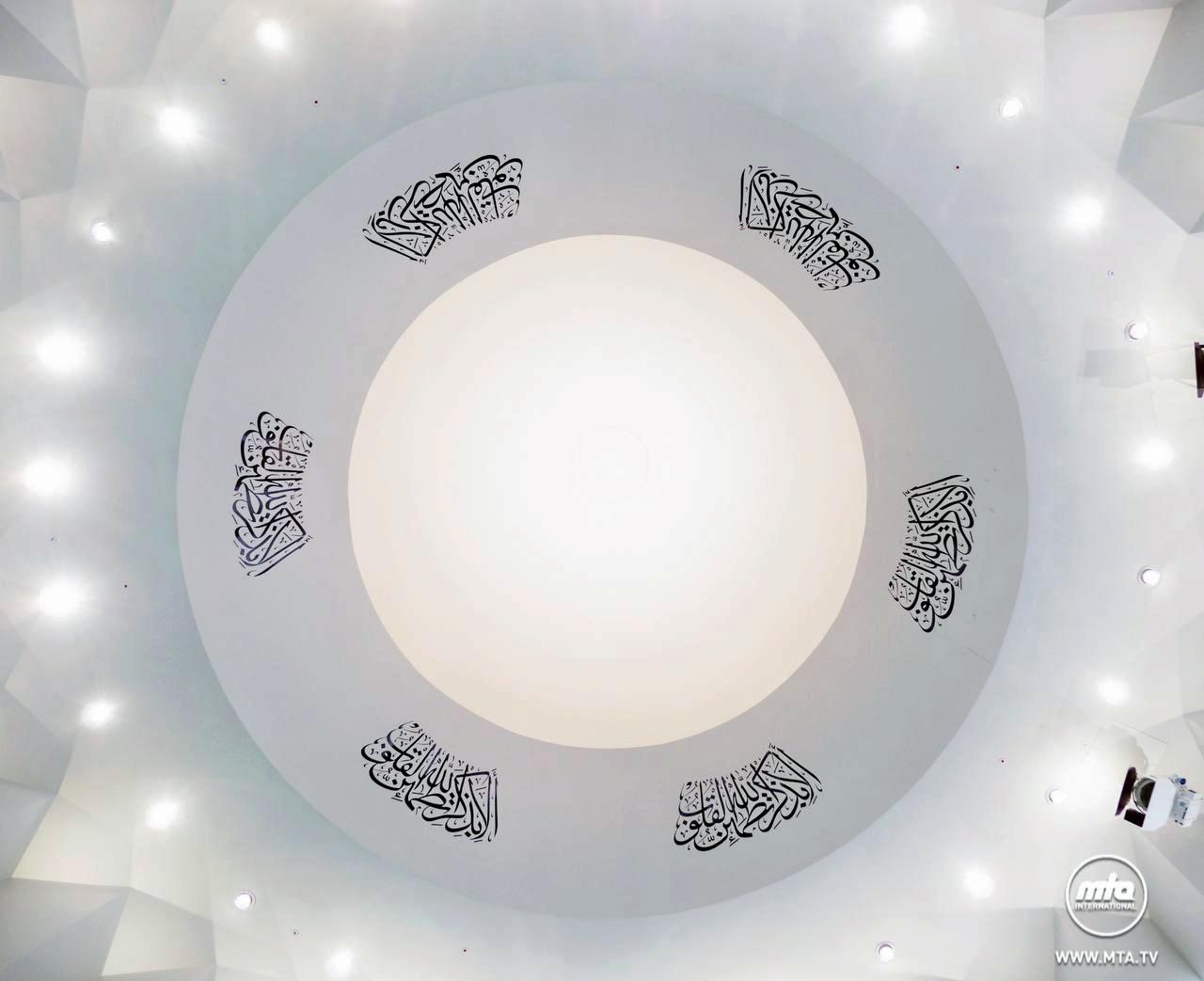
hundreds of people became pure of conduct and men of God, and completely turned to their Lord so as to pay no attention to the world and its contents. They severed themselves altogether from the delights, comforts, joys, renown, pride, properties, and kingdoms of this world, and followed that path of righteousness whereby hundreds of them lost their lives, (i.e., a passion of sacrifice was instilled in them for the sake of their faith and Lord) thousands of heads were cut off, and the earth was drenched with the blood of hundreds of thousands of holy ones. But, despite all of these calamities, they showed such fidelity that, like devoted lovers, they remained smiling while their feet were shackled, were joyful while suffering pain, and were grateful in the midst of misfortunes. They abandoned their homes out of the love for that very One [God], chose disgrace instead of honour, bore calamities instead of comfort, accepted poverty in place of wealth, and were content with indigence, isolation, and destitution over every kind of relationship, association, and kinship. They put seals [of testimony] on the existence of God by letting their blood be shed, having their heads severed, and sacrificing their lives. Through the blessing of truly following the Word of God, such special light was generated within them as has never been found in others. These people were not only found in the past; rather, this exalted group continues to appear among the followers of Islam and has repeatedly confuted and silenced its opponents by its enlightened existence. Thus, I have conclusively proven to the deniers that, just as the Holy Quran conveys one to the highest degree of perfection in the ranks of knowledge, in the same way, one also attains perfection in the ranks of conduct through it. The signs and light of being accepted by the One True God have always appeared—
of the Companions before you. When the Companions followed the Prophet of God, peace and blessings of Allah be upon him, and gave precedence to religion over worldly affairs, all of the promises made to them by Allah the Almighty were fulfilled. Initially, the opponents would mock the Companions and say that those who cannot even leave their homes with freedom claim that they shall be given kingdoms (They speak whilst in hiding and yet talk about being granted kingdoms.) However, when the Companions lost themselves in obedience to the Messenger of Allah, peace and blessings of Allah be upon him, they attained all that of which they were long deprived. They loved the Holy Quran and the Messenger of Allah, peace and blessings of Allah be upon him, and strove to obey and follow him, day and night. They would not even follow the disbelievers in their customs and traditions. (They completely abandoned them.) As long as Islam remained in this state, it enjoyed an era of prosperity and success. The secret in this was:
“[When God is yours, how can you suffer any grief?]
“The key to the victories and triumphs of the Muslims was faith as well.”
those heavenly blessings and divine signs are found only in the perfect followers of the Holy Quran, (such signs can only be seen by those who perfectly follow the Holy Quran) and all other sects who renounce the True and Holy Revelation—whether Brahmus, Aryas, or Christians—are deprived and destitute of this light of truth. Hence, I myself take the responsibility for satisfying every denier, provided such a one—being ready to embrace Islam sincerely—takes the trouble of approaching me for seeking the truth with good intention, steadfastness, patience, and sincerity.” (Barahin-eAhmadiyya [English], Part 4, pp. 91-92, Footnote 11)
Thus, whosoever seeks to attain this guidance with true sincerity, their intellectual and physical faculties shall increase. This is the claim of the Holy Quran and the Promised Messiahas announced that they should come to him to learn from him and he shall teach them.
The Promised Messiahas states:
“How grave an injustice that the nation should follow a materialistic people, and abandon the principles of Islam and forsake the Quran, which transformed savages into humans, and then humans into godly people. Those who wish to see Islam in a better state, as a living Faith, by making the Western world their ideal, (i.e. they think that the Western world has made great progress and want to follow its lead) cannot succeed. Only those will succeed who follow the Holy Quran (i.e, they will attain success in their secular life, religious life and in the Hereafter. Worldly people only have aspirations for success in this world but if one wants to attain every kind of success then that is only through the Holy Quran). Success is impossible and inconceivable if one forsakes the Quran. These people are pursuing an imaginary hope in search of success. Keep the examples
Today, those standards of faith do not exist and it is just mere claims. However, if one wants to attain this prosperity then they have to increase their level of faith. The Promised Messiahas states:
“Salah-ud-Din was confronted by a swarm of attacks, but to the very end, no one was able to defeat him. His intention was to serve Islam. Hence, for a period in time, this era prevailed. However, when Muslim kings began to follow a course of sin and impiety, the wrath of Allah Almighty struck them, and gradually they began to suffer such a decline that now you can see the current state of affairs (i.e., of the weak state of Islam). In my view, the people’s assessment of this malady is one with which I disagree. Further, the remedy that is proposed to cure this disease will prove even more dangerously harmful.” This is because their solution is that they ought to follow the Western world if they want to progress and pursue their knowledge. Indeed, one should seek knowledge but one should make the Holy Quran as their guiding principle. The Promised Messiahas further states, “Until Muslims turn to the Holy Quran, they will not develop true faith, they will not become healthy. Honour and success will only be attained on the path from which it was achieved in previous times.” (Malfuzat [English], Vol. 3, pp. 50-51)
Thus, progression in your faith and conduct will not come by following worldly people; rather, it will come by following the Holy Quran. Then, regarding Muslims becoming heedless of the Holy Quran and becoming indolent in reading the Holy Quran, the Promised Messiahas states with great anguish:
“Allah the Almighty sent the Holy Prophetsa, who came and presented that God to the world, Who the human conscience and human nature desires, and Whose complete details are found in the Holy Quran, which is the true book of God Almighty.”
21 AL HAKAM | Friday 19 April 2024
یرادغمچہیرادادخد
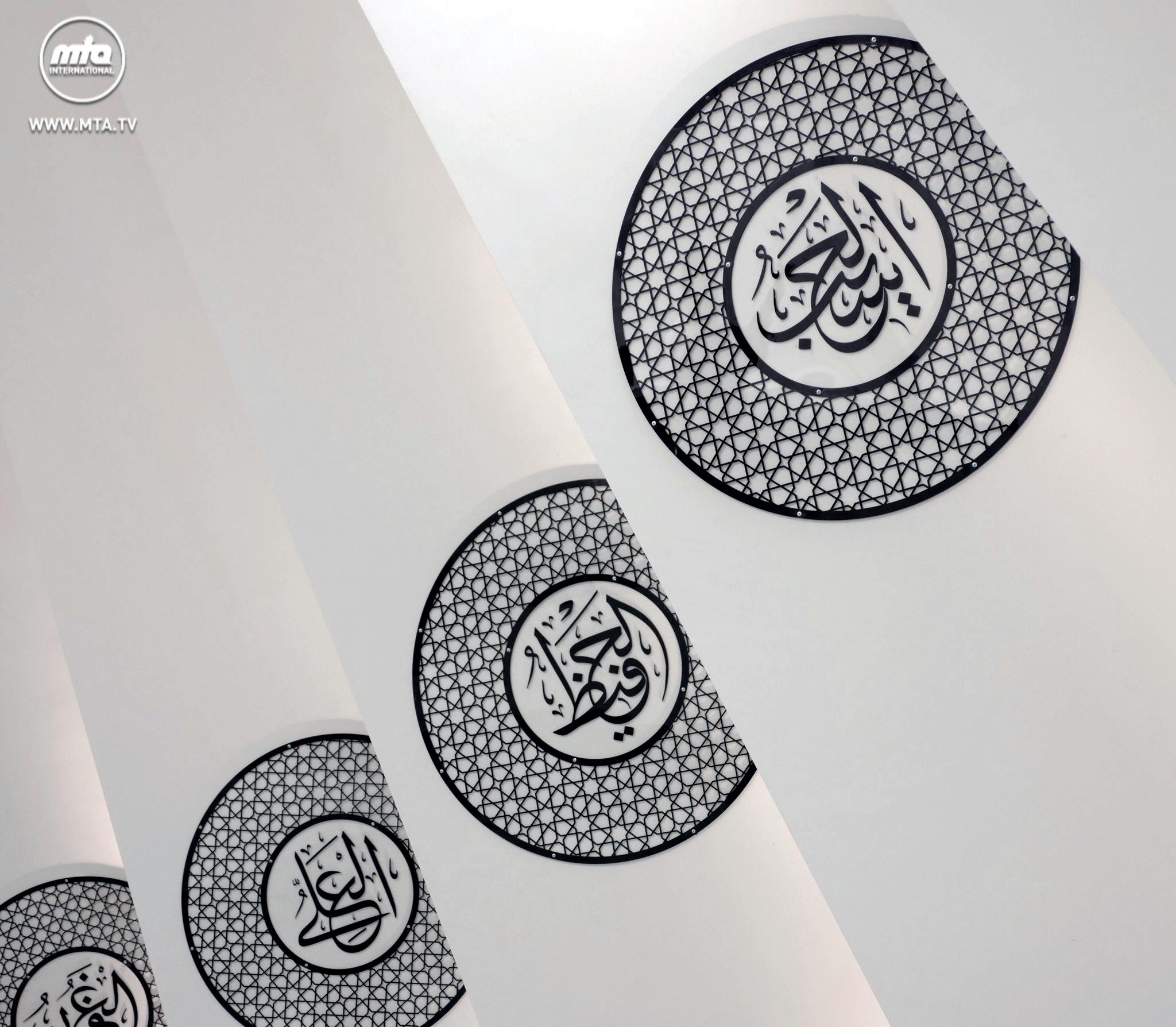
The Promised Messiahas further states, “At this time, I will separate those people who are not Muslims, and will only speak about those who are Muslim, and I only address them.
“‘O my Lord, my people indeed treated this Quran as a discarded thing.’” (The Holy Quran, 25:31)
The Promised Messiahas further states: “Always remember that the Holy Quran is the fountainhead of all true blessings and is the true path to salvation. It is the fault of these people that they do not act upon the Holy Quran. Among those who do not act upon it, there is a particular group who do not believe in the Holy Quran, and do not consider it the Word of God Almighty. These people are extremely far [from God], but those who believe that the Holy Quran is the Word of God, and that it is the means of salvation, if they do not act in accordance with it, then how strange and unfortunate a matter this is. There are many among them who haven’t even read it their entire lives. Thus, the example of such people who are completely unmindful and careless of the Word of God Almighty, is like a person who knows that such and such a fountain is incredibly pure, sweet, pleasant, and that its water is an elixir and cure for many diseases; he certainly believes in this, but despite knowing this, despite being thirsty, and being afflicted by many ailments, he does not go to the water.”
It is a fountain of such water that also quenches thirst, and is a cure, but one doesn’t go to it. How unfortunate are such people!
The Promised Messiahas further states, “So how unfortunate and ignorant are these people! They should have drank from this fountain, and upon becoming satiated, they would have attained delight from the pleasant and healing water. Yet, despite having the knowledge, they are so far away that they are completely unaware of it. They remain far from it until death comes to bring about their end (that death comes to some of them, but they do not pay attention to the Holy Quran).
“This person’s condition serves as a lesson and admonishment for us. The condition of Muslims is in this state right now. They know that the key to all this progress and advancement is the Holy Quran, upon which they wish to act, but they don’t even care about it. A person who has sympathy and is a well-wisher; and does have sympathy alone but calls them towards God’s commands and His divine will, he is called a great liar and a deceiver. What more of a pitiful state for a nation is there than this?”
Referring to the Promised Messiahas, who was sent by God in this age to spread the teachings of the Holy Quran; he is called a liar, one who forges lies [against God], and is cursed at. They are increasing their opposition. Then how much more of a pitiful condition will these people stoop to?
The Promised Messiahas states:
“The Muslims should have, and it is still necessary for them, to consider this fountain an extraordinary blessing and give it its due worth. Giving it its due worth means to act in accordance with it, and then witness how God Almighty removes their problems and difficulties. If only the Muslims understood and reflected that Allah the Almighty has created this righteous path for them, and that they should tread upon it and derive benefit from it.”
The Promised Messiahas states:
“Certainly remember, that whoever believes in Allah the Almighty with a sincere heart, and acts in accordance with His Holy Book, and obeys the Holy Prophetsa, then Allah the Almighty blesses them with innumerable blessings. Such blessings are given to them, which are far greater than the blessings of this world. One of them is the forgiveness of sins as well; that is, when they turn back and repent, then God Almighty forgives their sins. Others are completely deprived of the benefits of these blessings, because they do not even believe that sins are forgiven through repentance. Some of them even believe that whatever happens, they will be reincarnated (which is the belief of some Hindus), and forgiveness cannot be given. According to the rule of the Christians, if you commit sin after believing in the blood
of Christ, then the crucifixion cannot give you any benefit, because the Messiah will not be put on the cross twice. So then, isn’t it clear that the path to forgiveness and salvation for these two is closed because the committing of sins cannot stop? (This continues to happen; humans continue to falter.) If they do not thank God Almighty for His provision then this is a sin, and if they remain heedless, then this is a sin as well. And they will be reincarnated according to the sins they committed, or the Messiah will not be put on the cross again [to save them]. Thus, they will have to completely sink into despair. (In other religions, if sin is committed, then they must despair for there is no path to forgiveness.) But Allah the Almighty has not given this teaching to the Muslims; for them, the door to repentance is always open.
“When one turns towards Him, and after acknowledging their sins, they ask to be forgiven, and thereafter intend to do good deeds, then Allah the Almighty forgives them.
“This is why I proclaim that one should listen attentively to what I say. It should not be that you merely listen but derive no benefit from the words and they do not even reach your hearts.”
Hence, listen to these words and allow them to penetrate your hearts. Do not let them only reach the ears. The Promised Messiahas continues, “No. Rather, Listen with full attention, give these words a place in your hearts, and demonstrate that you have not listened to them superficially. Their effect should not be limited to just that moment; instead, they should have a deep impact.” (Malfuzat [1984], Vol. 7, pp. 181-183)
Their effect should not remain only in the moments that one is sitting listening to the sermon, but they should be acted upon later as well. To act upon them means to read the Holy Quran, to inculcate this habit during Ramadan, to make it a lasting part of one’s life, and to act upon its teachings.
An allegation is raised against Ahmadis that, God forbid, we alter the Holy Quran. Nowadays, lawsuits are brought against Ahmadis under this very law by the clerics in Pakistan. I shall quote directly from the words of the Promised Messiahas who states:
“The Holy Quran is the means of receiving the divine law and salvation. Altering this would be a severe sin. How peculiar would it be that we raise the very same allegation against the Jews and Christians but then treat the Holy Quran in the same manner? I am further disappointed and astonished that the Christians – whose book is actually altered and interpolated – try to prove that it has not been changed, whereas we ourselves are worried about making alterations.” That is to say, those whose books and older scriptures have been altered, claim that they have not been distorted, whereas our own actions, etc. are such that we are making alterations. The Promised Messiahas continues, “A liar is impure and wicked. (The Promised Messiahas presented his own point of view and stated that you claim that the Holy Quran has been altered?) Impure and wicked is a liar, and to alter the words of Allah Almighty is also a form of lying, so one should refrain from it.” (Malfuzat [1984], Vol. 7, pp. 168-169)
Therefore, our teaching is that one
should abstain from any sort of alteration in the Holy Quran, for the one who makes alterations is impure and wicked. Hence, those who raise allegations against us should understand that would we wish to be counted among the impure and wicked by making alterations?
With regards to the Holy Quran being a perfect book, the Promised Messiahas states:
“I am dedicated to the service of the Quran, the Quranic commandments and the pure religion of the Holy Prophetsa, and have devoted my entire life to this path. Moreover, I firmly believe that salvation is not at all possible without the Holy Quran—which is the perfect, complete, and comprehensive Book—and without its perfect obedience, and without following the Holy Prophetsa. I believe that anyone who adds or subtracts anything from the Quran or refuses the yolk of obedience of the Holy Prophetsa, is an infidel and an apostate.” (Malfuzat [English], Vol. 10, p. 394)
Thus, this is a response to all the allegations that they [opponents] level against us. The Promised Messiahas then says that one can discover the path to salvation from the Holy Quran and is illumined by means of it. The Promised Messiahas made it absolutely clear that there is no other book through which one can attain guidance and be illumined aside from the Holy Quran.
The Promised Messiahas states:
“The true guide is the Holy Quran. By following the Holy Quran, the paths to salvation are illumined and one reaches the loftiest stages of prosperity in this very world:
“(‘But whoso is blind in this world will be blind in the Hereafter, and even more astray from the way.’ [The Holy Quran, 17:73])
“For the one who wishes to strive in order to attain true cognisance and does not confine themselves to mere verbal traditions, they should be clear that there is only one path to attaining hidden verities, and that is to show complete obedience to the Seal of the Prophetssa, and to make the teachings of the Holy Quran one’s guide and leader.” The Promised Messiahas has written in Arabic here. The Promised Messiahas says that one should strive and not confine themselves to verbal traditions alone, meaning not always giving references of Hadith. It should be clear that in order to attain hidden verities, they must show complete obedience to the Seal of the Prophetssa, and to make the teachings of the Holy Quran one’s guide and leader. [The Promised Messiahas further states:]
“For this reason, there are many among Christians and Hindus who expend their energy in different disciplines and yoga, owing to which they render their bodies useless. They spend years in jungles and go to the extremities in these exercises. (They carry out extensive exercises.) They become totally cut off from any pleasures. Yet despite all this, they are not endowed with the special light which the Muslims have been bestowed with, despite performing fewer exercises and not following asceticism. (They cannot acquire those traits, but if they followed the Holy Quran they could.) Thus, it is evident that the right path is
Friday 19 April 2024 | AL HAKAM 22
اٰرًوۡجُہۡمَ نُاٰرۡقُلۡاٰ اٰذَہٰ اٰوۡذَخَتَّاٰ یمِوۡقَ نُاٰ
اَليْبُسَ لٍضَاوَ یمٰعْا ۃِرٌخِاَلا ي وهُفَ یمٰعْا هُذَهُ ي نَاكُ نَمَوَ
what has been taught by the Holy Quran. There is no doubt that if a person repents, is remorseful, and spends ten days acting on the commandments of the Quran, they will see light descending upon their hearts, [as it were]. This aspect particular to Islam is something that is proven, (it is not the case that it is something that needs to be tested); rather, hundreds of souls have partaken of this blessing.” (Maktubat-e-Ahmad, Vol. 1, p. 549, Second Edition)
There are hundreds of examples of those who have tried this method and reaped its blessings. It is not a mere verbal claim; rather those who have acted on it have enjoyed the blessings. And there are hundreds of thousands of such examples.,
Thus, it is incumbent upon us to ponder over this matter more than before and also instil this importance within our progenies. The Promised Messiahas has explained that people generally do not have true faith in God Almighty and that even those people who profess belief in God are in a weakened state. Keeping human psychology in mind and basing proofs upon the teachings of the Holy Quran, the Promised Messiahas says: “Dear friends! The reason why man has become audacious is because indolent man does not have true conviction in God Almighty, nor does he believe in God’s punishment [of the Hereafter]. Otherwise, by nature, man is cowardly.” Man usually displays cowardice. Giving an example, the Promised Messiahas says: “Observe, if living under one roof a few people are seated and suddenly an earthquake strikes, every single one of them would run outside. The reason for this is that every single one of them is convinced that if they remain seated a few more minutes under the roof, death will be certain (as the roof would cave in on them). Since those who commit sin do not have conviction in God’s existence nor believe in His punishment, that is why they commit sin brazenly. Those who seek salvation in fictitious and superficial ways of attaining salvation, become even more daring in committing sin. This is because finding fictitious ways will not grant a person conviction. But the person who develops firm belief that God exists and that a sinner will not escape punishment, then provided that knowledge is absolute and not merely superficial, that person will undoubtedly save themselves from the path of sin. The true philosophy of salvation is that which has been explained by the Holy Quran; accept it, if you so wish.” (Chashmae-Ma’rifat, Ruhani Khazain, Vol. 23, pp. 422-423)
Thus, if a person tries to act upon the commands of Allah the Almighty and to develop perfect faith, they will be saved, otherwise, it is a difficult task. The Promised Messiahas states:
“So, blessed are those who wage war with their inner selves for the sake of God. And wretched are those who war with God for the sake of their own souls, and act against His will. He who ignores the will of God for the sake of his inner self will never enter heaven, (meaning he will not attain the nearness of Allah the Almighty). Strive hard so that not even a single dot or iota of the Holy Quran may testify against you and cause you to be punished. For even the smallest particle of evil is punishable. Time is short and there is no telling how long one shall live. Make haste—for twilight
will soon descend. Consider over and over what you shall present before God, lest it be deemed so inadequate that it is no more than waste, no more than a foul and defiled offering unfit for presentation before the Royal Court.” (Noah’s Ark [Kashti-e-Nuh], p. 41)
May Allah the Almighty enable us to truly understand and act upon the teachings of the Holy Quran. May we always be among those who are grateful to Allah the Almighty and derive benefit from His teachings that He has bestowed upon us. May Allah the Almighty increase us in our faith, conviction and fear of Allah the Almighty. May we always live in accordance with the teachings of the Holy Quran and not just limit this to the month of Ramadan. If we do this it is only then can we say that we have tried to do justice to our pledge of allegiance with the Promised Messiahas, who was sent in servitude of the Holy Prophetsa for the rejuvenation of Islam and to establish the sovereignty of the Holy Quran upon us. May Allah the Almighty enable us to partake of the blessings of the Holy Quran in this month of Ramadan and enable us to continue benefiting from it after this as well.
Remember the Palestinians in your prayers. In addition to the war, children and the innocent are also losing their lives because of hunger and illness. Now, even UN organisations are saying that this famine is the result of human action, which is due to the cruelty and stubbornness of the Israeli government. If access is granted and aid could quickly be delivered, then even now there are chances for improvement.
Also, pray for the Sudanese people; may Allah grant understanding to their leaders and those in power. People there are also dying of hunger and illness. They are inflicting cruelties on their own people. This is all because they are seeking to fulfil their personal interests and have forgotten the Quranic teachings and they refuse to accept the one sent by God in this era. Similarly, the same is happening in various other Muslim countries as well and their situation is also very deplorable, where governments are inflicting cruelties upon their own people and fighting amongst themselves. May Allah the Almighty have mercy on them.
Also, pray for the Ahmadis in Pakistan and Yemen who have been imprisoned due to their faith. Pray for the general conditions in Pakistan that may Allah the Almighty keep the Ahmadis under His protection.
After the Friday prayer, I shall lead some funeral prayers in absentia as well.
The first mention is of Dr Zaheer-ulDin Ahmad Sahib from the USA, who passed away recently.
[Surely, to Allah we belong and to Him shall we return.]
He was the son of Sahibzadi Amatul Rashid Begum and Mian Abdul Raheem Ahmad Sahib. From his mother’s side, he was the great-grandson of the Promised Messiahas and Hazrat Hakeem Maulvi Noor-ud-Din, Khalifatul Masih Ira and the grandson of Hazrat Musleh-e-Maudra From his father’s side, he was the grandson of Hazrat Professor Ali Ahmadra, who was a companion of the Promised Messiahas. The
deceased attained a medical degree and also served in the army. He later opened his own medical clinic in Rabwah and helped many poor people of the local area and people derived great benefit from his clinic. He had the opportunity to serve in Khuddam-ulAhmadiyya and Ansarullah as Muhtamim and Qaid. Ever since he moved to the USA, he had the opportunity to serve as the National Secretary Talim-ul-Quran. He had a unique bond with Khilafat, full of love and devotion. I also observed that after I became Khalifa, he greatly expressed this relationship with me. He would always write for prayers and would also always request prayers before starting any work. He worked very diligently and passionately in the department of Talim-ul-Quran. His wife, Rizwana Sahiba, says, “He had boundless love for the Holy Quran and he regularly recited it. Even in the car whilst travelling, he would either recite the Holy Quran himself or ask one of his children with him to recite and would then also correct their recitation.”
His daughter Salmanah says, “Even after my marriage, he would regularly teach me the translation of the Holy Quran over the phone. During the holidays, he would teach his grandchildren the Holy Quran himself. Another commendable quality of his was that he would immediately apologise upon making even the smallest mistake. He would also invite new converts to joyous occasions and advised his children to do the same.”
His son-in-law, Mirza Nabil Ahmad, says, “He would greet everyone with immense love and affection. He would advise us to regularly offer prayers in congregation and recite the Holy Quran, and abided by this himself. During the Covid-19 pandemic, he would gather everyone in his entire household and lead them in prayer. He always said, ‘If you ever have a problem, write a letter to the Khalifa of the time.’”
His daughter, Muflihah, writes, “He told us, ‘Always have a positive outlook; put your trust in Allah, think positively about others, show humility, and admit to your mistakes.’”
Similarly, his niece also mentioned these very qualities and also wrote that anyone who comes to offer condolences expresses that he spoke very lovingly and was very benevolent.
Farhad Rana Sahib, a missionary, writes, “I knew him since I was 15 years old. He helped attach me to the Jamaat. In fact, it was because of him that I dedicated my life.”
Chaudhry Waseem Ahmad Sahib writes, “Once, Hazrat Khalifatul Masih IVrh assigned us a task to complete a project in 1974. The deceased worked with great diligence and humility. Sometimes, he would be up all night, working. He took great care of and served the sick. Apart from paying for their treatment, he would give them money to purchase medicines as well. He especially looked after the poor and was extremely hospitable.”
He was my cousin, so I observed him in his home. Even during the days that Jalsa would take place, his parents would especially extend their hospitality and indeed, when both parents are like this then this has a positive impact on the children. During the days of Jalsa, they would vacate their home and reserve it for the guests,
and they themselves would sleep in a tent outside. Their entire home would be full of guests. This pious nature was passed onto him as well.
The second mention is about Hasan Abideen Agha Sahib, who was a Syrian residing in Canada. He passed away recently at the age of 80 years.
[Surely, to Allah we belong and to Him shall we return.]
His son Abdul Qadir Abideen writes, “My father was born in a Sunni household. Thereafter, he became a Shia. My elder brother, Bashir Abideen, came to know about the Jamaat through MTA. He was impacted by the Jamaat’s commentaries and elucidations on different matters after which he was convinced about the truth of Ahmadiyyat. He then started speaking about this at home. My father, brother and I debated for about two months until we too became satisfied and filled out the form for the pledge of allegiance.” He further writes, “My father was held in great regard by my sisters, and because of him, they too accepted Ahmadiyyat and the whole family joined the Jamaat.”
Later, their house became the headquarters for the Jamaat there. There, they would preach the message of Ahmadiyyat, offer prayers, and also offer the Friday prayers. He also had the opportunity to serve as the Local President of the Halb chapter in Syria. He offered the tahajjud prayer [pre-dawn, voluntary prayer] regularly, and also read the books of the Jamaat on a regular basis. He possessed excellent moral qualities and deeply loved Khilafat. He had great regard for and reverence for missionaries. He led a simple life and was very hospitable.
His wife, Zubaidah Sahiba, says, “He possessed lofty morals and was a great husband. He would help me with my tasks around the house. He maintained a loving relationship with my siblings and close relatives. He always advised our children to be truthful, and trustworthy, and to treat others with love. He also advised them to be hospitable. He would always offer the tahajjud prayers and regularly give alms.”
One of his grandsons is studying at Jamia Ahmadiyya. He says, “My grandfather was very humble, patient, and content. I also observed him to be regular in offering the tahajjud prayer. He regularly recited the Holy Quran, and showed love to everyone. He was also exceptionally forgiving and overlooked the faults of others.”
Musleh Shanboor Sahib, a missionary, writes, “One of his prominent qualities was that he was content with limited resources. Even during financial difficulties, he never asked anyone for help. In fact, if he had some money, he would give it away in financial contributions. He never desired to be dependent on anyone. If he ever needed to go anywhere, to the market to purchase something, we told him many times that we would take him in our car. However, even in the winter, he would walk to the market. Rather, even in his final days, when walking had become difficult for him, I saw him walking to the market in the cold. He never liked to depend on anyone, and he was a very grateful person.”
Hafiz Abdul Waheed Bhatti Sahib says,
23 AL HAKAM | Friday 19 April 2024
نُوۡعُجِرً ہِیۡلۡاٰ اۤنۡاٰوۡ ہُلّٰل اۤنۡاٰ
نُوۡعُجِرً ہِیۡلۡاٰ اۤنۡاٰوۡ ہُلّٰل اۤنۡاٰ
“I always found the following prophecy of the Promised Messiahas to be fulfilled in the being of Hasan Abideen Sahib:
[‘The righteous ones of Arabia and the devotees of Syria call down blessings on you.’]
Whenever he hugged me, he would say, ‘I love you because you are from the nation of the Mahdias.’ Whenever the Promised Messiahas was mentioned, he would spontaneously say ‘peace be upon him’ multiple times; his eyes would well with tears and he would say, ‘Through the true Islam, the Promised Messiahas has cleared up all the smoke that has spread everywhere in our times.’ He had a profound love for Khilafat.”
May Allah the Almighty grant him forgiveness and mercy and elevate his station.
The next mention is of Usman Hussain Muhammad Khair Sahib, who recently passed away at the age of 60. He had been living in Saudi Arabia. He learned about the Jamaat in 2007 through MTA, after which he pledged allegiance. He was originally from Sudan and later returned there. He had a [satellite] installed at home and then started preaching to his family and siblings. The rest of his family also accepted Ahmadiyyat; three brothers, a sister, his wife and children. He had not yet received a response of acceptance for his pledge of allegiance and so he wrote another letter with his pledge of allegiance along with his siblings and he was only at ease once he had received a response of acceptance for his pledge of allegiance. His home served as the Jamaat centre in Sudan and that was where the Friday prayers would be offered, MTA was watched and also the Dars would be given and Tafsir-e-Kabir would be studied. He was very generous in spending for the sake of the Jamaat. He would be very happy when Ahmadis visited. He never sought any help from the Jamaat in taking care of expenses and instead would spend out of his own pocket. Similarly, he never accepted any office in the Jamaat; whenever he would be requested to take on a role or an office, he replied, saying that it should be given to the youth so that they may have more of an opportunity to learn. The deceased’s wife and children are given to service just like he was. One of his daughters is a doctor, while his son serves in the finance department. His home was still being used as the headquarters, but since the civil war people have dispersed to different areas and communication has been cut off. I mentioned before as well, pray for their conditions to improve and that the Jamaat may be able to gather there once again. He is survived by his wife, two sons and two daughters.
The next mention is of Muhammad Zahrabi Sahib from Algeria. He recently passed away at the age of 48.
[Surely, to Allah we belong and to Him shall we return.]
The president of the Jamaat writes, “The
“Remember the Palestinians in your prayers. In addition to the war, children and the innocent are also losing their lives because of hunger and illness.
Now, even UN organisations are saying that this famine is the result of human action, which is due to the cruelty and stubbornness of the Israeli government.
If access is granted and aid could quickly be delivered, then even now there are chances for improvement.
deceased suffered from cancer. He loved the Jamaat a great deal. He was very hospitable and was obedient to Khilafat. He worked in the army. His friends enjoyed visiting his home and despite his poverty, he would be very hospitable towards them. He also had to face a legal case, during which the judge asked him, ‘How can an Algerian like you follow an Indian person?’ He replied, ‘How can a country like Algeria be scared of an Indian person?’” In other words, if they looked down upon the Imam Mahdias, then why did they fear him so much? This is the state of clerics today; if they are not afraid of us, then why do they not allow us to speak openly? Why do they stop us from preaching? They are simply afraid that since what we are saying is true people will accept it which is why they try to attribute false and wrong things to the Jamaat and the Promised Messiahas
Regarding his connection with Khilafat, he writes that when I told them to register [the Jamaat] in Algeria as a charity there were some people of the opinion that this should not be done, to which he said, “When the Khalifa of the time has sent an instruction, you should stop your arguments and start working.” Then he said
to the president of the Jamaat, “We are with you, proceed.”
The next mention is of Saeed Ahmad Warraich Sahib, son of Abdul Hayy Warraich Sahib of Rabwah. He recently passed away. Ahmadiyyat was established in his family through his great paternal grandfather, who was a companion of the Promised Messiahas. He was also charged with legal cases according to the report of Nazarat Umur-e-Amma. It was a false charge of blasphemy, as a result of which he was taken into custody and the case continued and he was later honourably released. He had the honour of remaining in custody for three years and two months. However, the opposition was so severe that even after being released he was not able to return home and so he remained in Rabwah.
The next mention is of Shahbaz Gondal Sahib, who was the son of Ahmad Khan Gondal Sahib. He was also from Rabwah and had been residing in Holland these days. He recently passed away in Holland.
[Surely, to Allah we belong and to Him
shall we return.]
Ahmadiyyat was established in his family through his paternal grandfather, Khushi Muhammad Sahib of Nawab Shah, who pledged allegiance during the era of Hazrat Khalifatul Masih IIra. In 1992, he had the honour of becoming a prisoner in the way of Allah. He was apprehended in Kotri based on false charges of blasphemy and propagation and his case continued for ten years. Although he was released after two to three months of remaining in custody; however, the case continued for ten years. He was regular in offering the five daily prayers and tahajjud prayers. He was at the forefront of service to the Jamaat and he would happily fulfil whatever task he was given.
May Allah the Almighty grant all of these deceased members His forgiveness and mercy and elevate their station. After the [Jumuah] prayer, I will lead the funeral prayers in absentia for them all.
(Official Urdu transcript published in the Daily Al Fazl International, 12 April 2024, pp. 2-8 Translated by The Review of Religions.)
Friday 19 April 2024 | AL HAKAM 24
Editor-in-Chief: Qaasid Muin Ahmad | Executive Editors: Ataul Fatir Tahir, Aqeel Ahmed Kang | Research: Awwab Saad Hayat, Iftekhar Ahmed | Associate Editors: Jalees Ahmad, Ata-ul-Haye Nasir Translations: M Adam Ahmad | Design: Tahmeed Ahmad | Social Media: Romaan Basit | © Al Hakam 2024
مُاشْلَا لُادْبِا وَ بِرِعُلَا ءَاحْلْصْ كَلَ نَوعْدْيَ
نَوعُجِرَ هِيْلَا انَّاوَ هِلَّٰلِ انَّا
نَوعُجِرَ هِيْلَا انَّاوَ هِلَّٰلِ انَّا





































